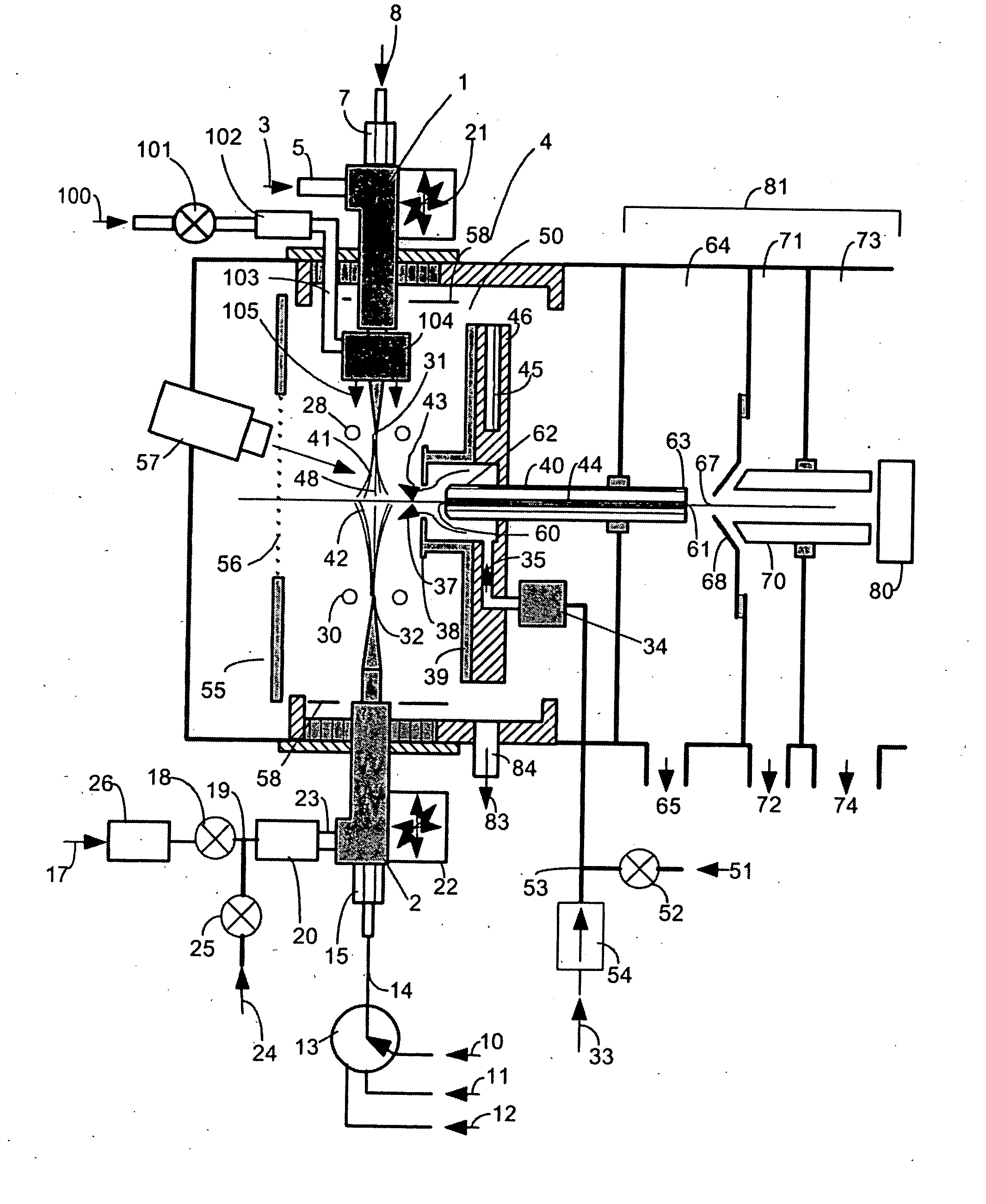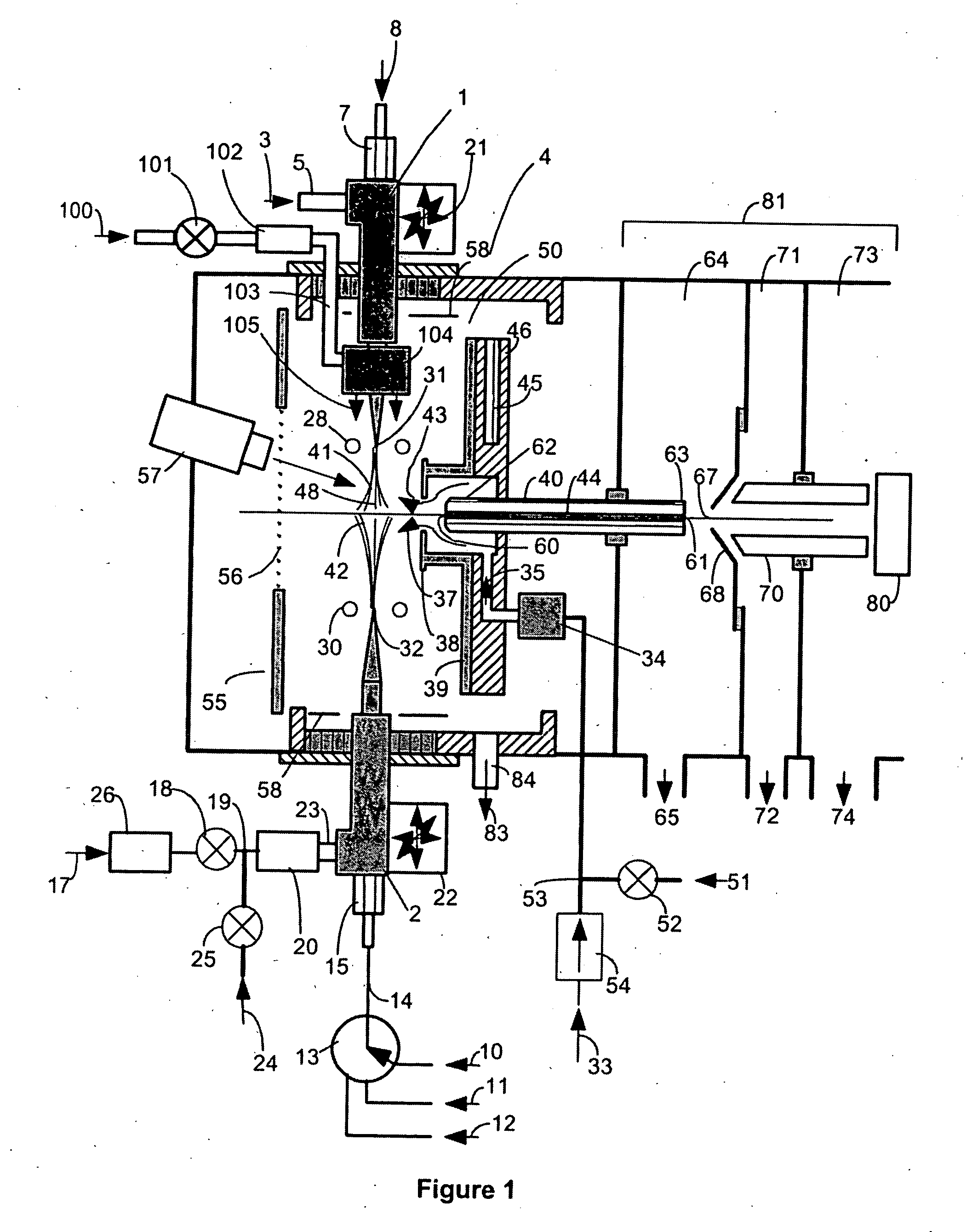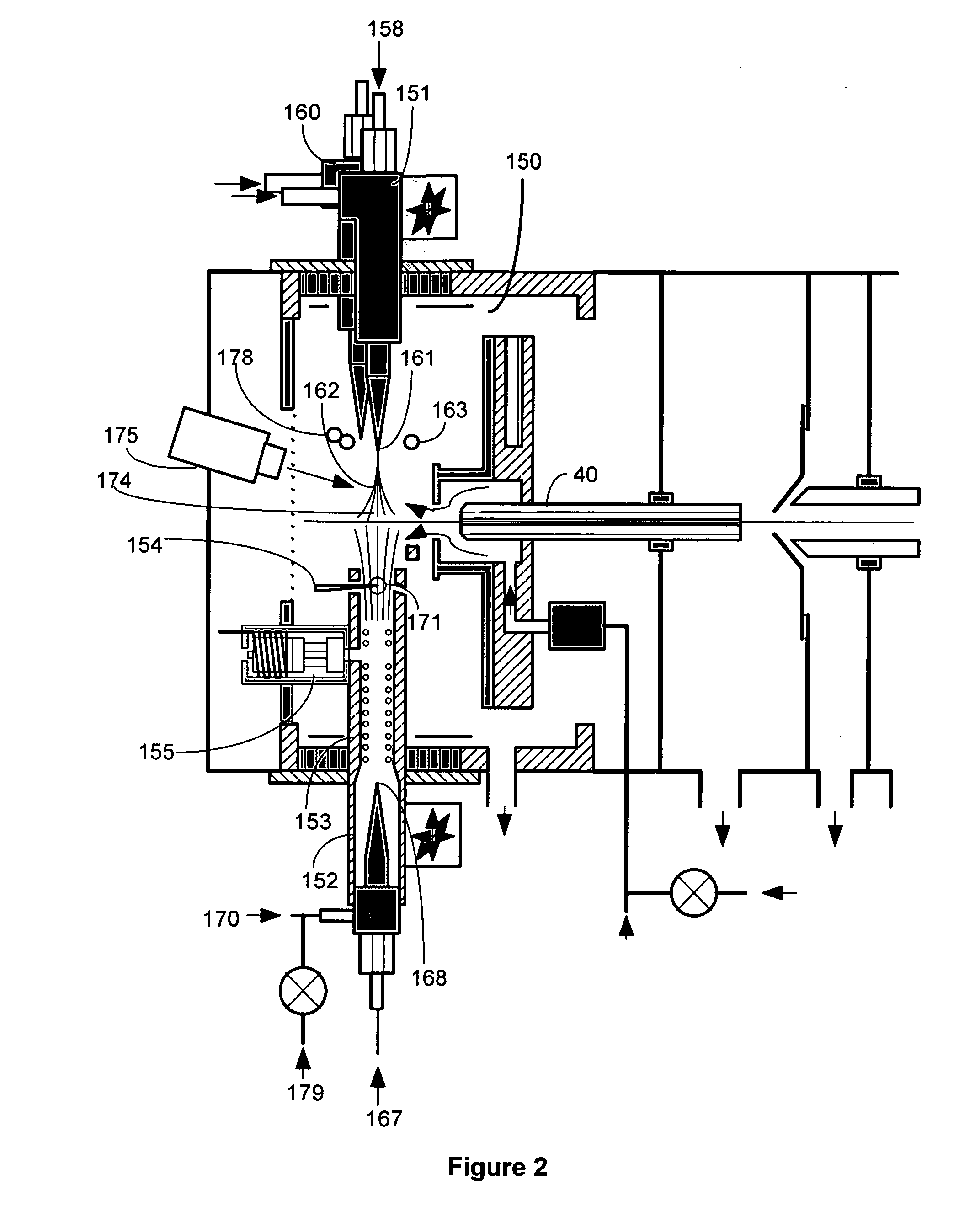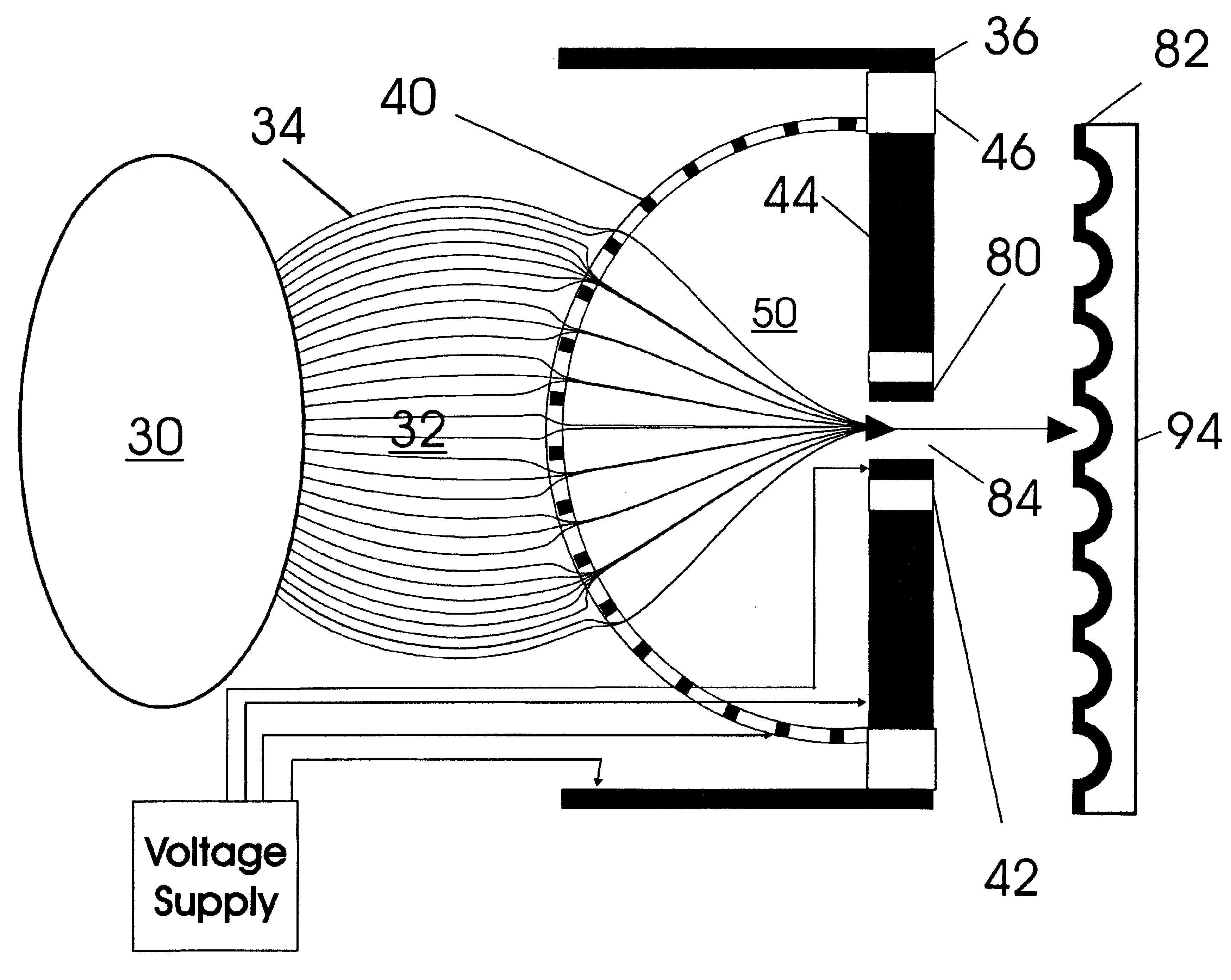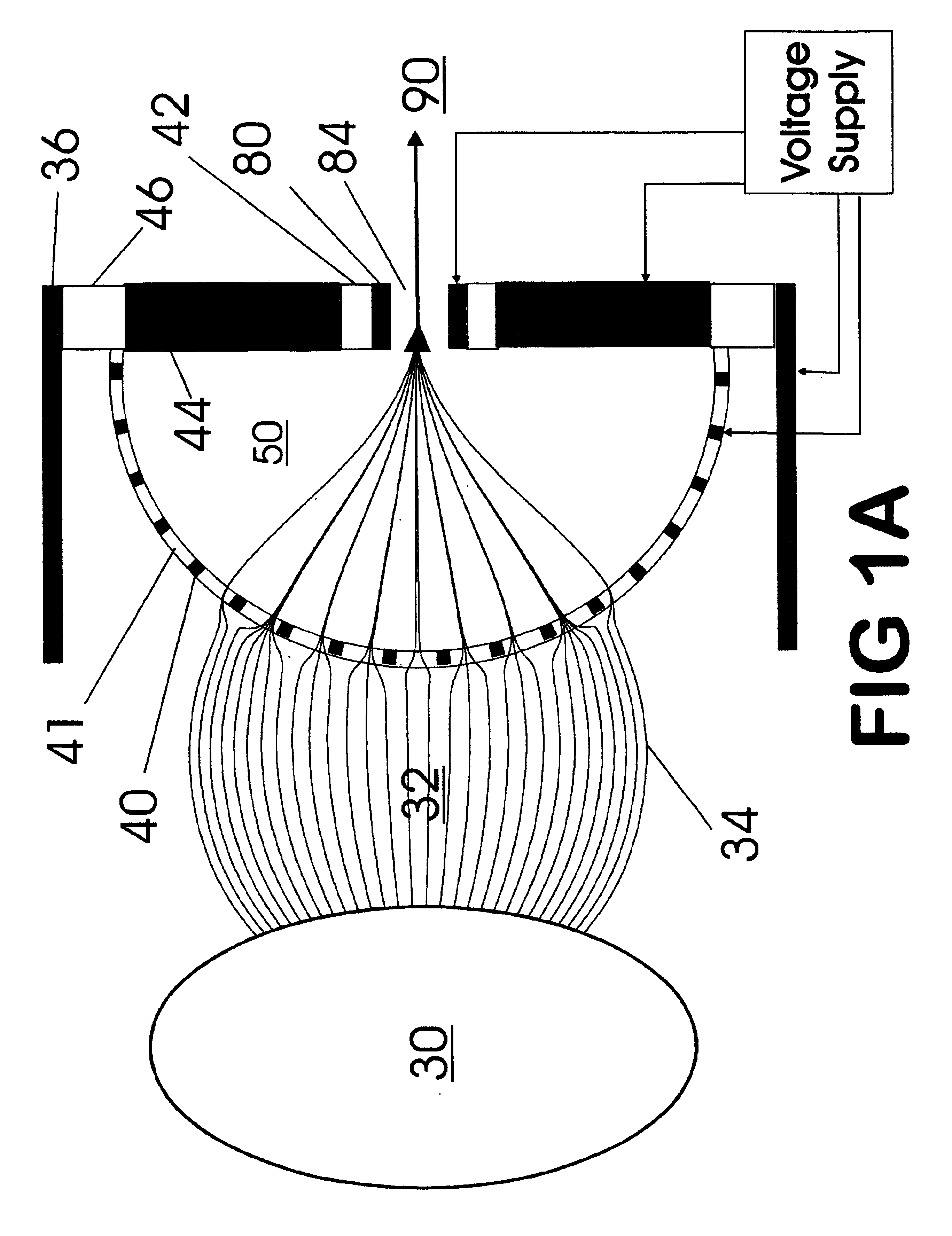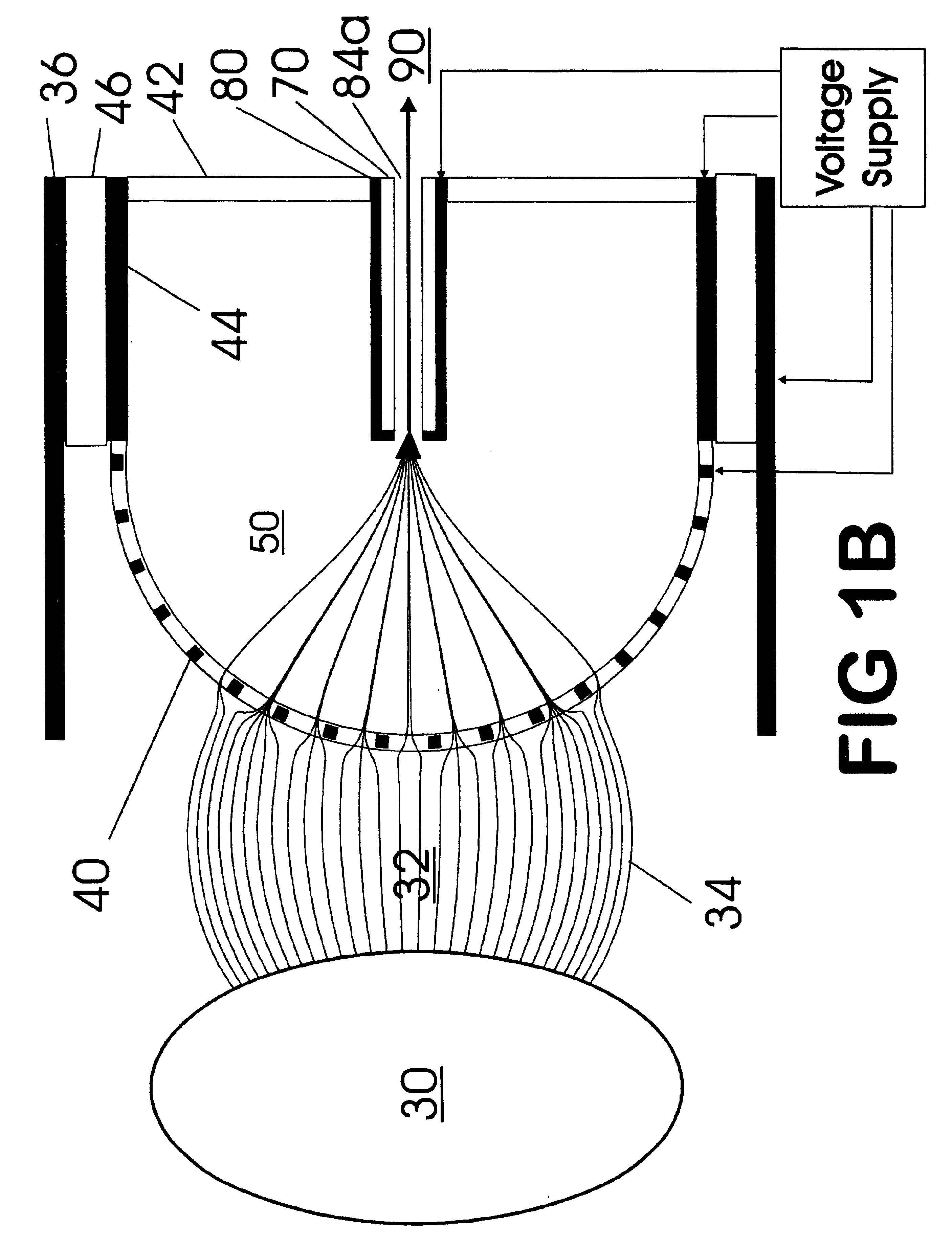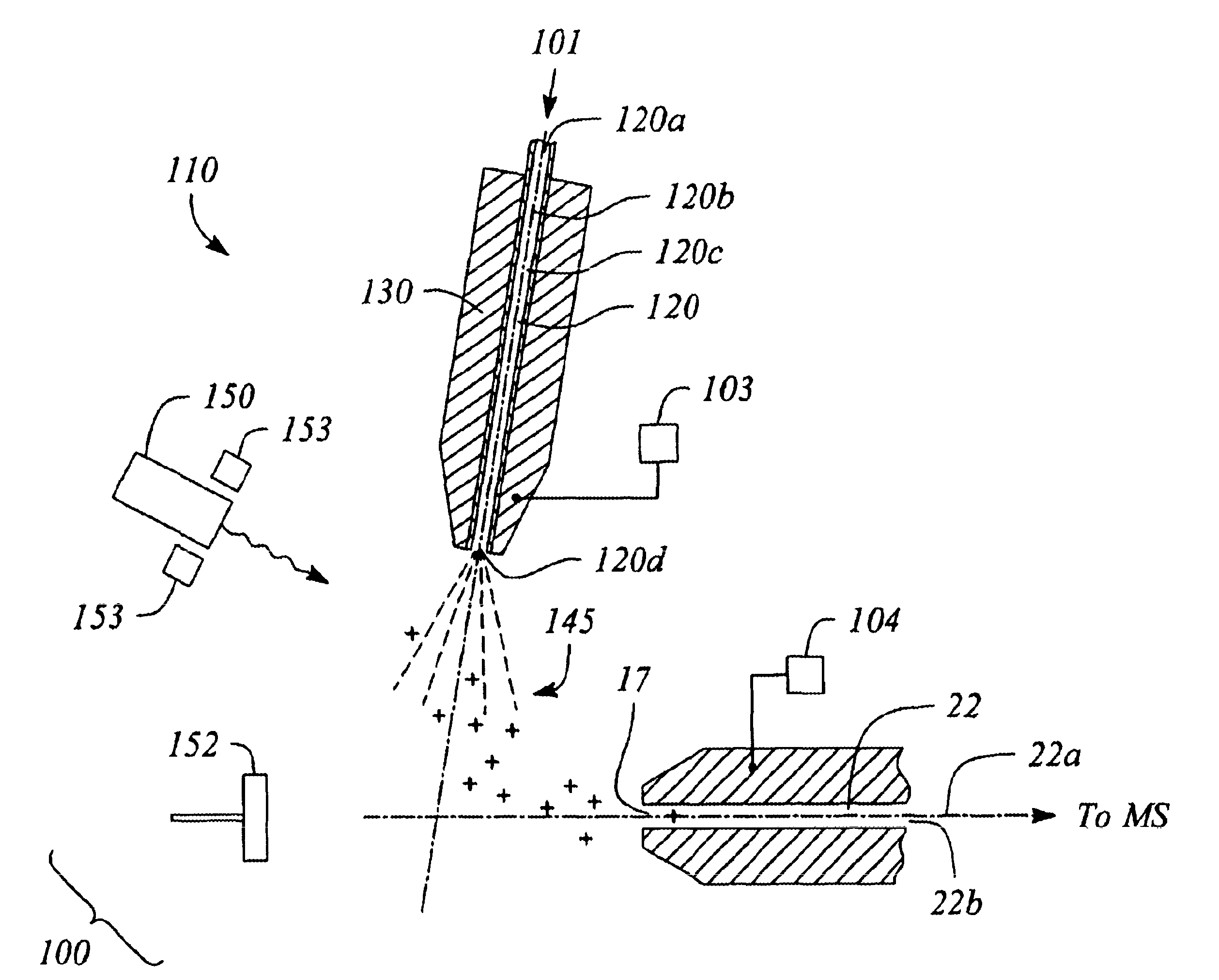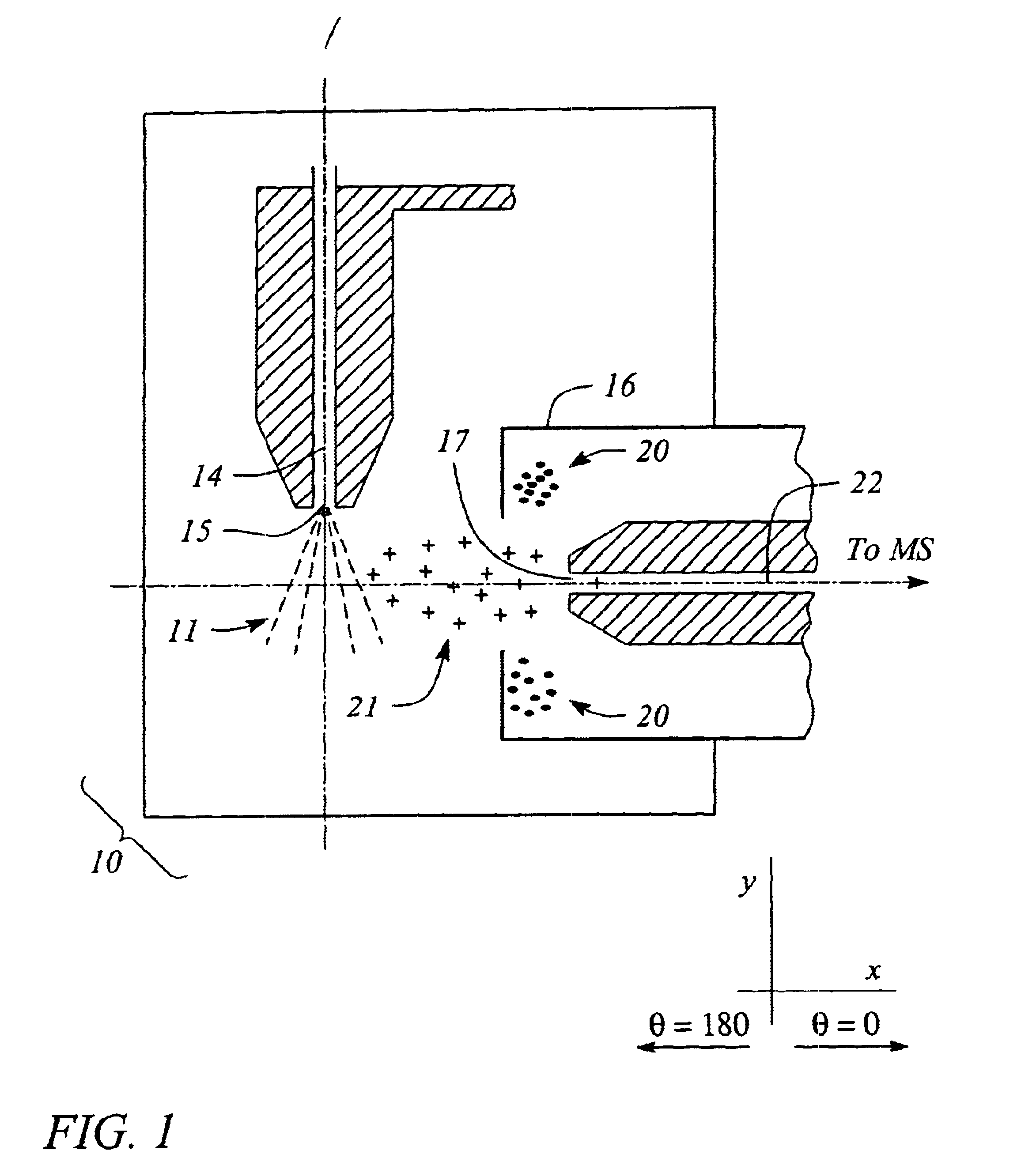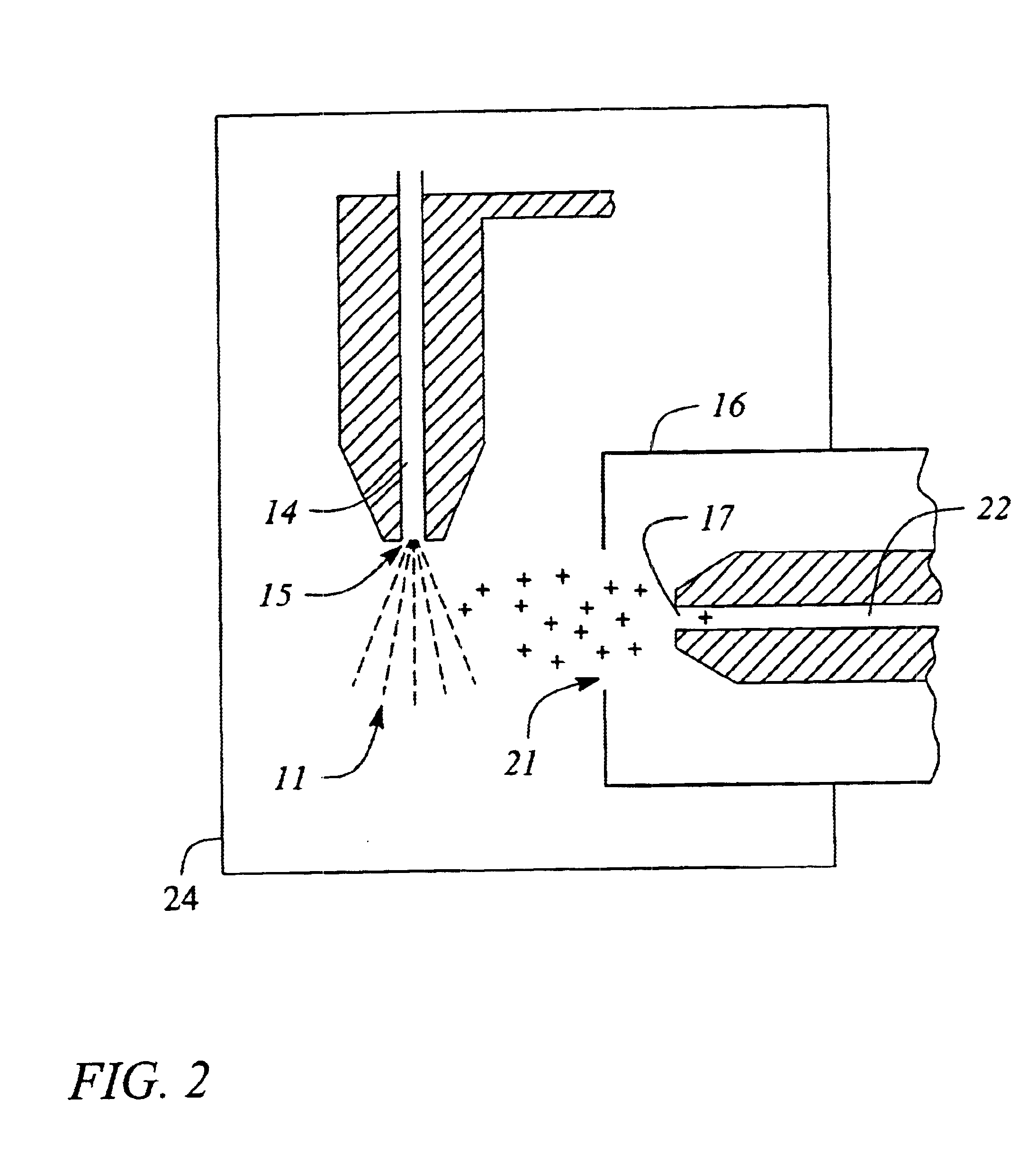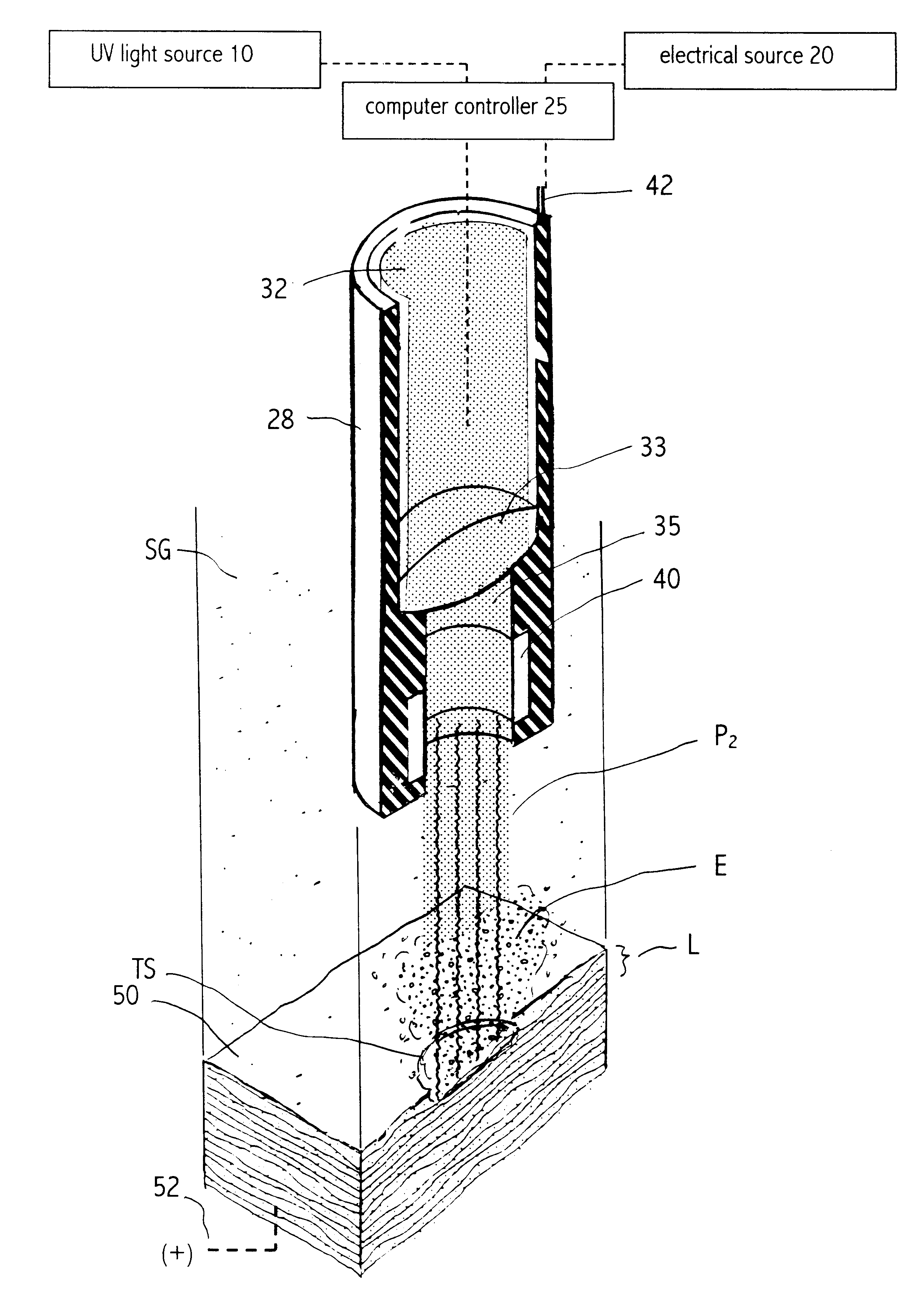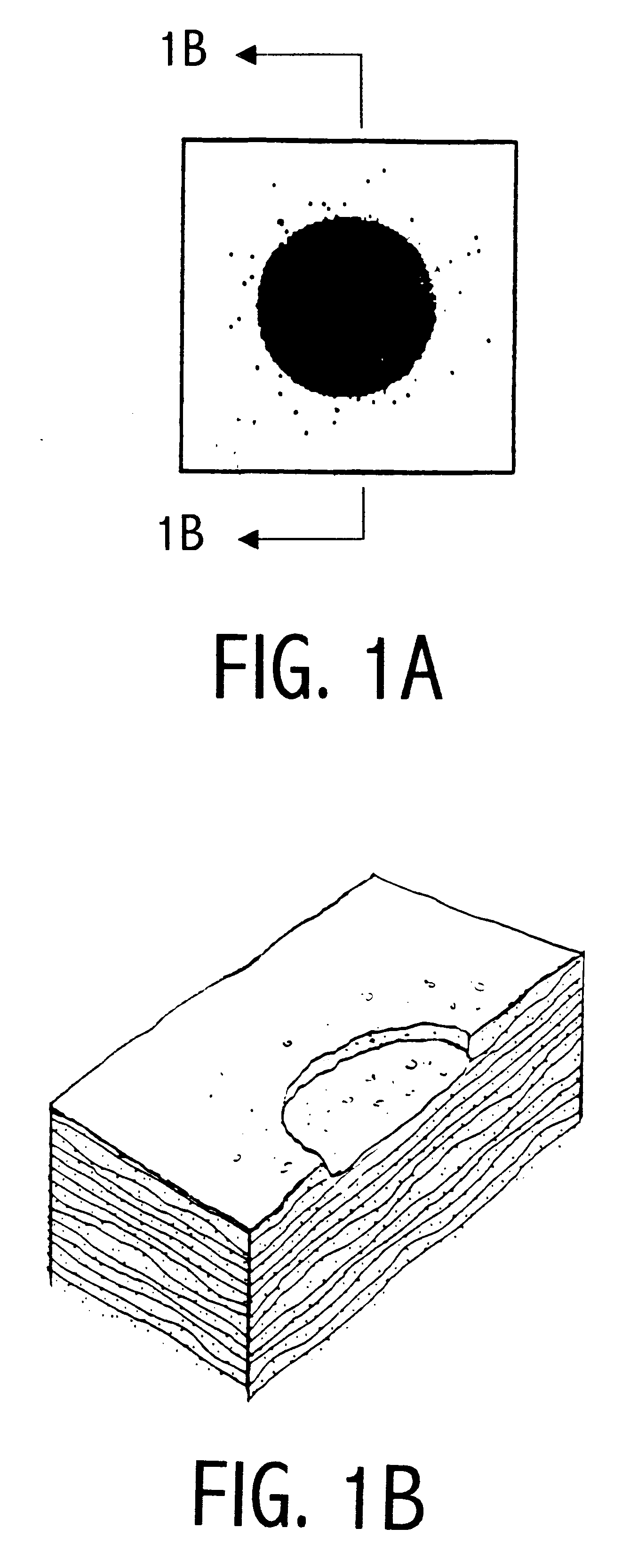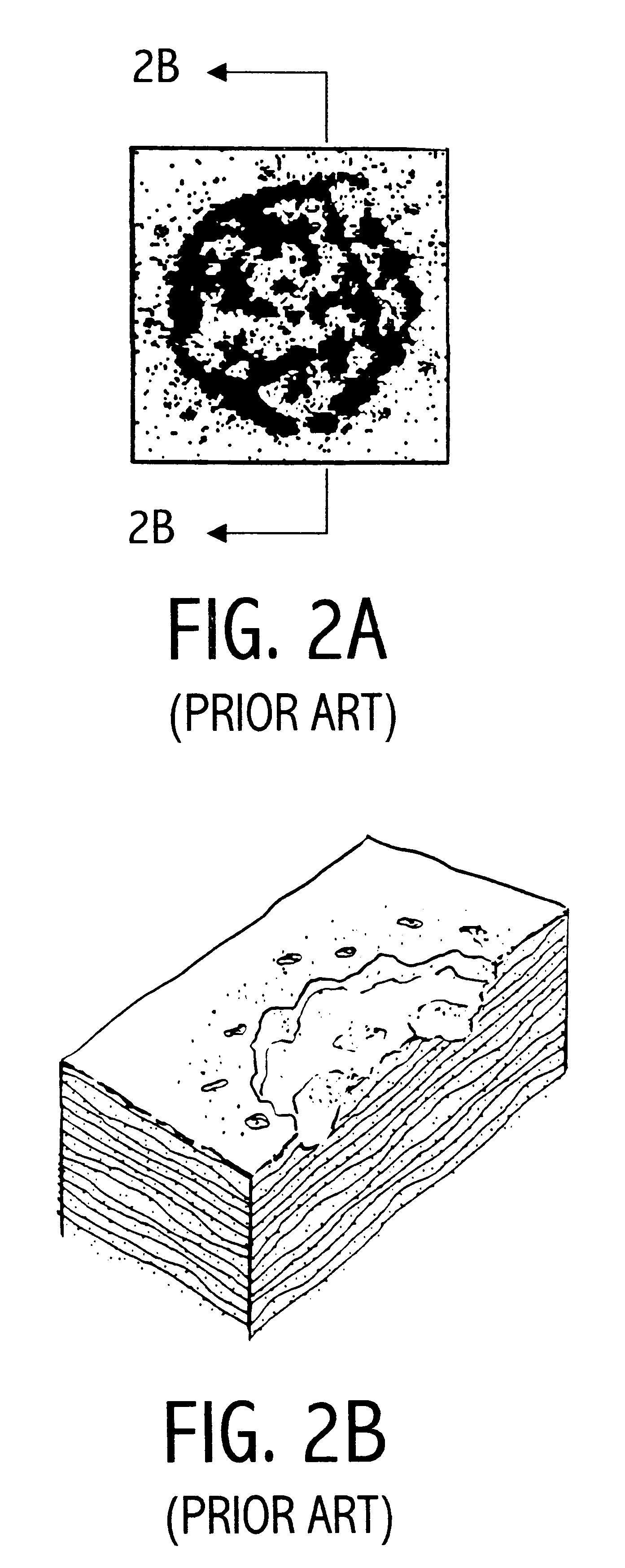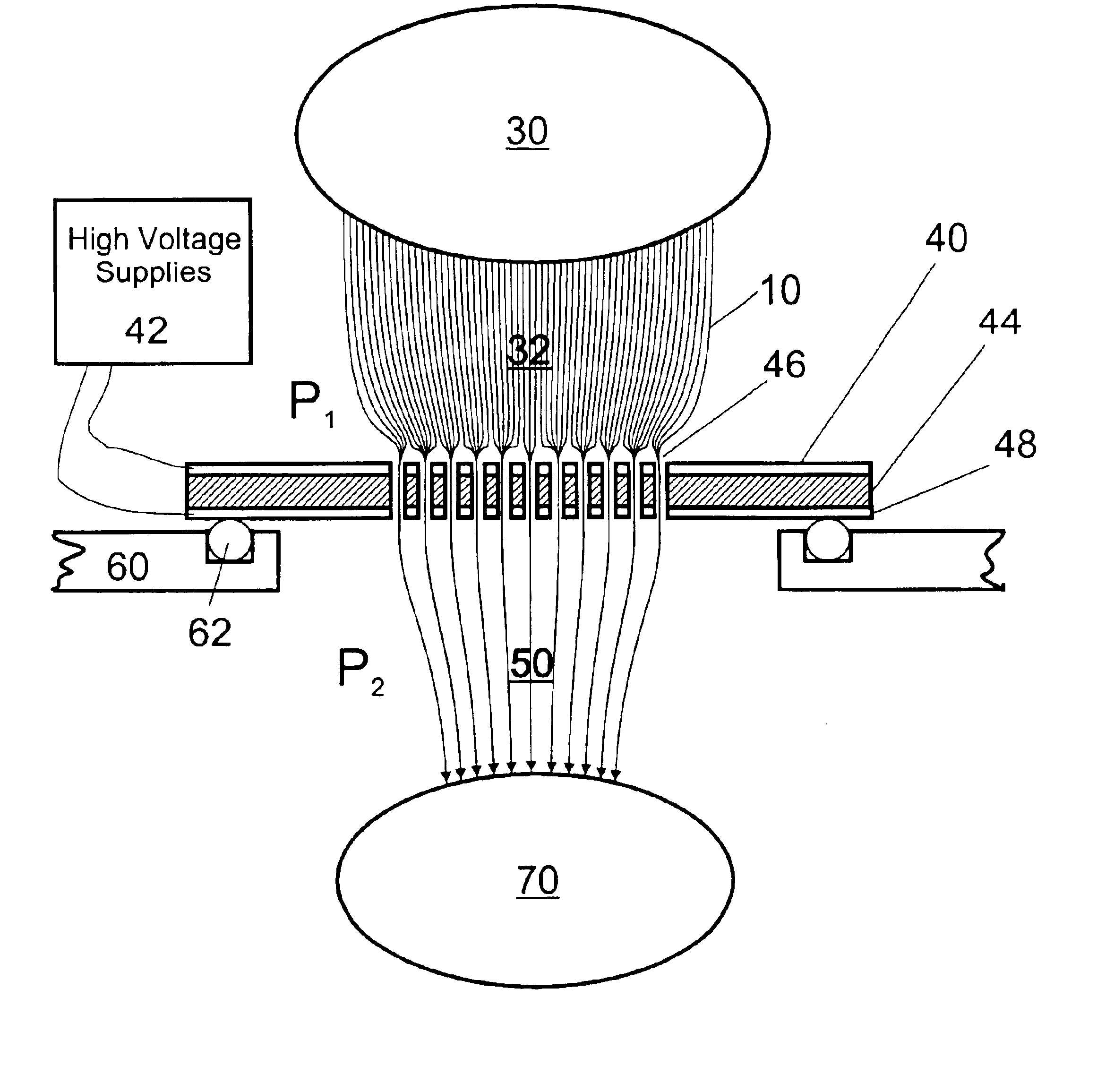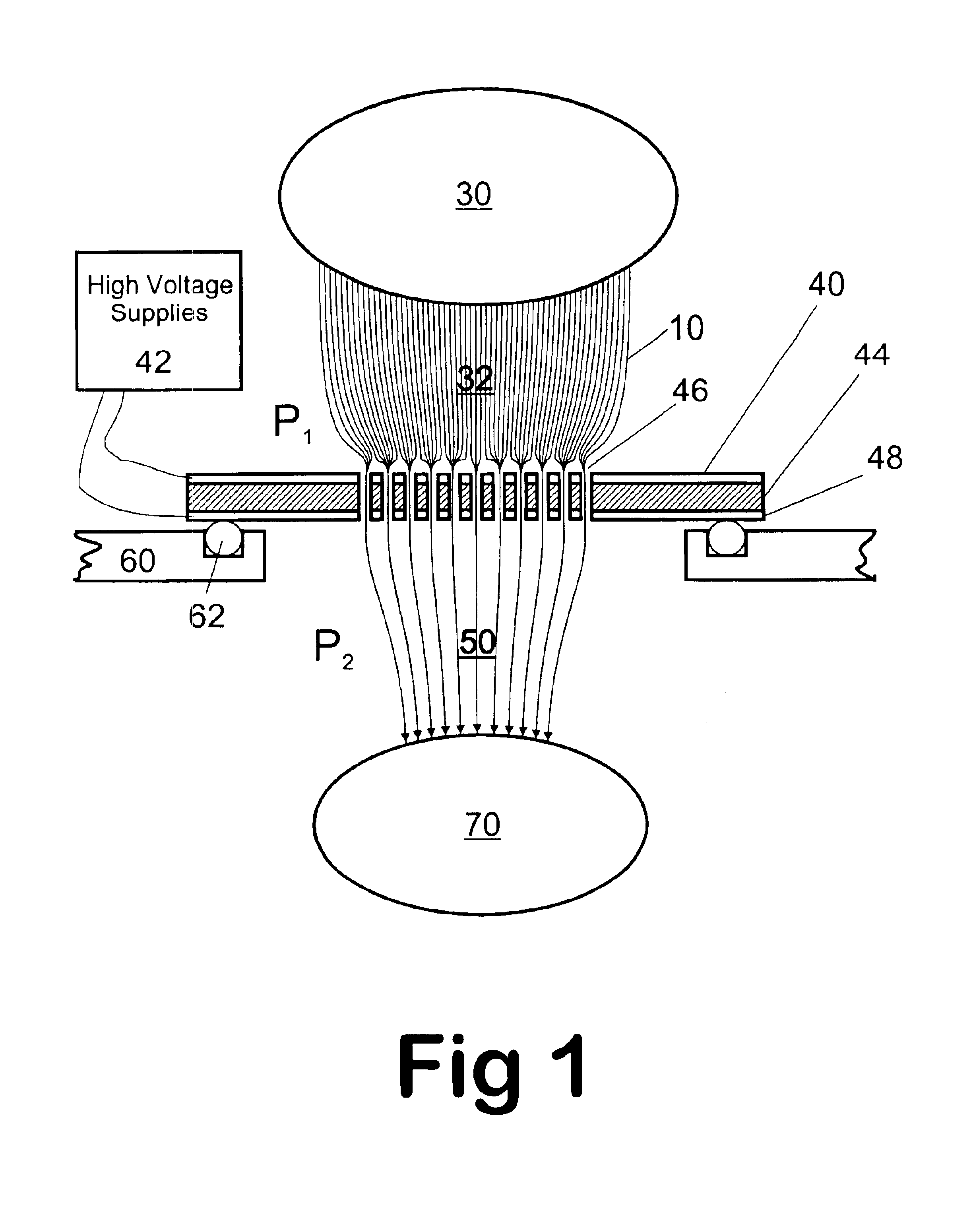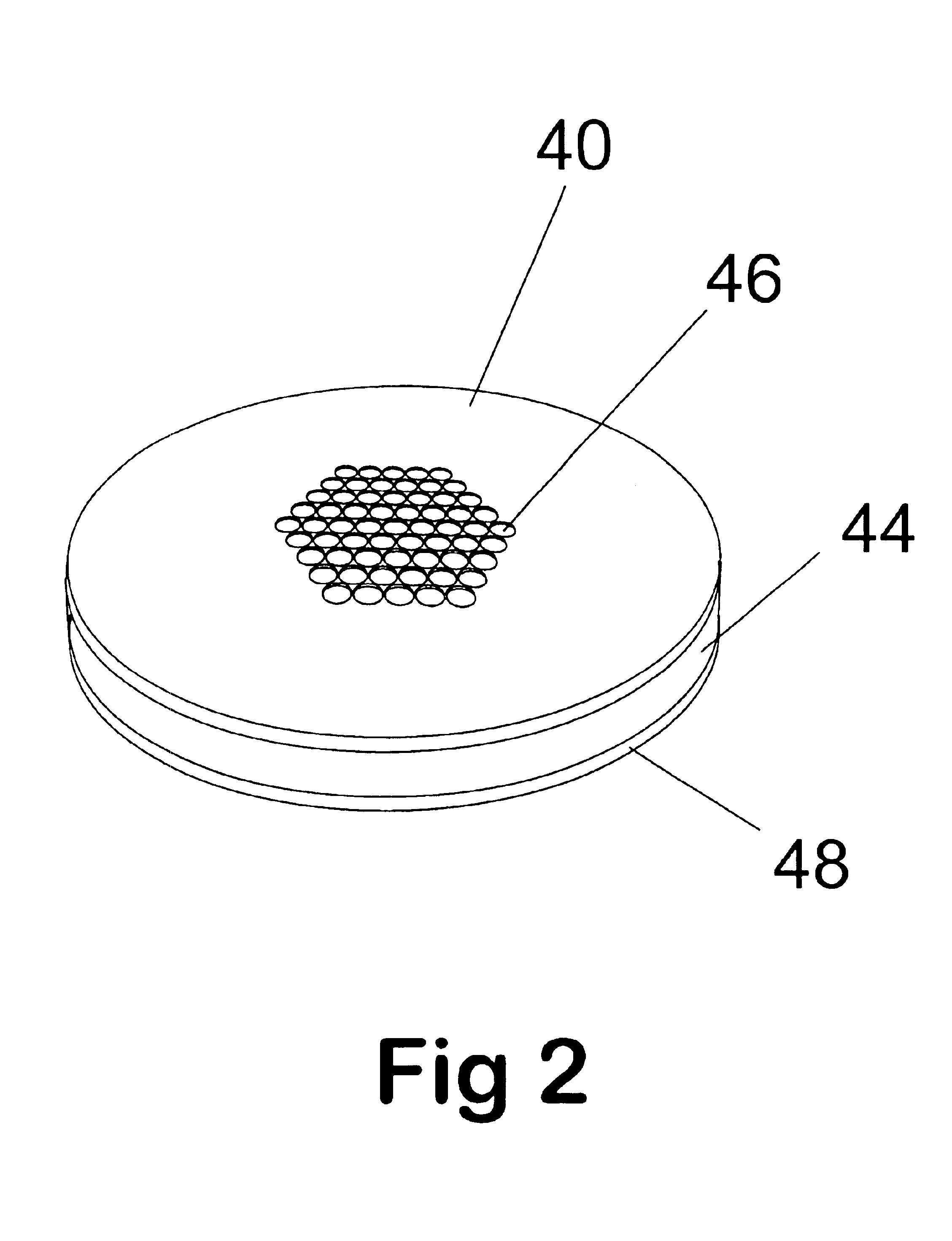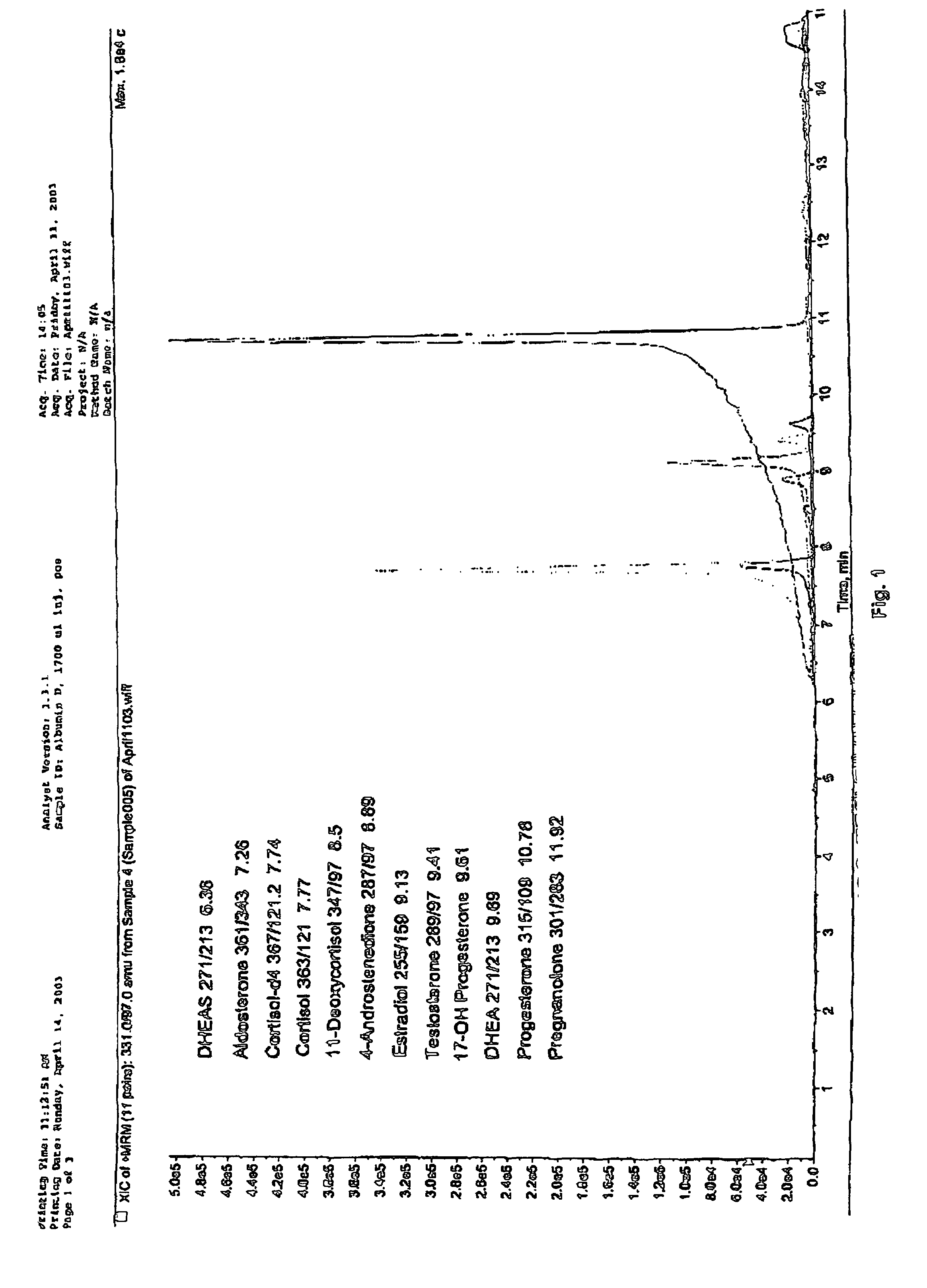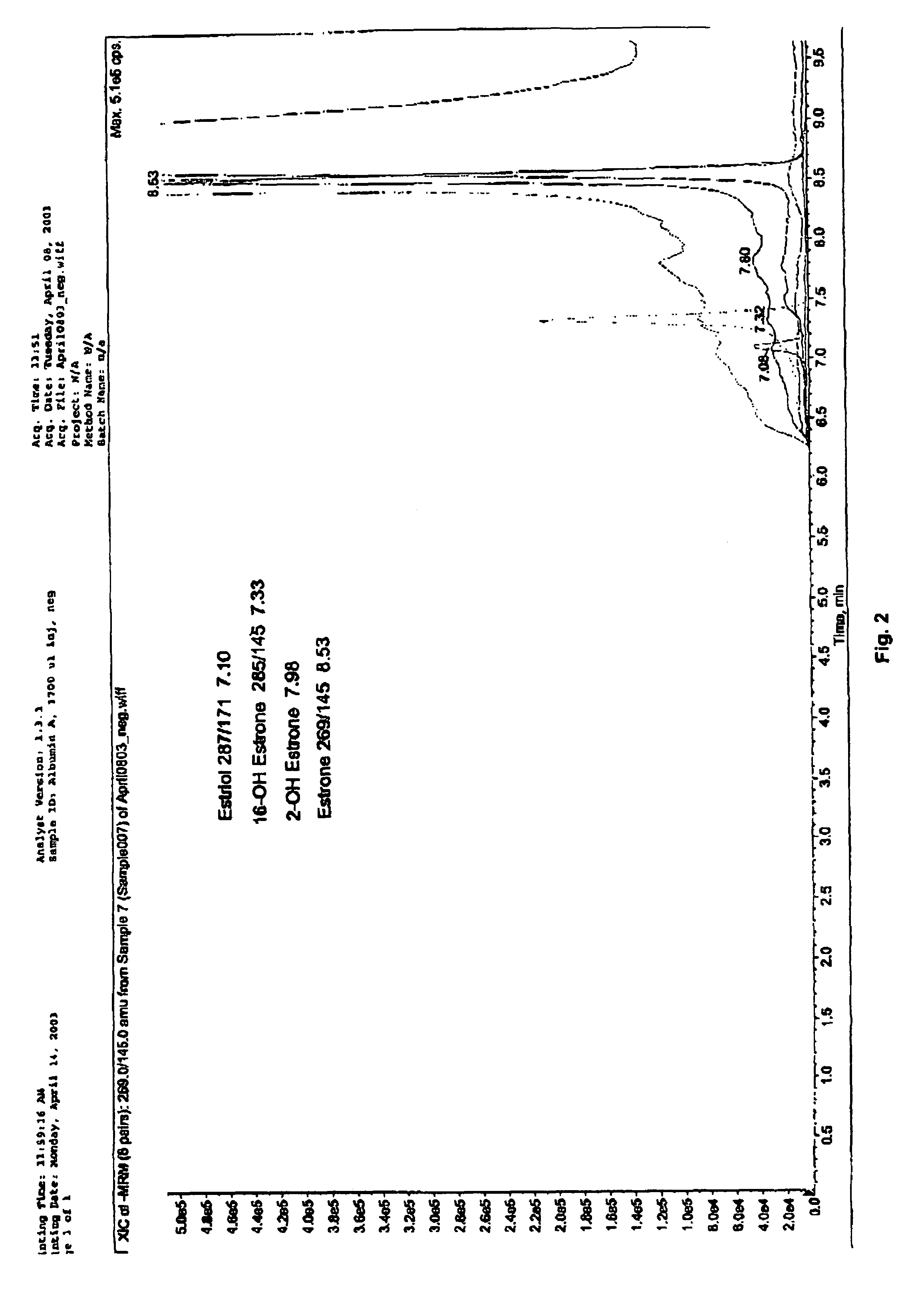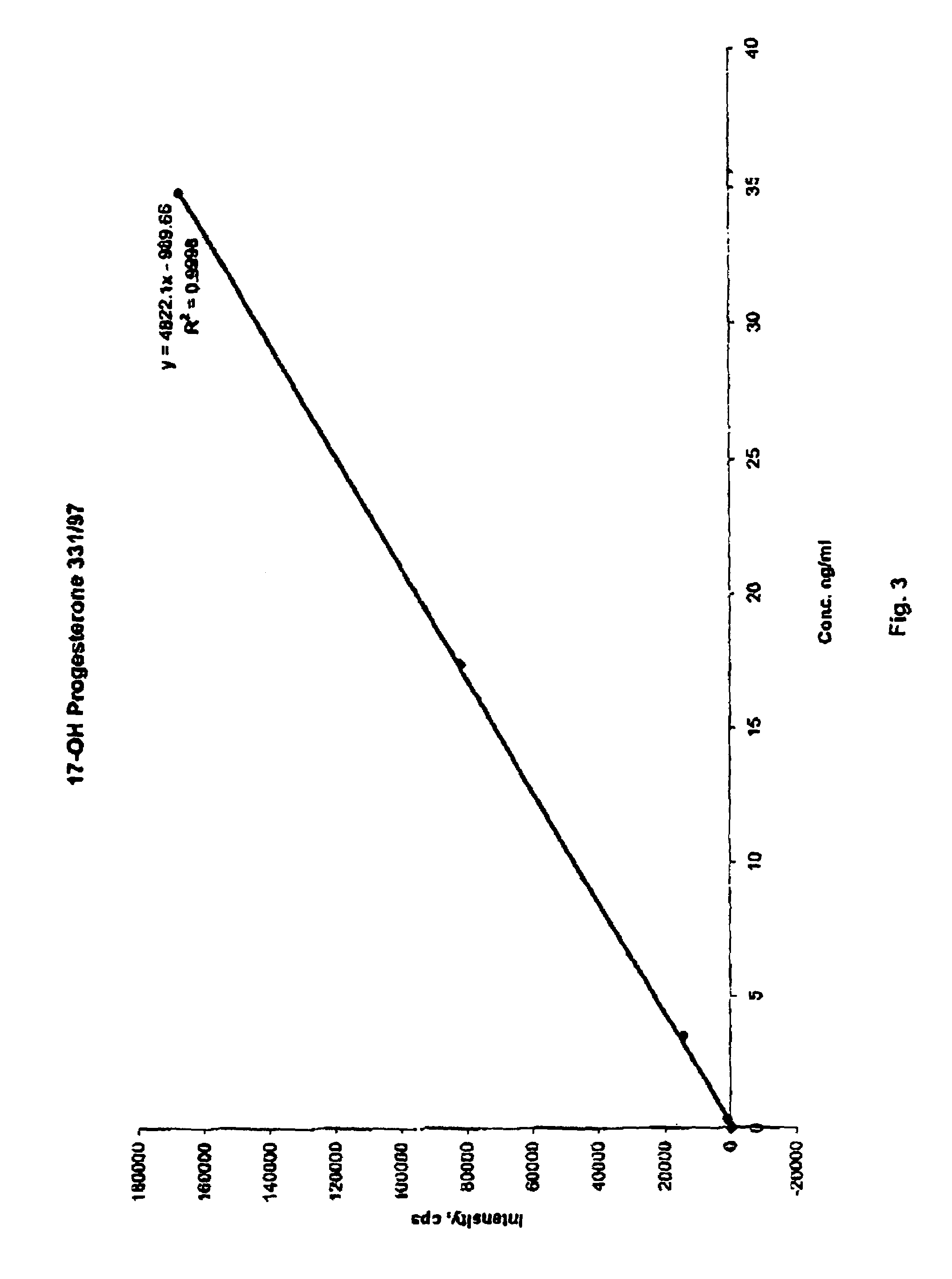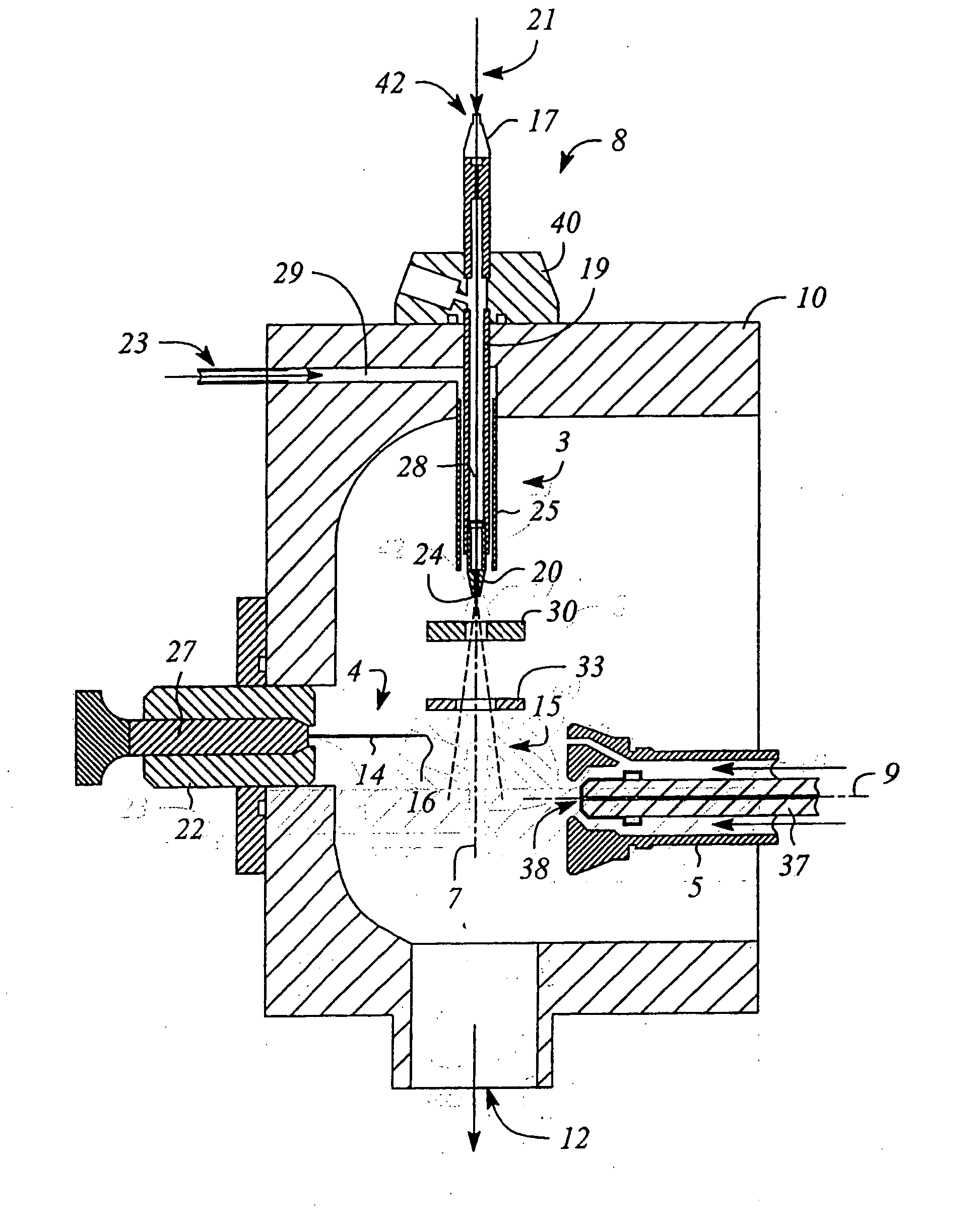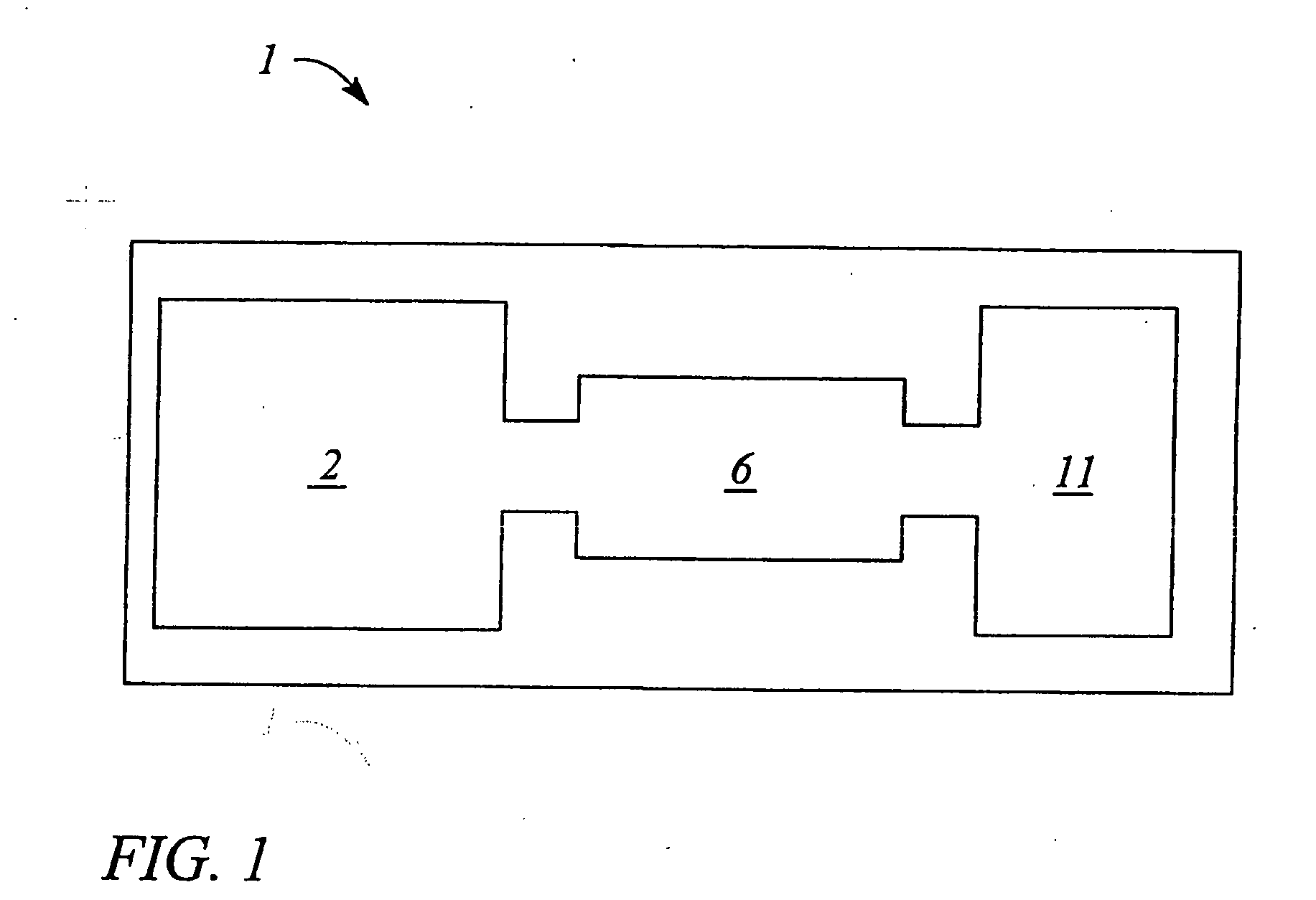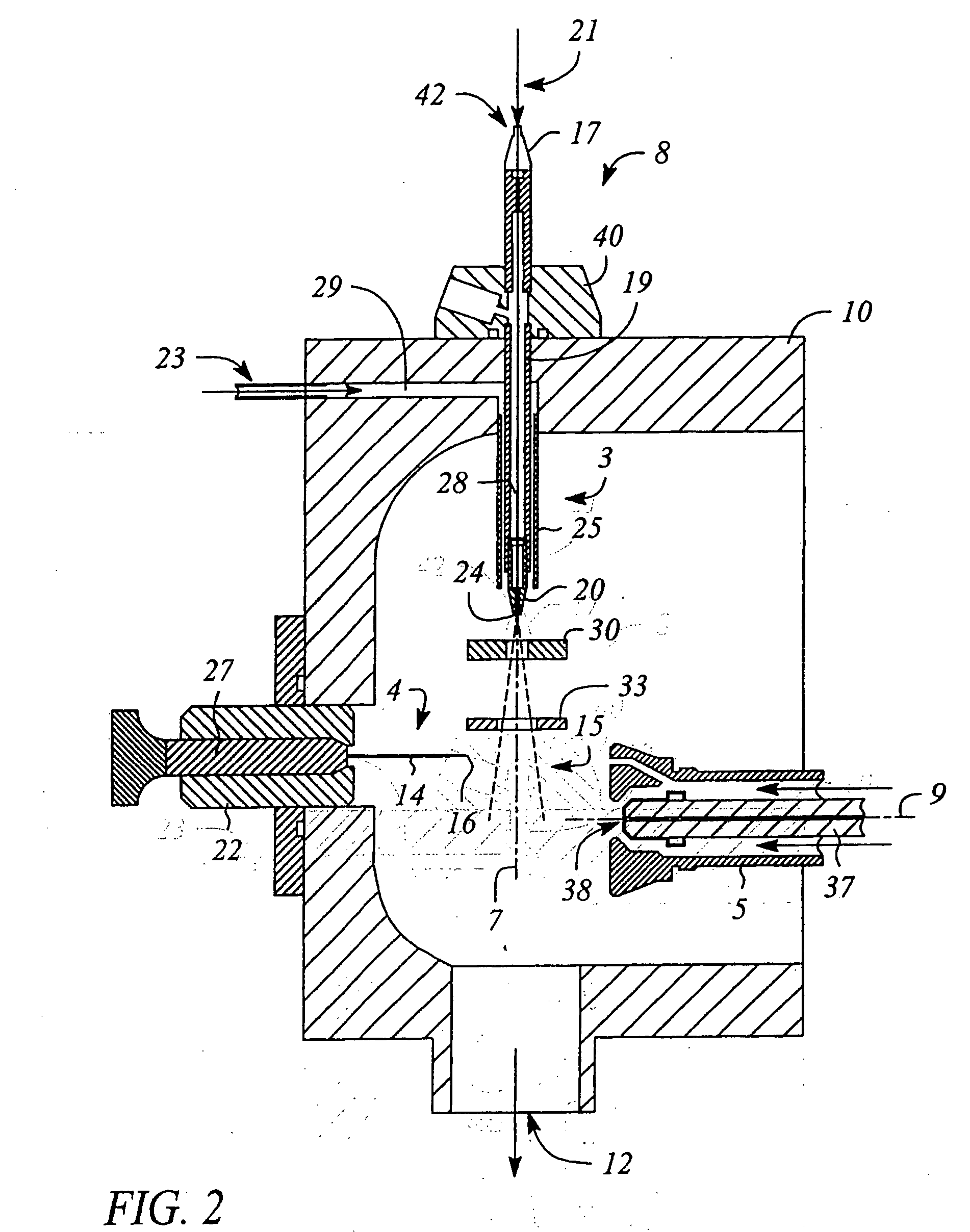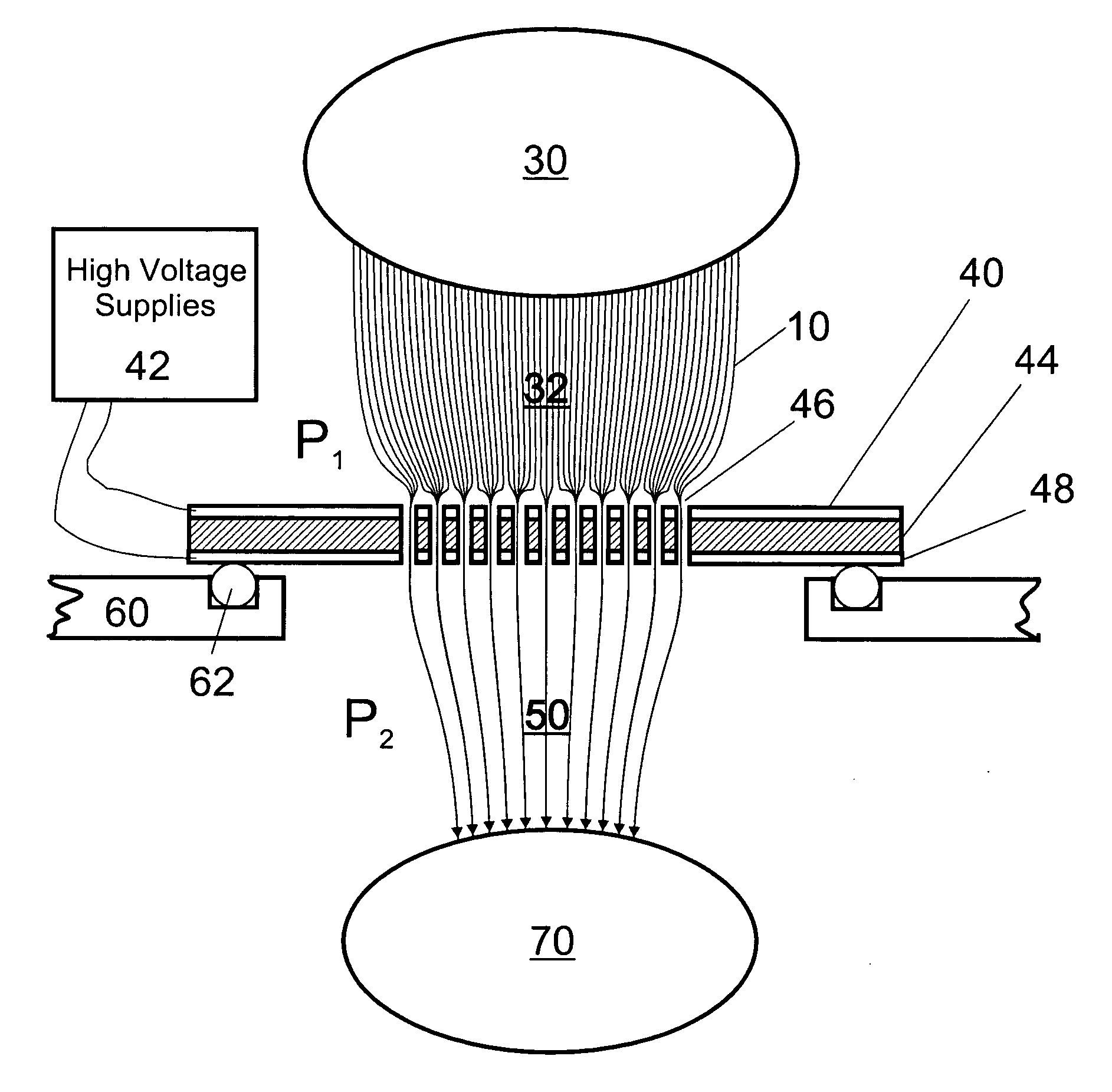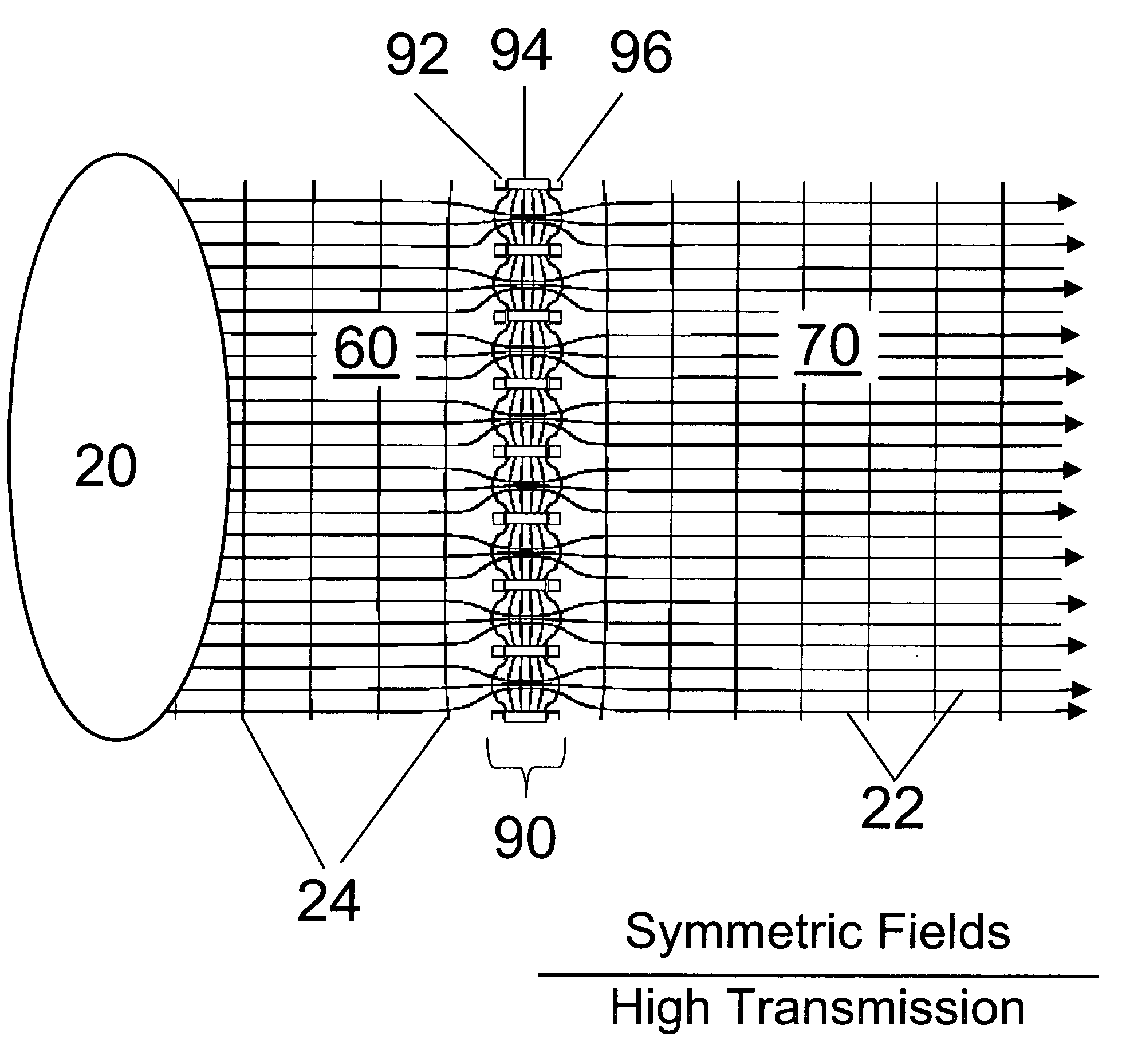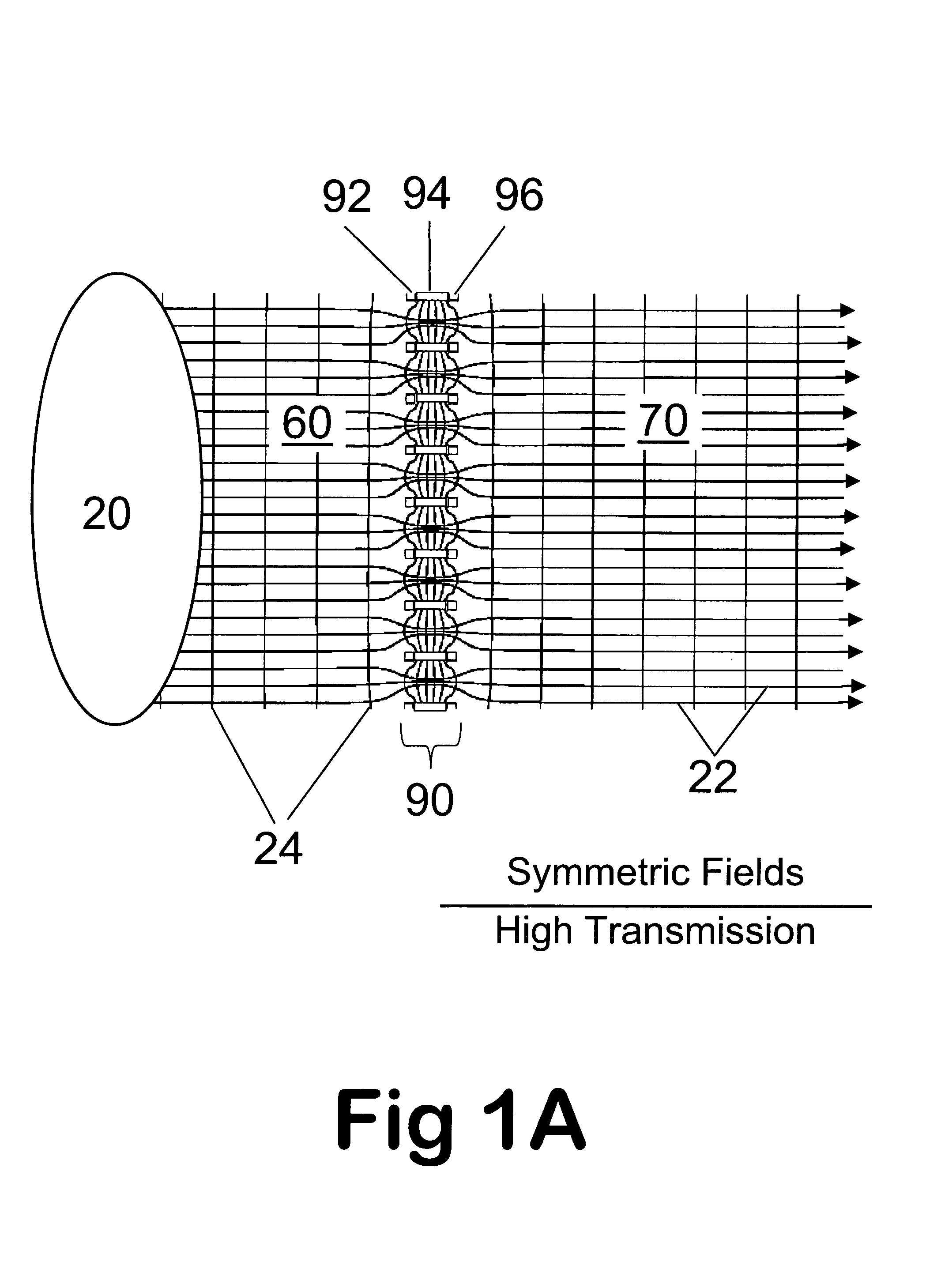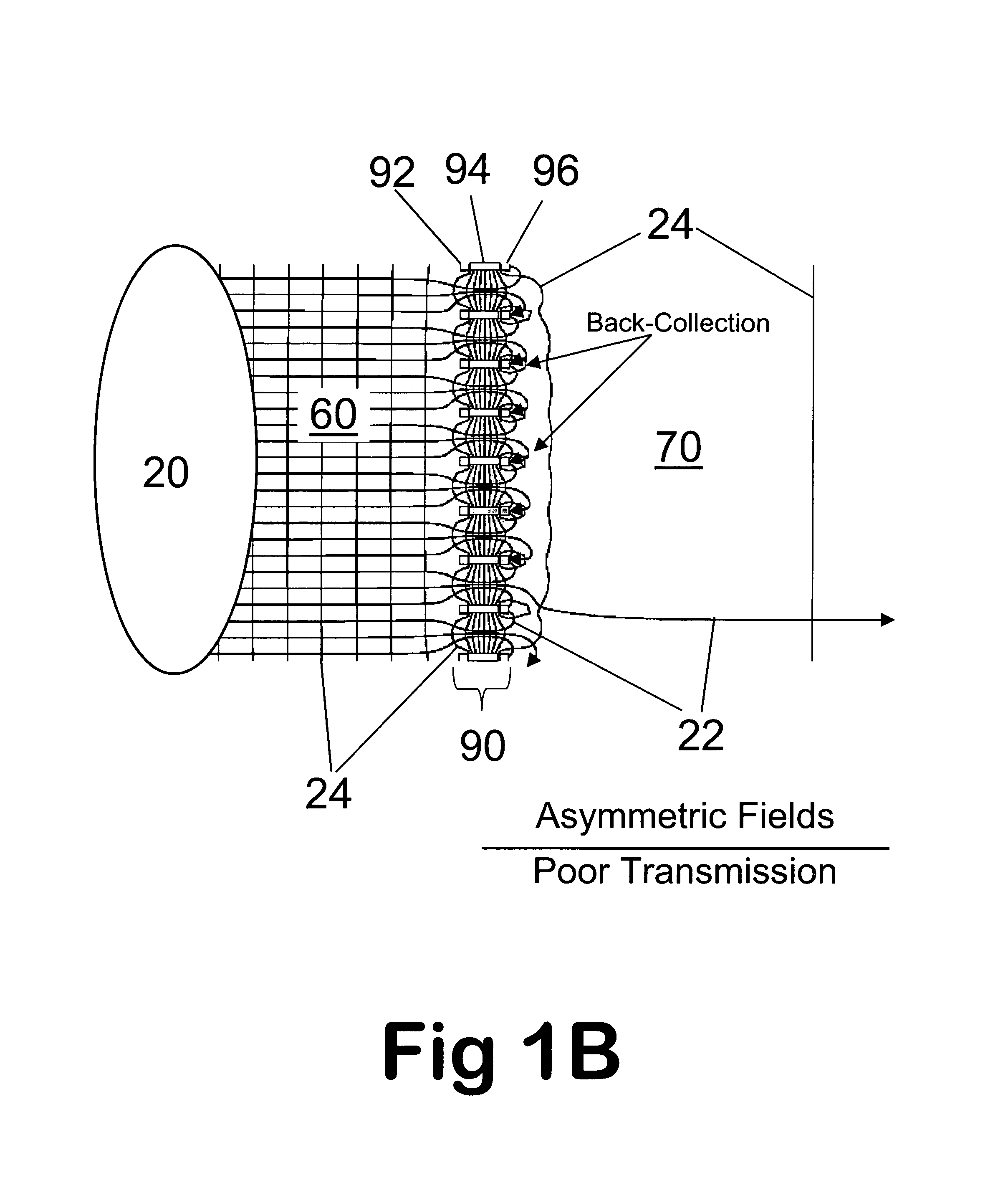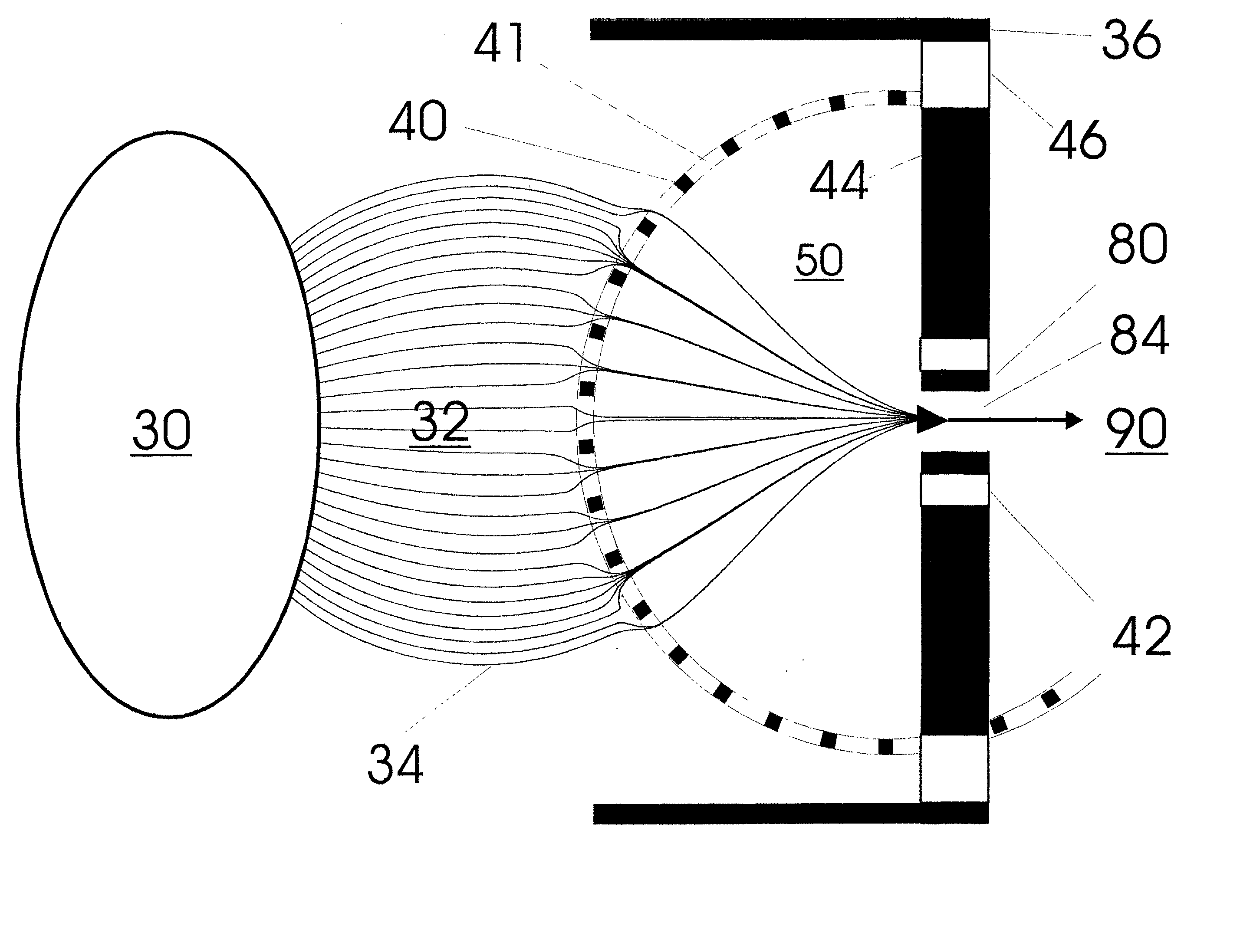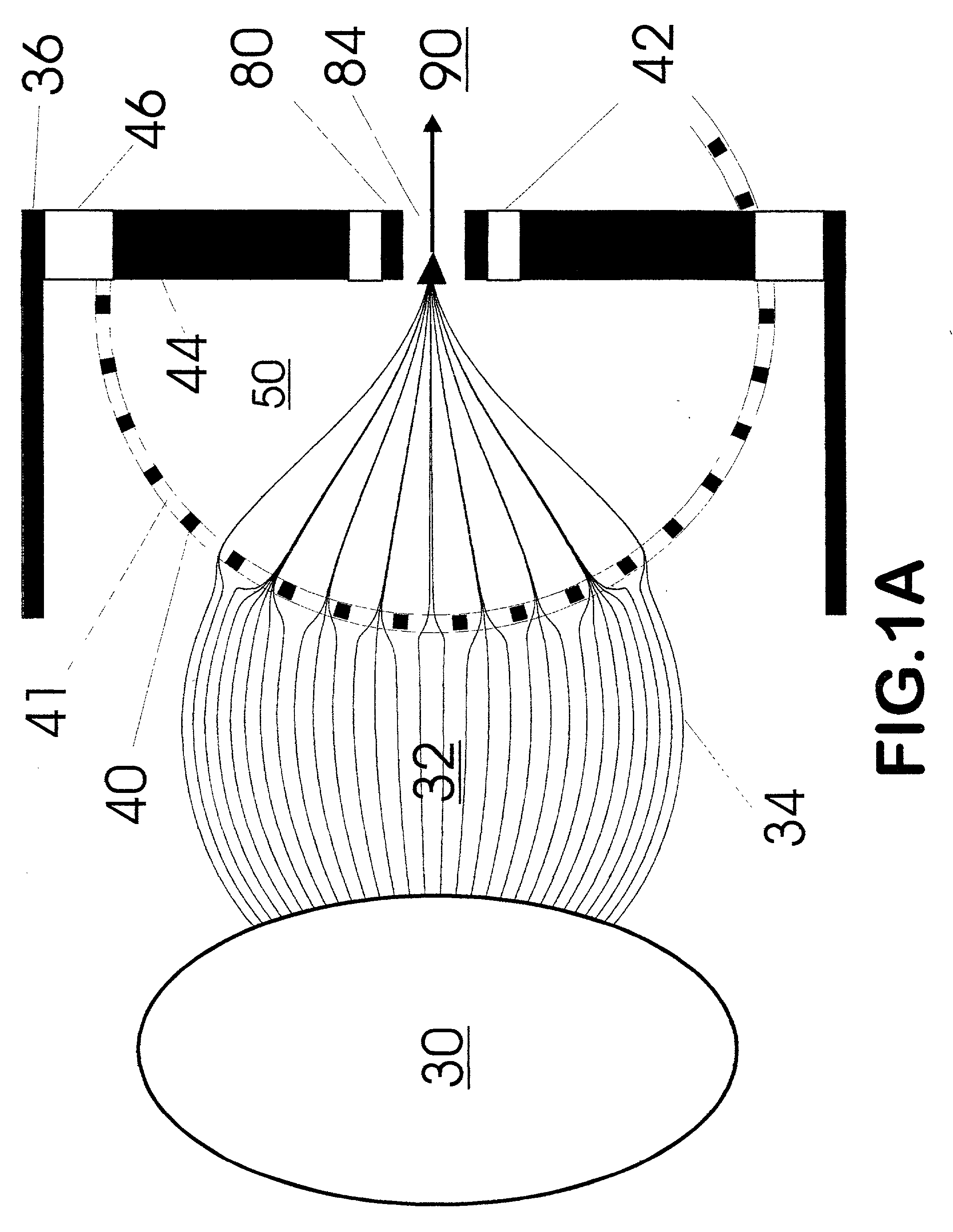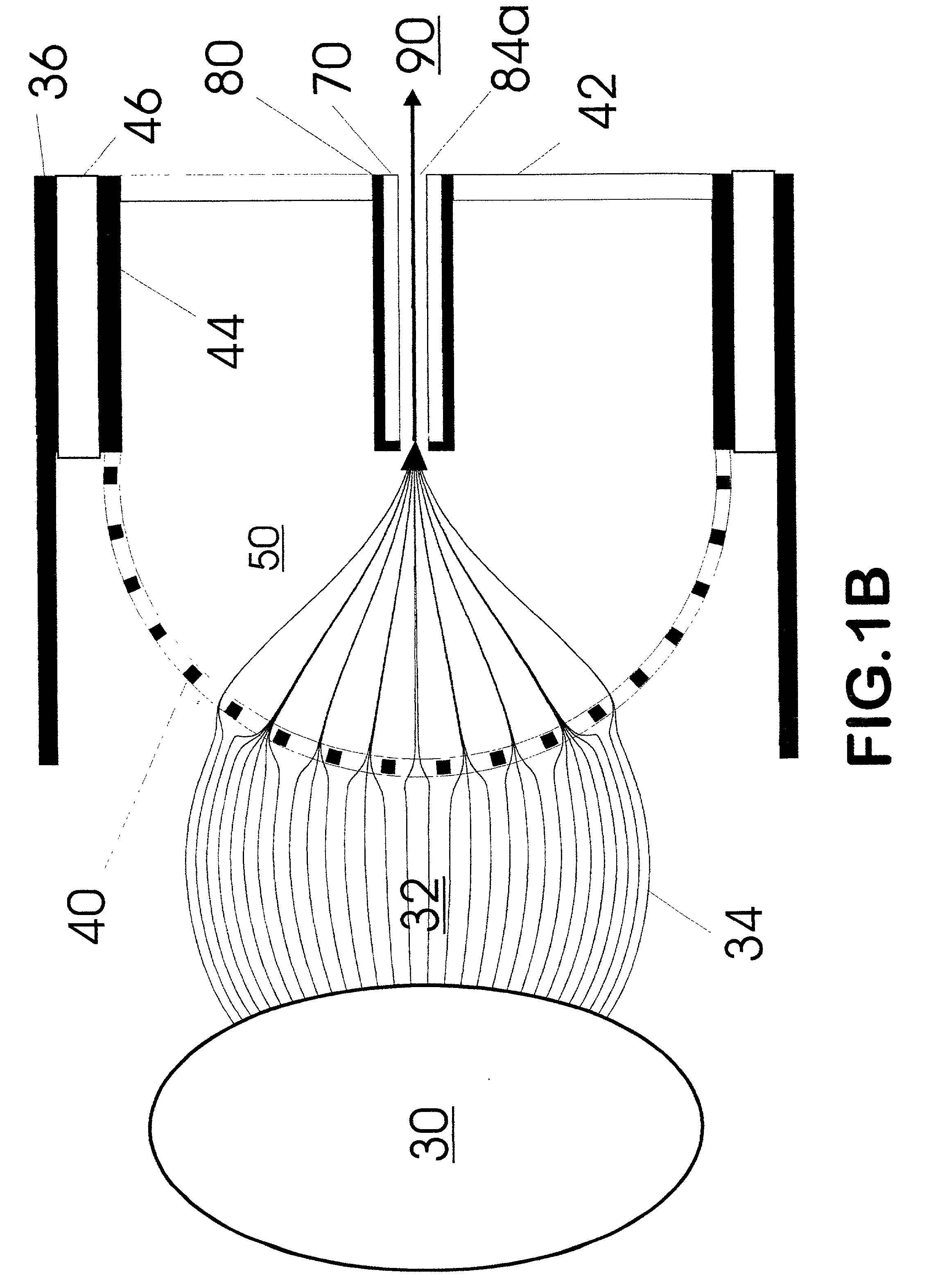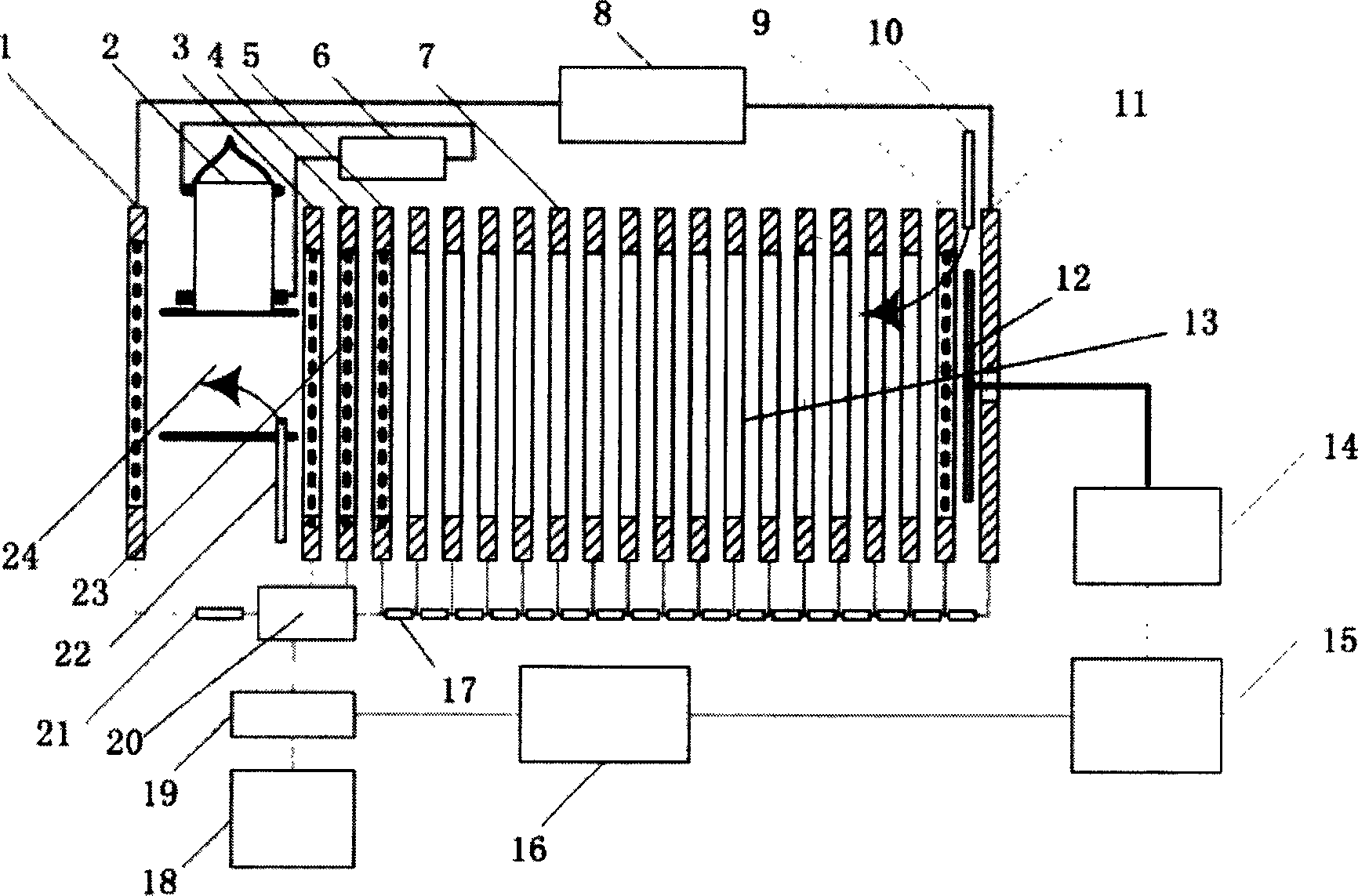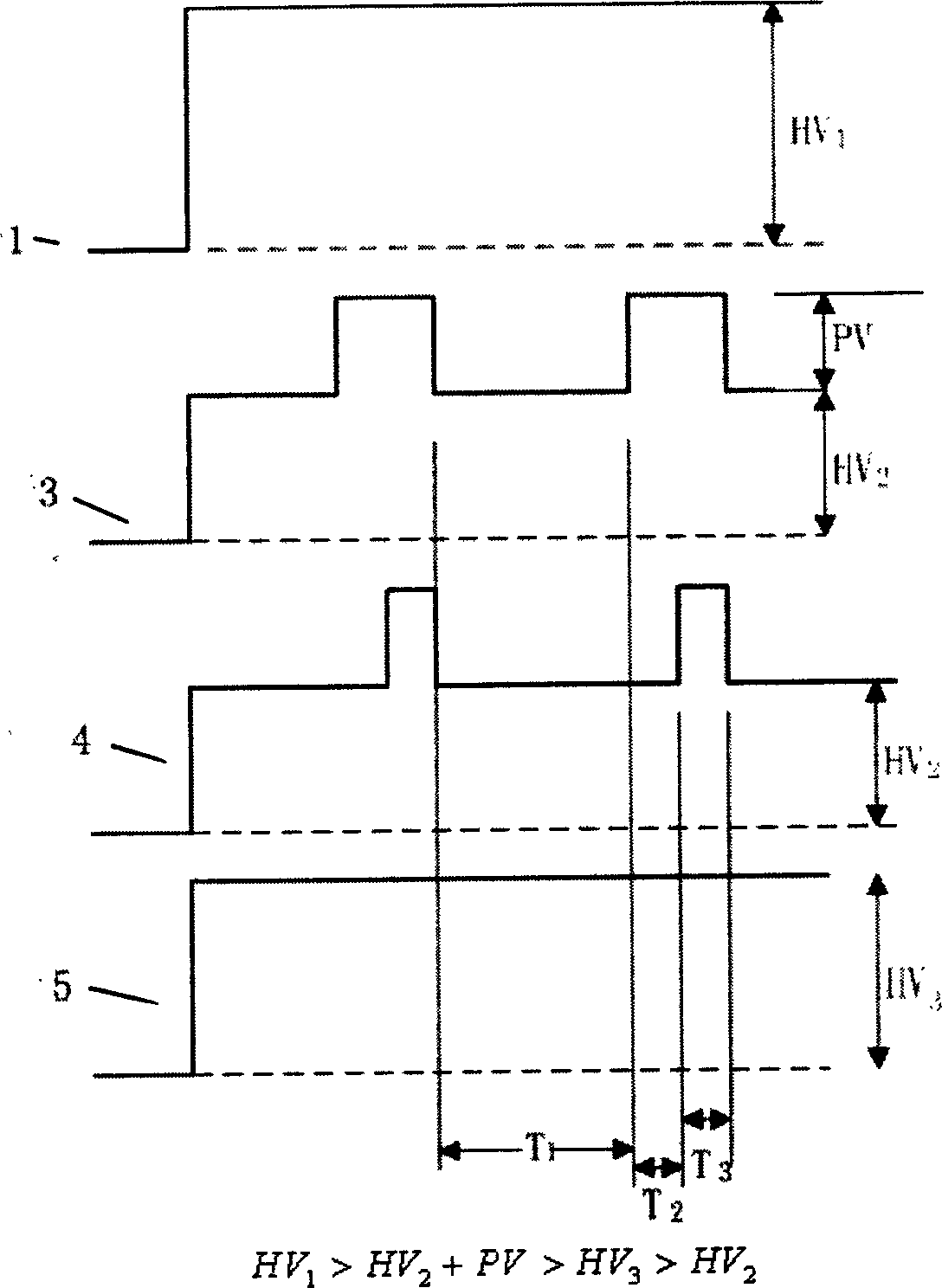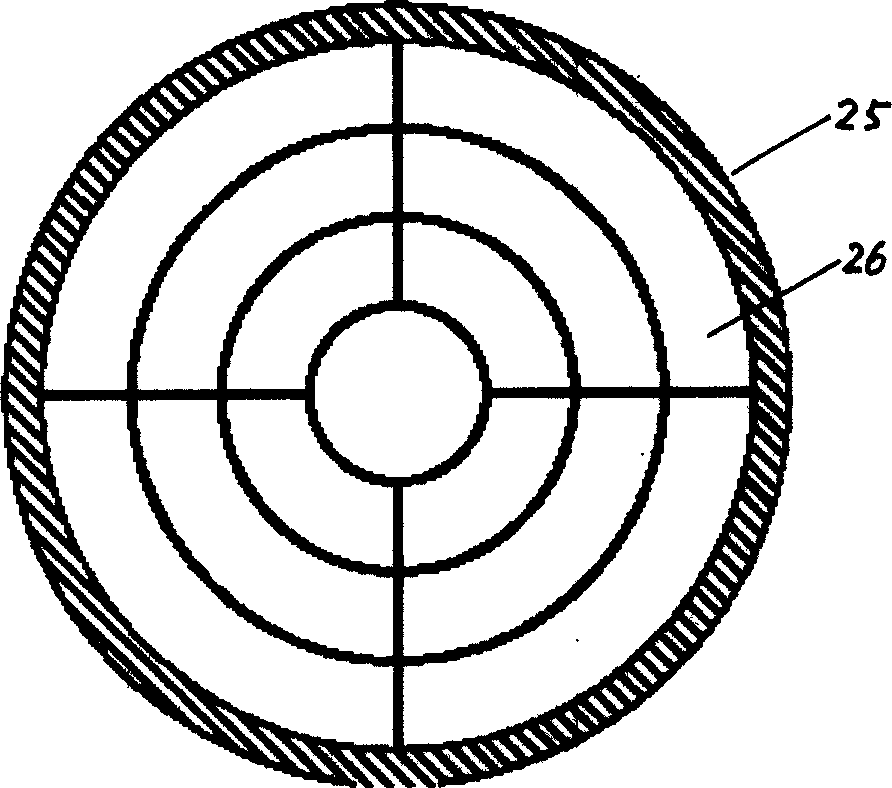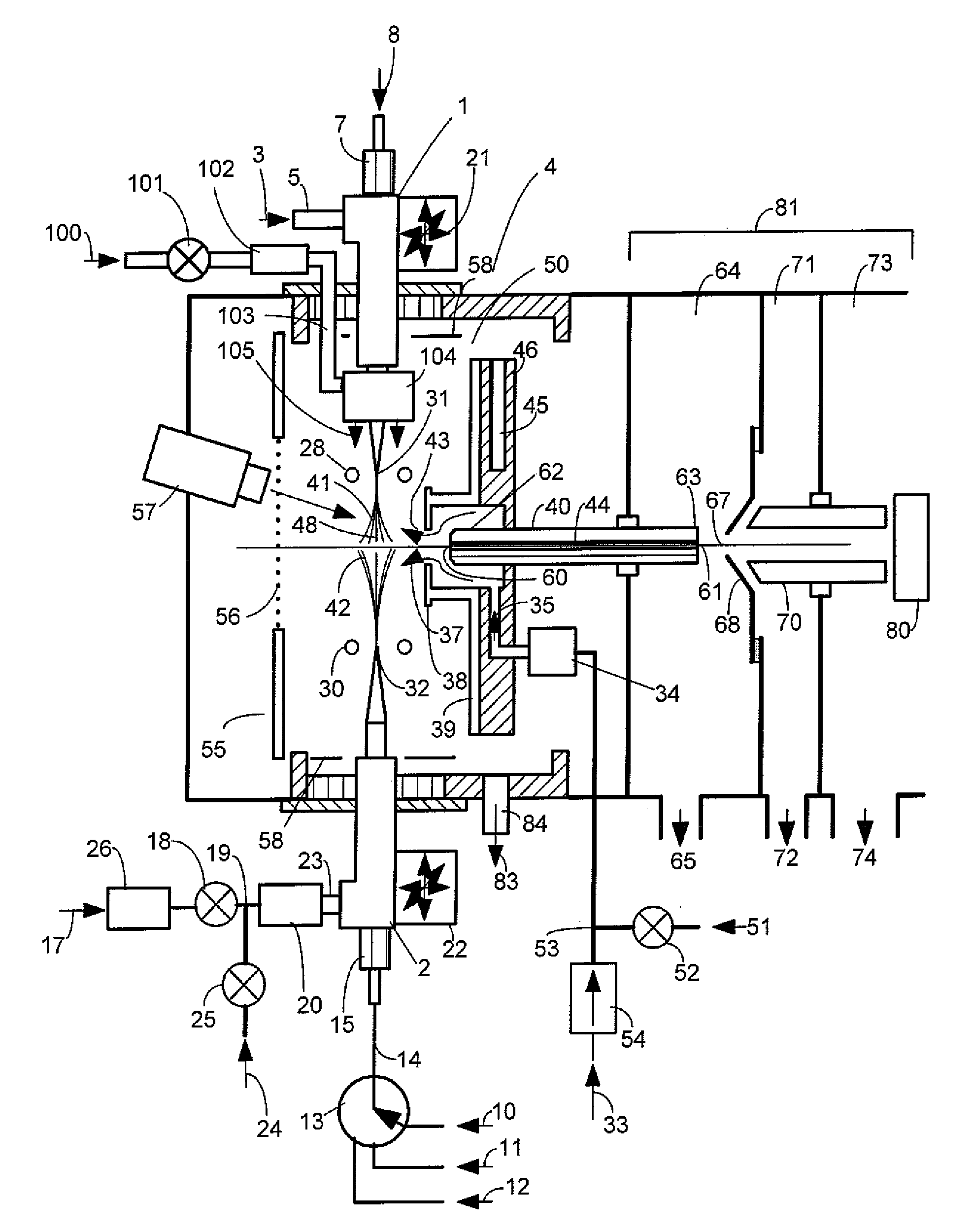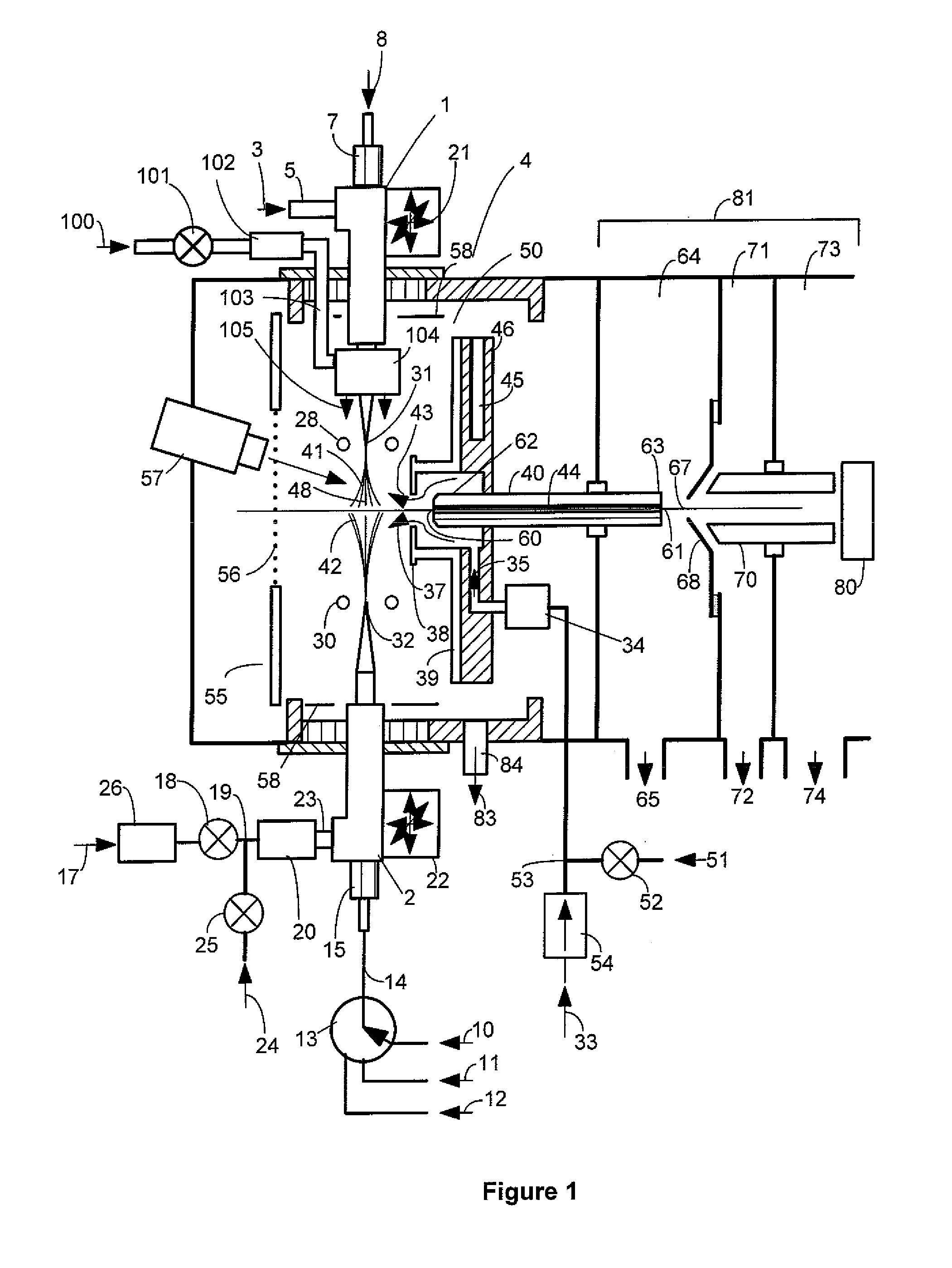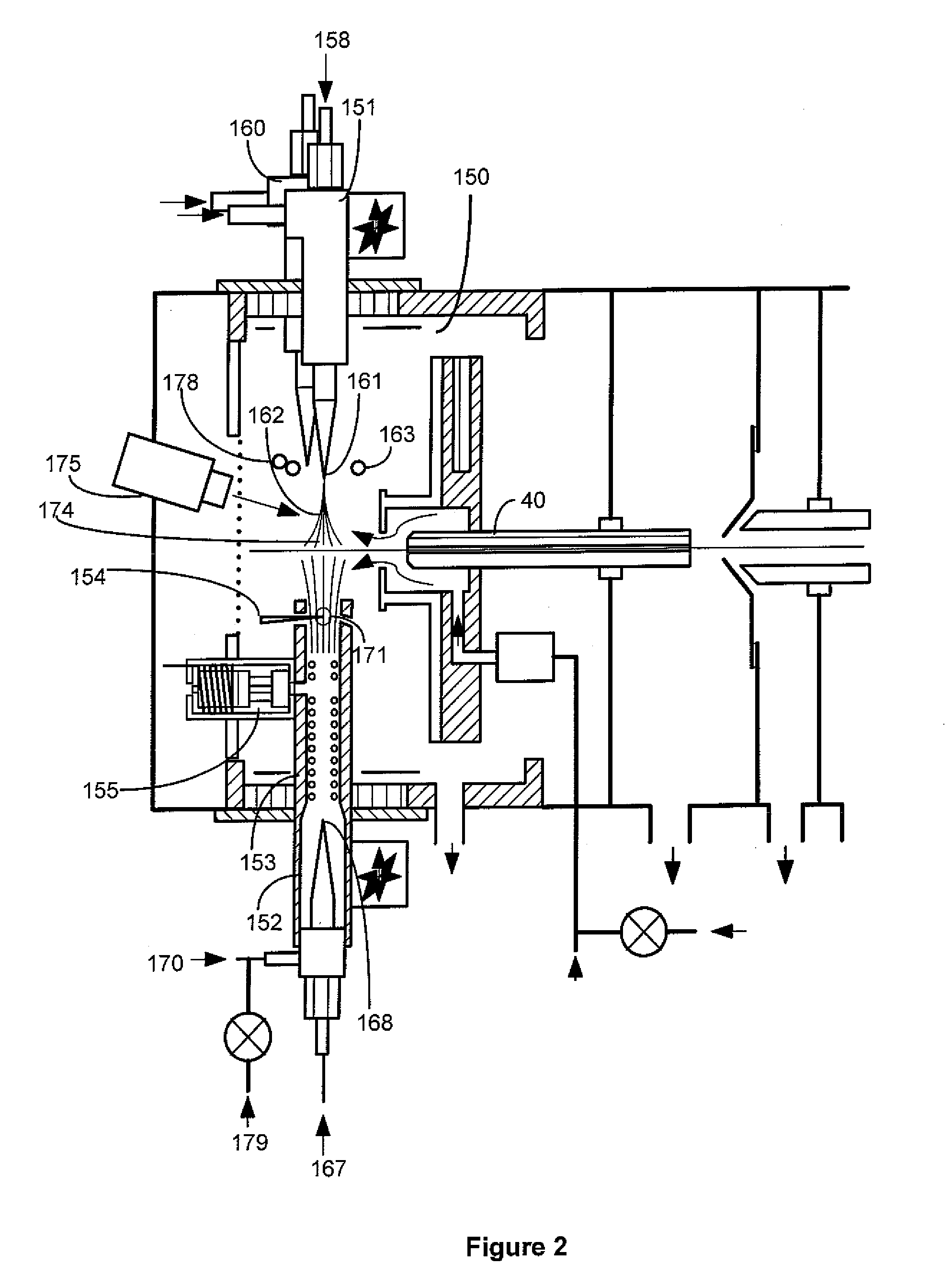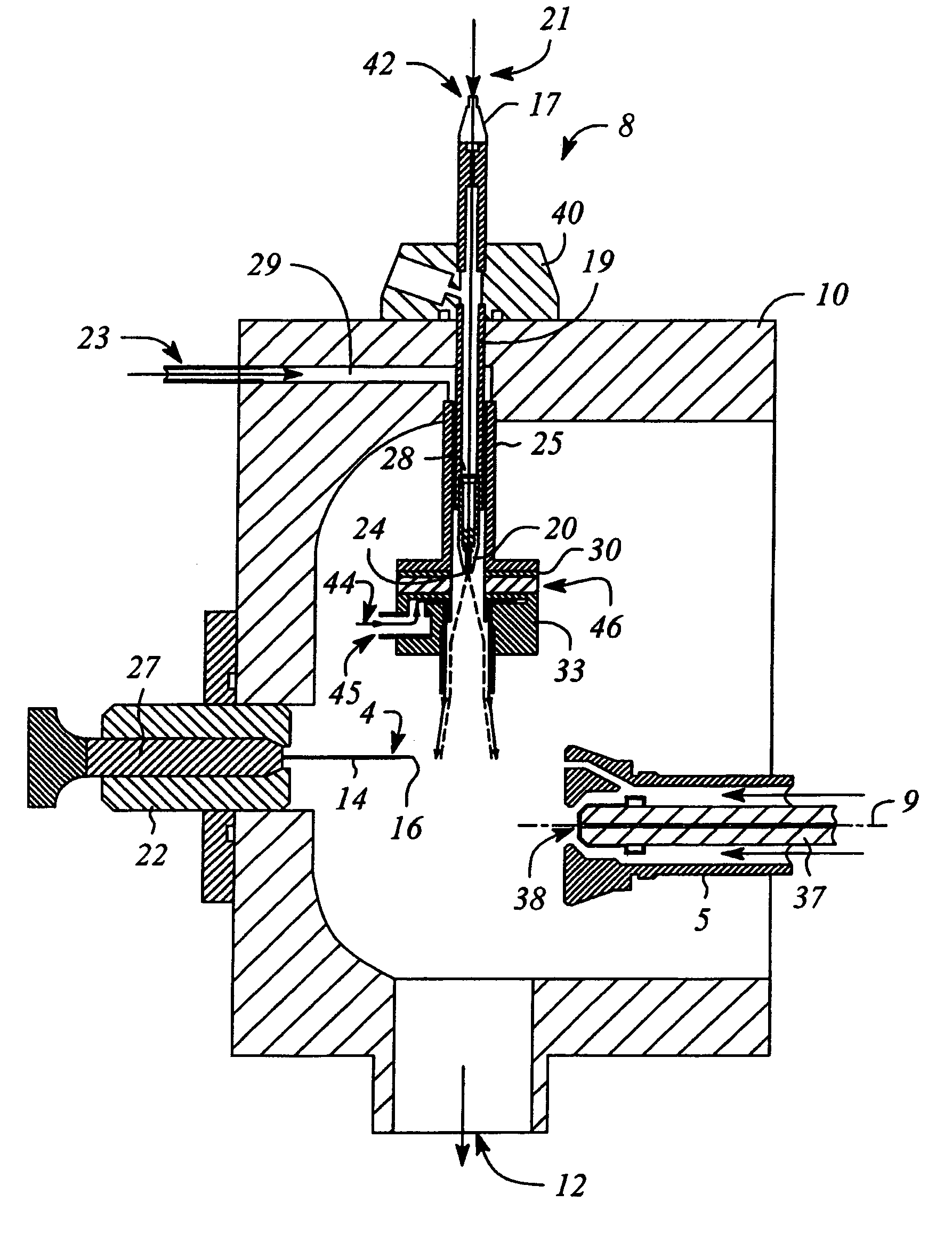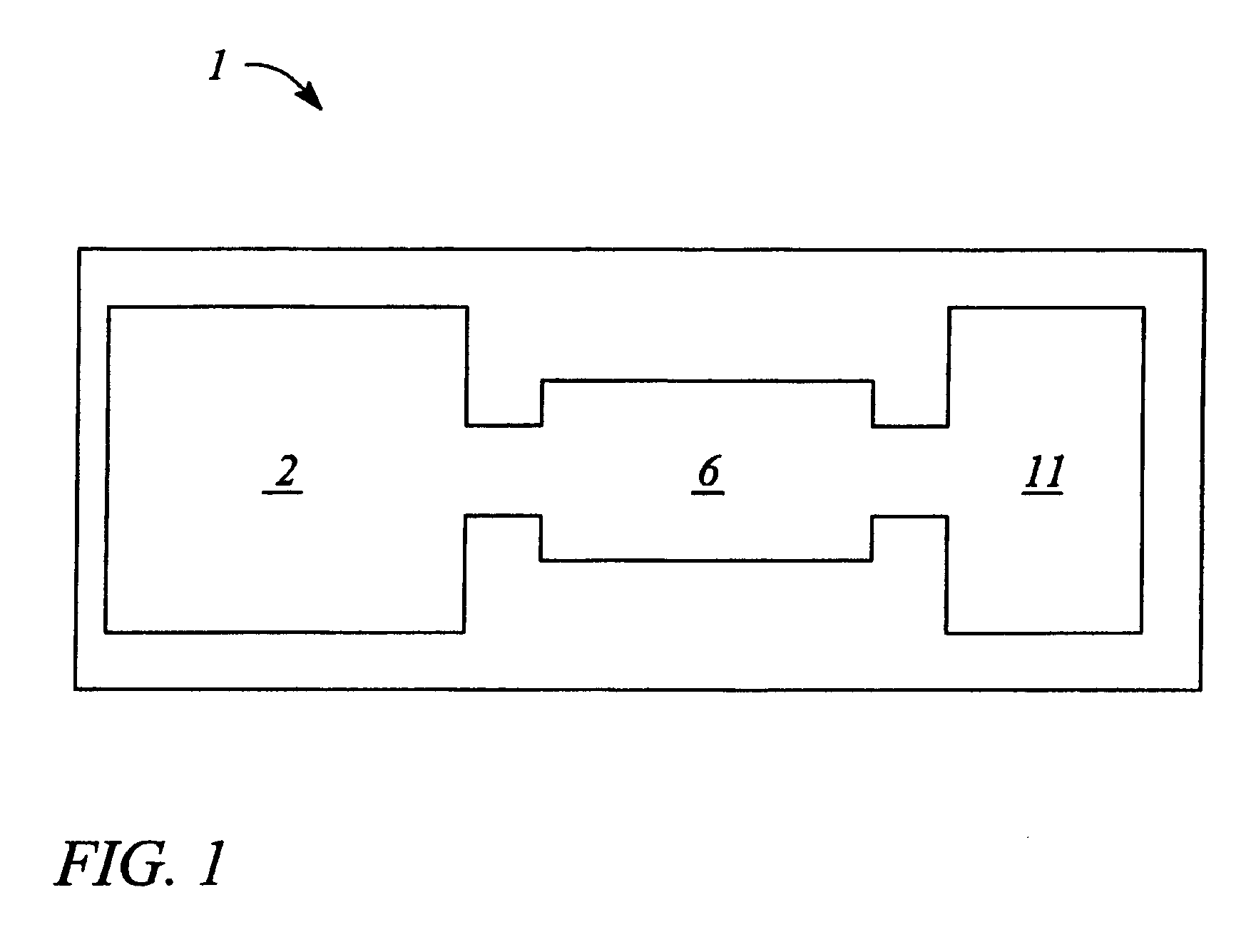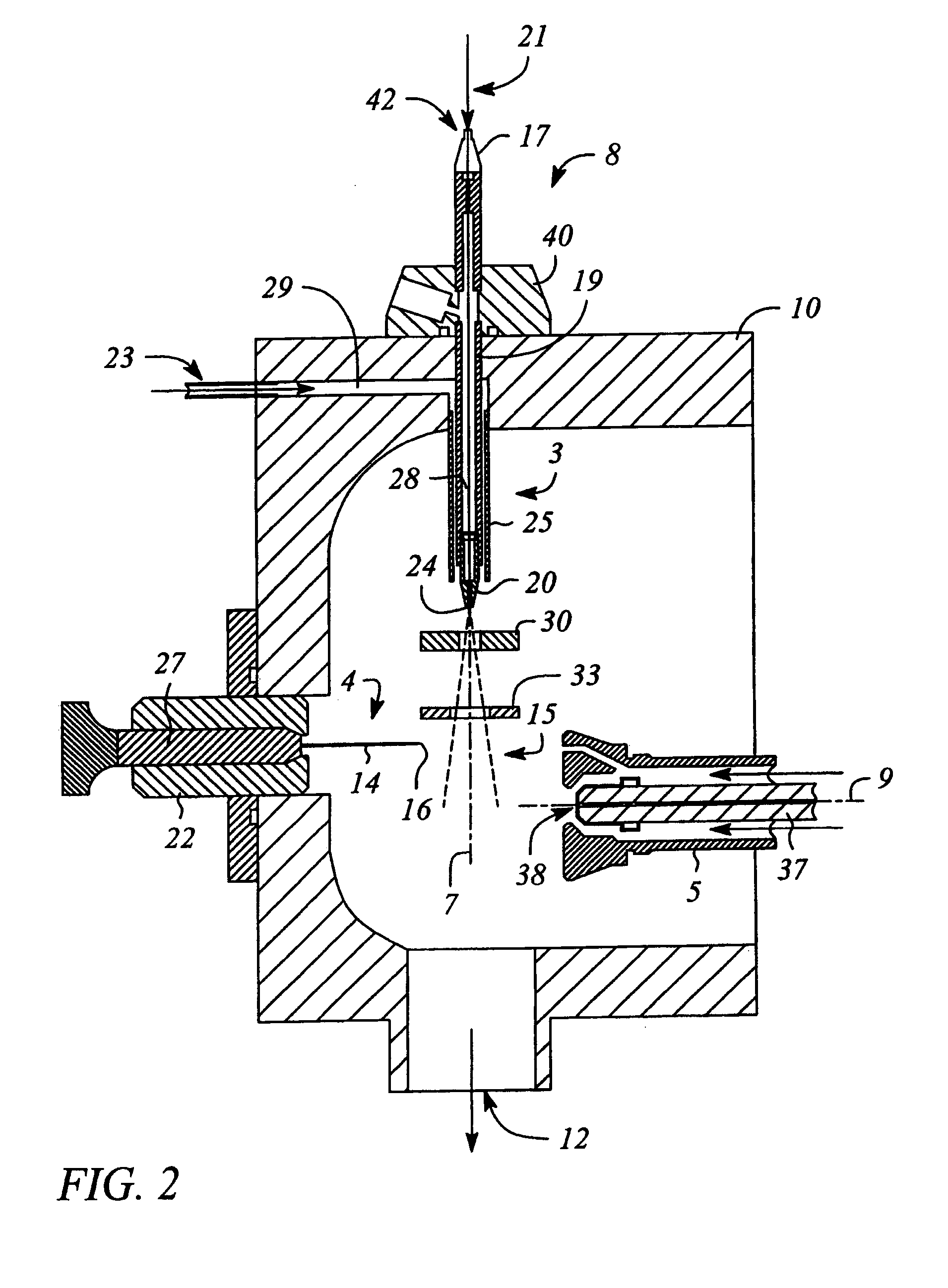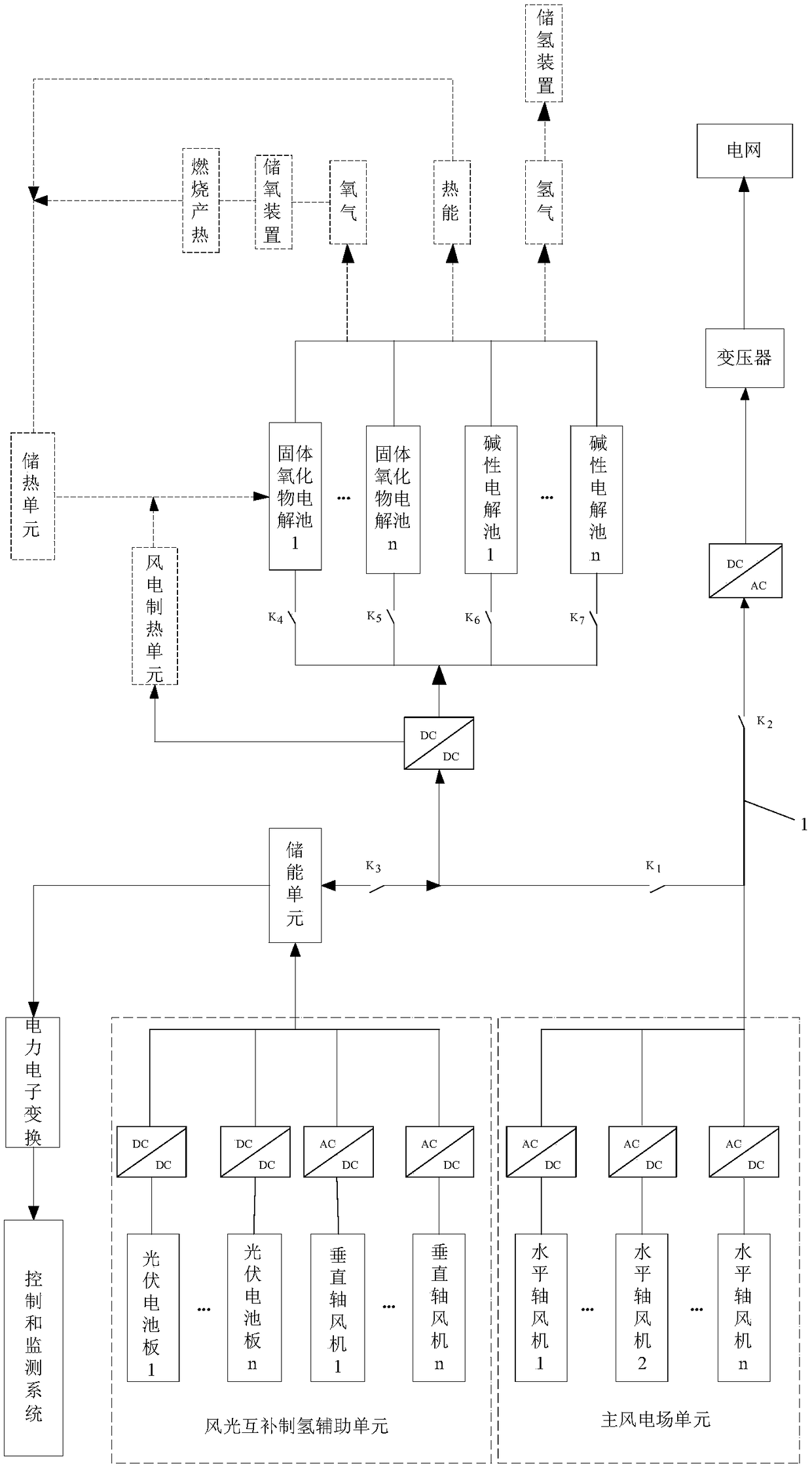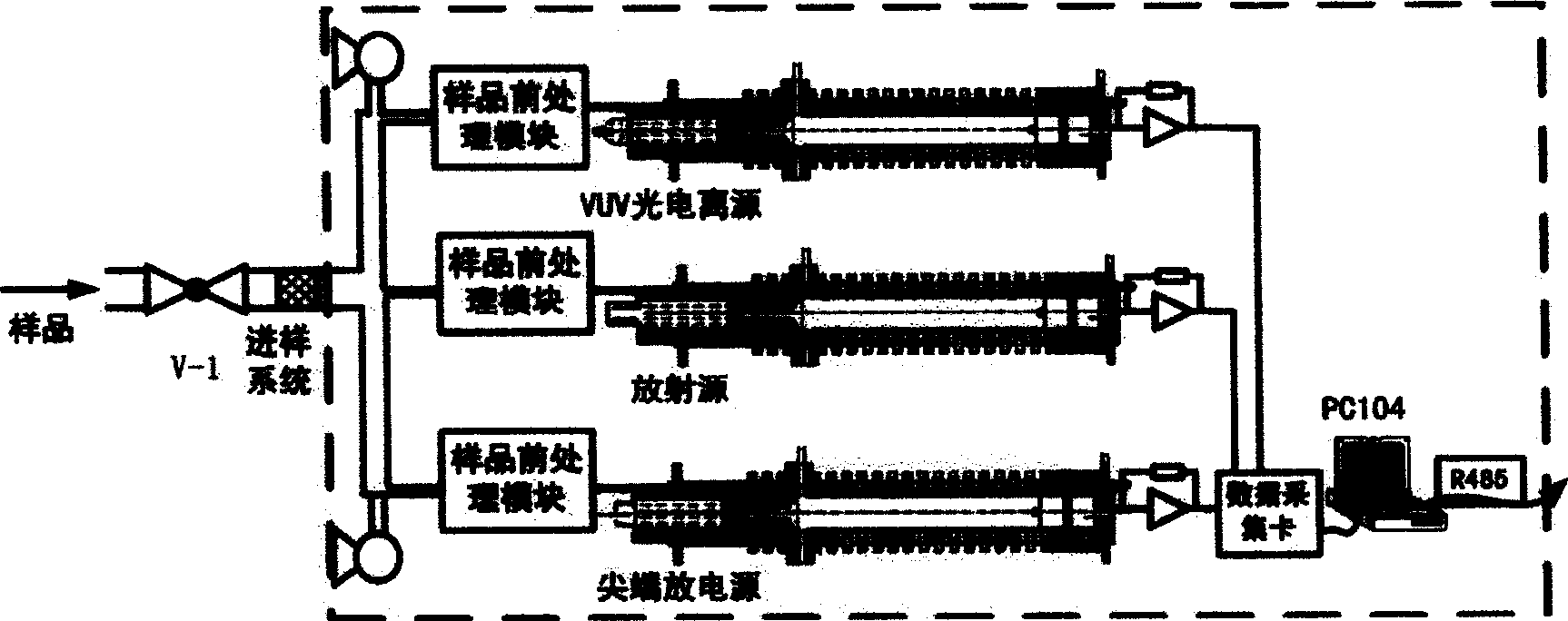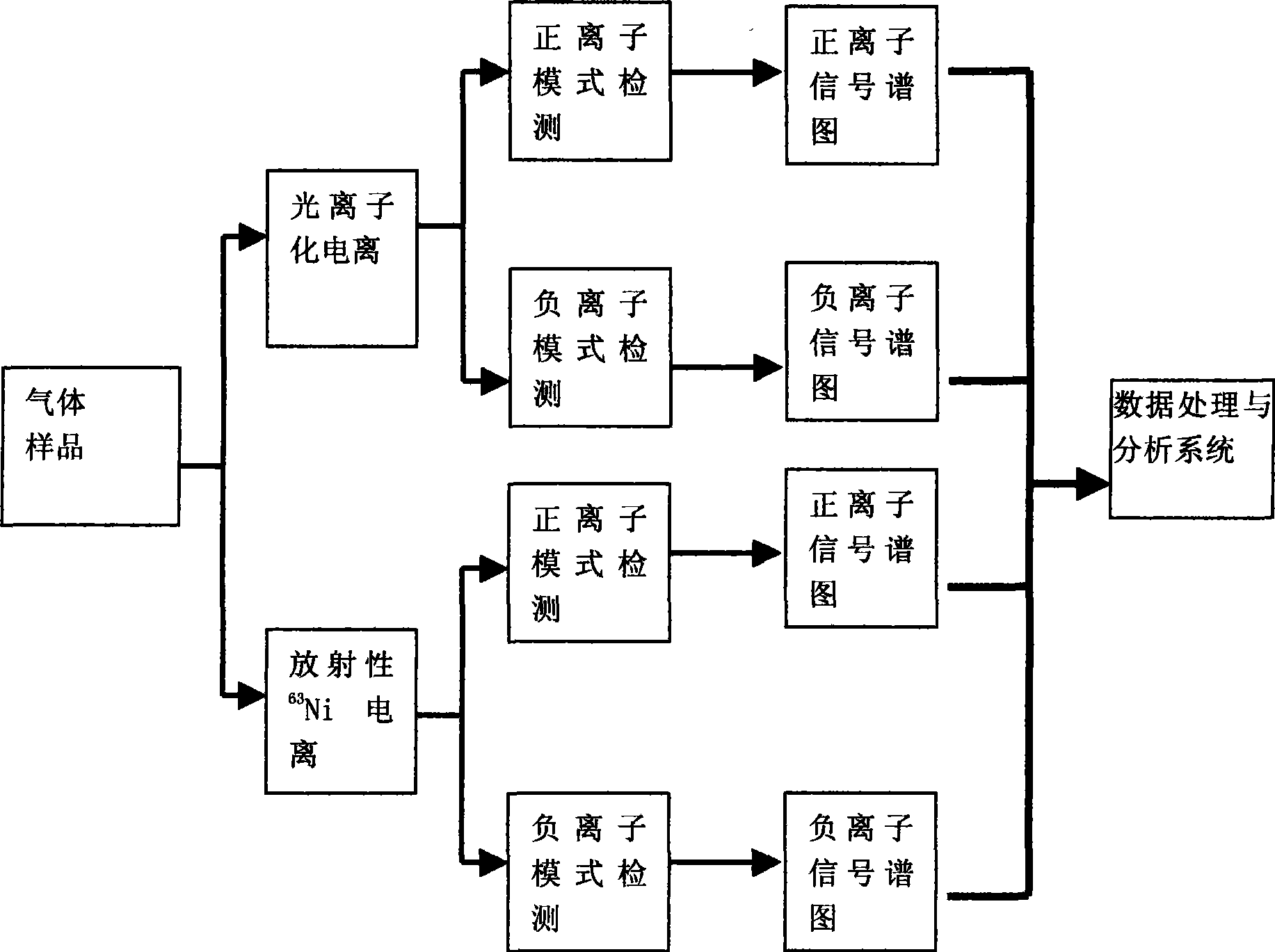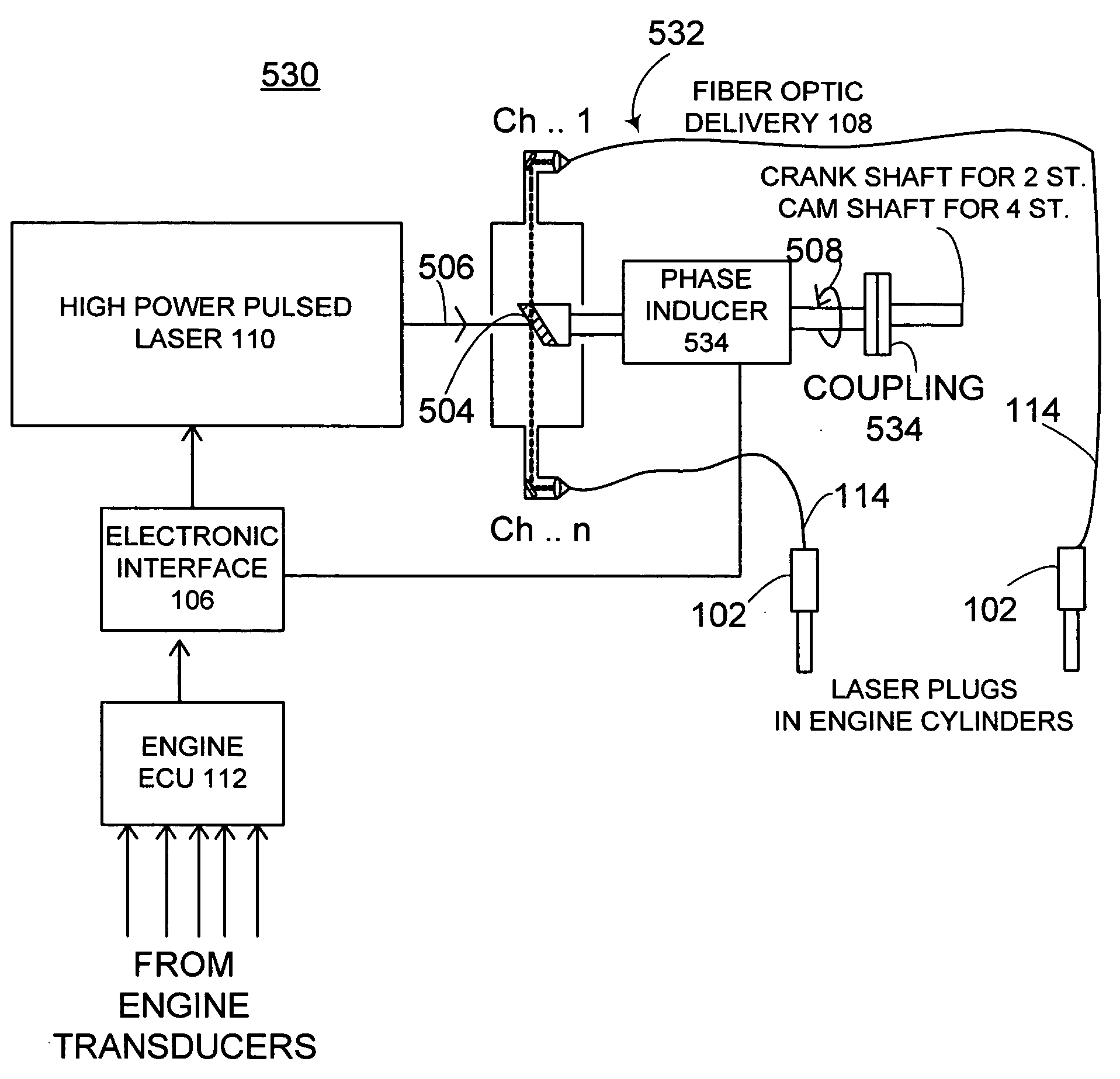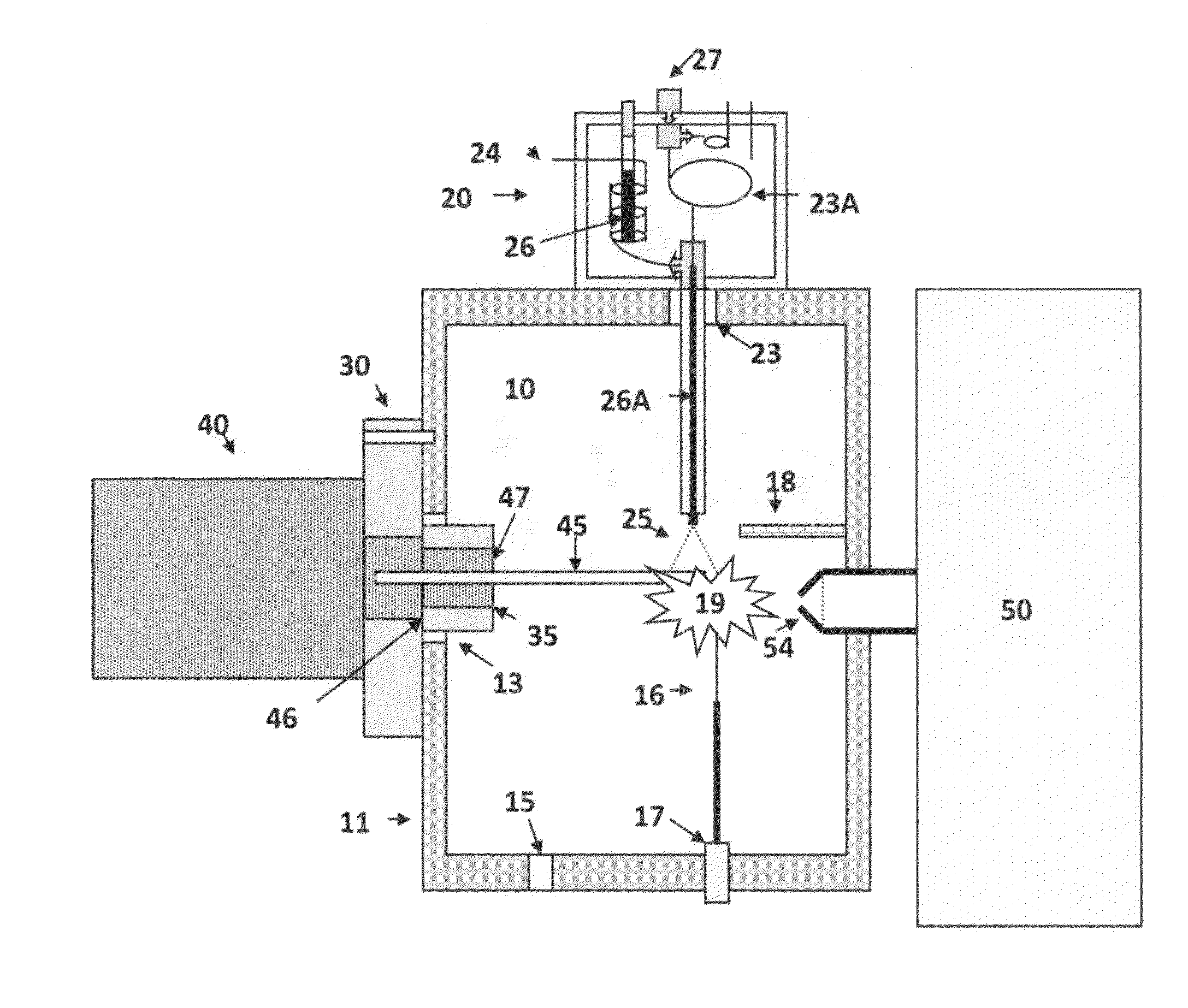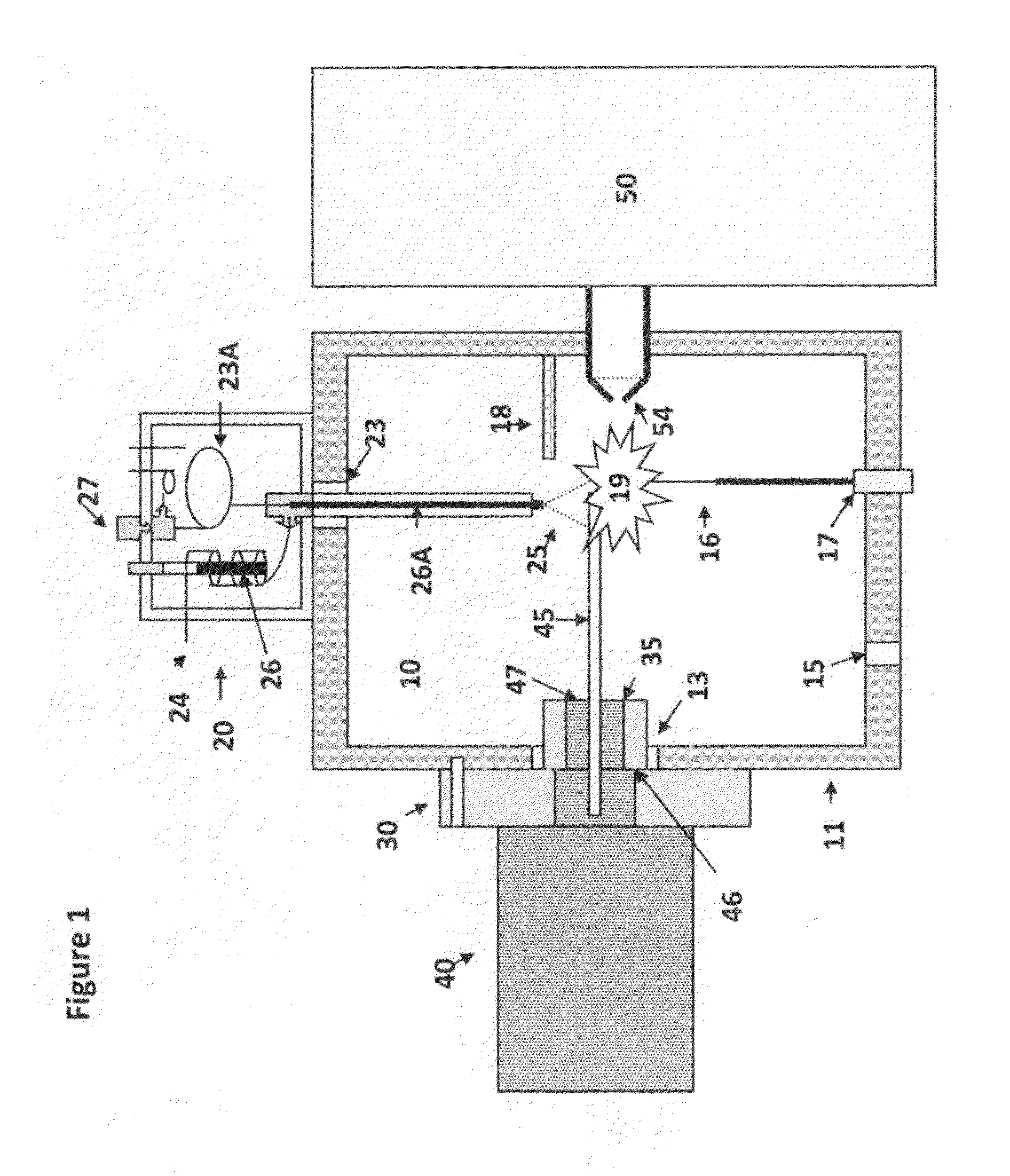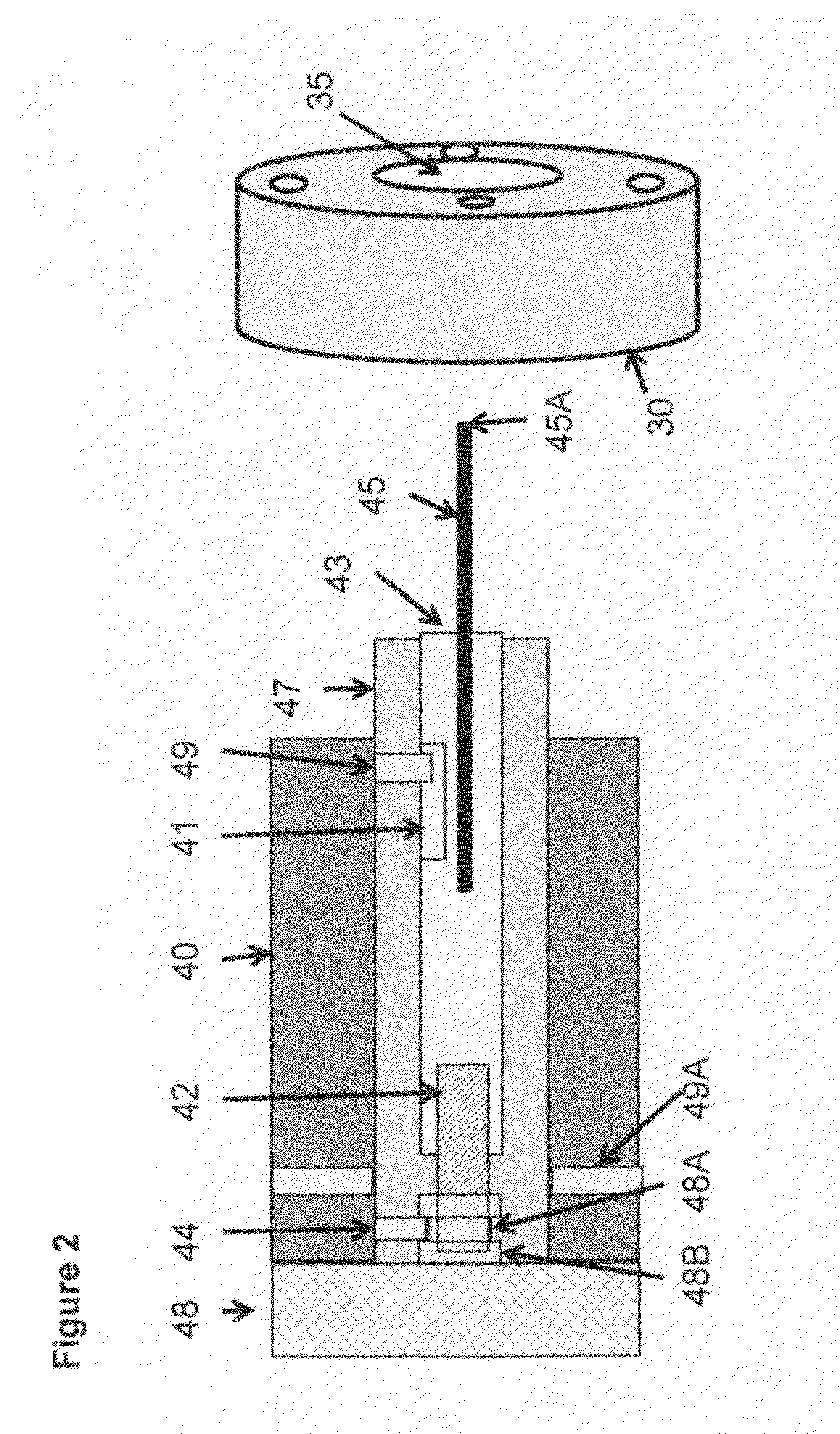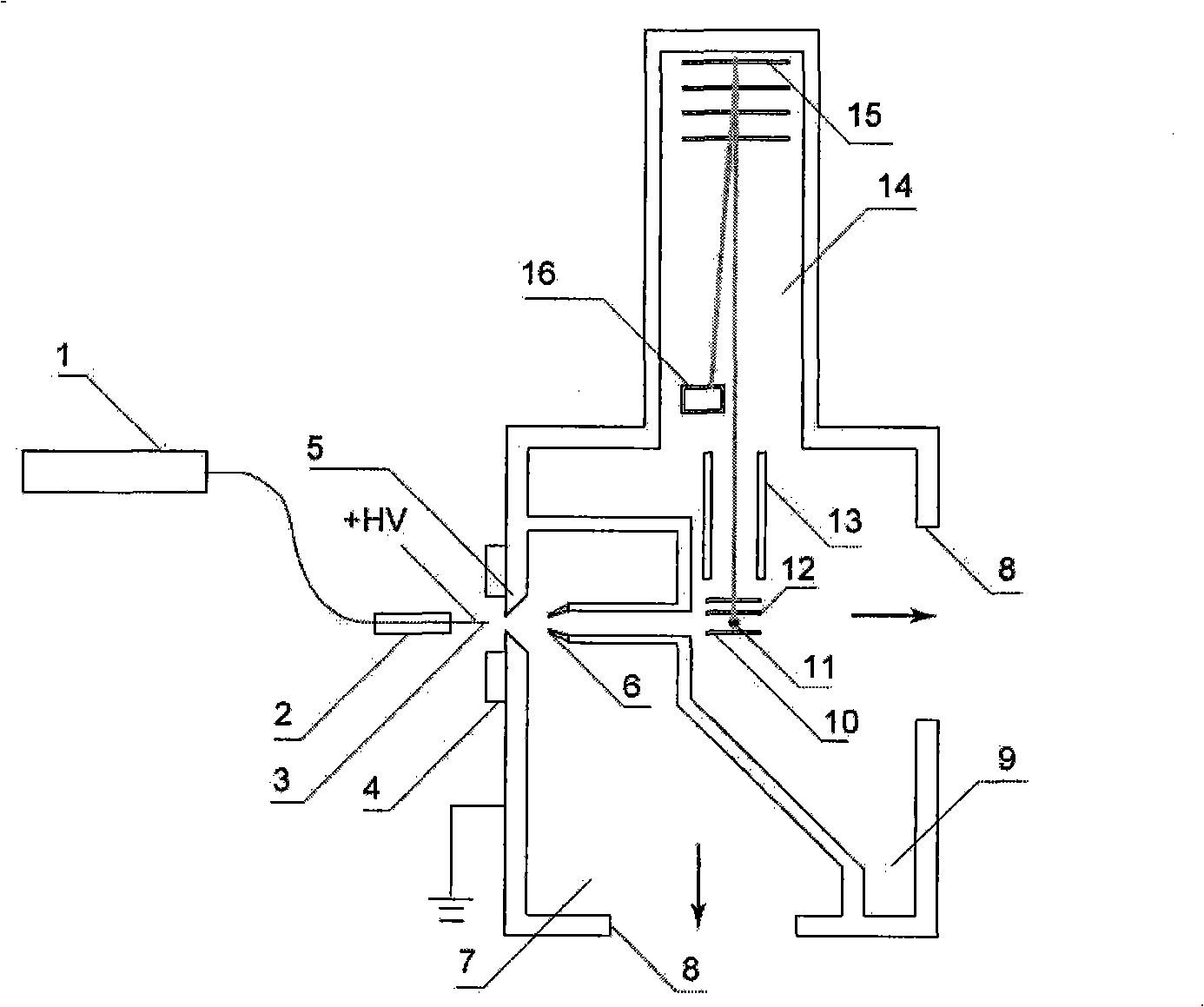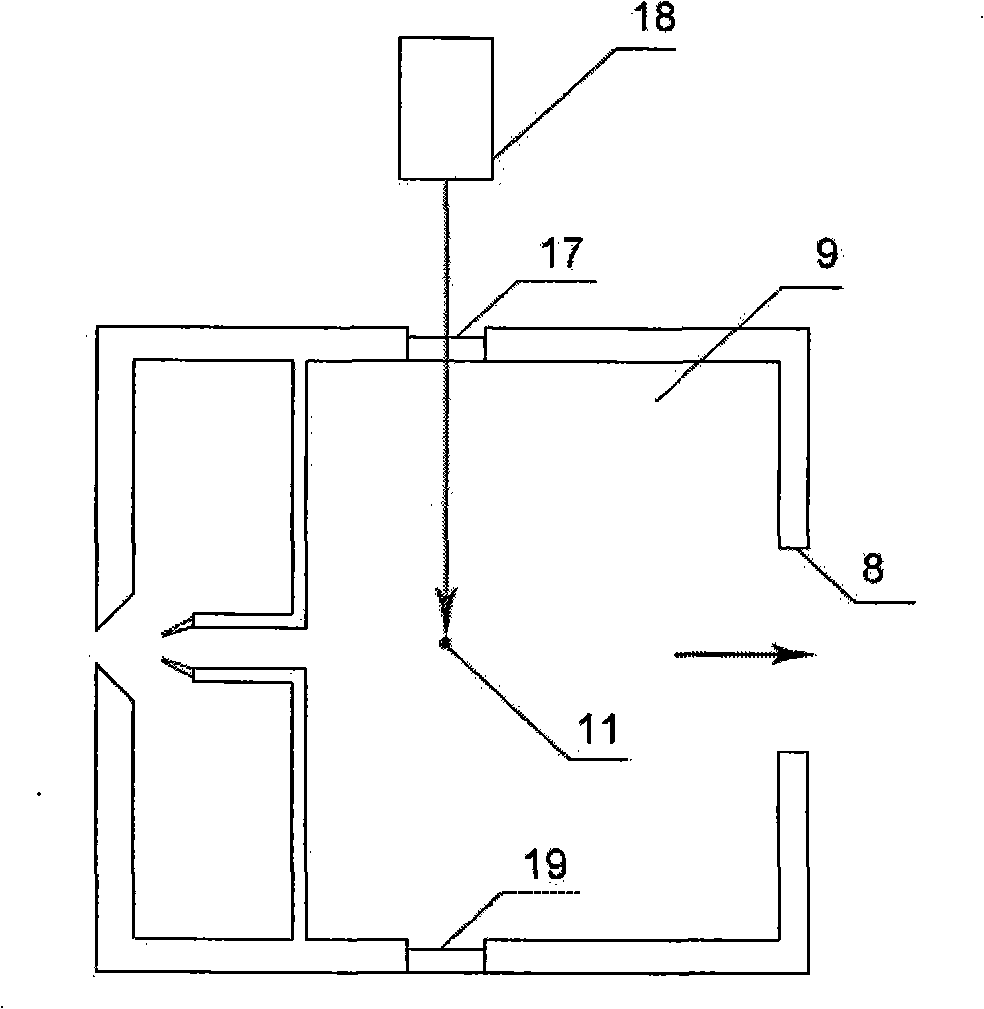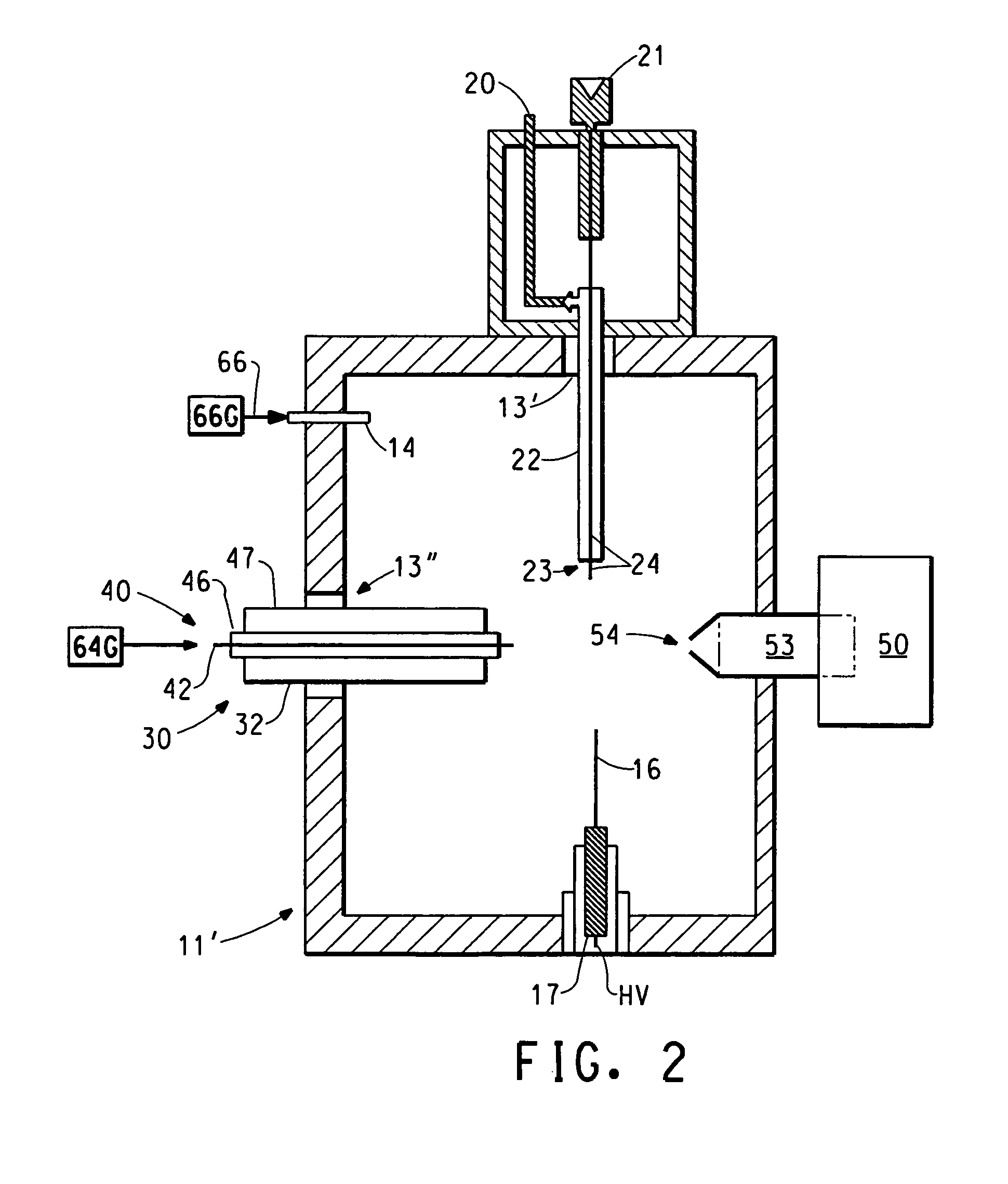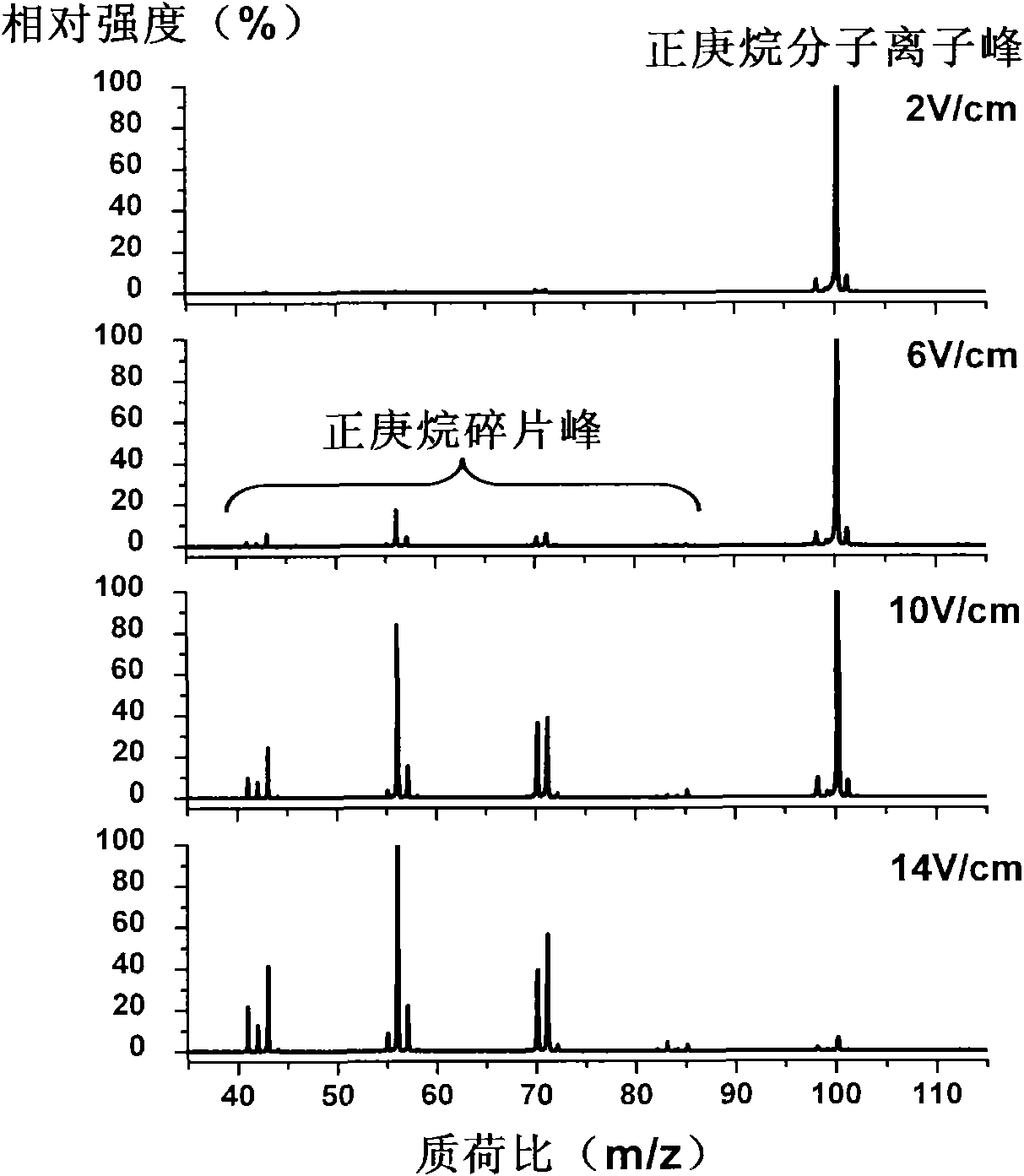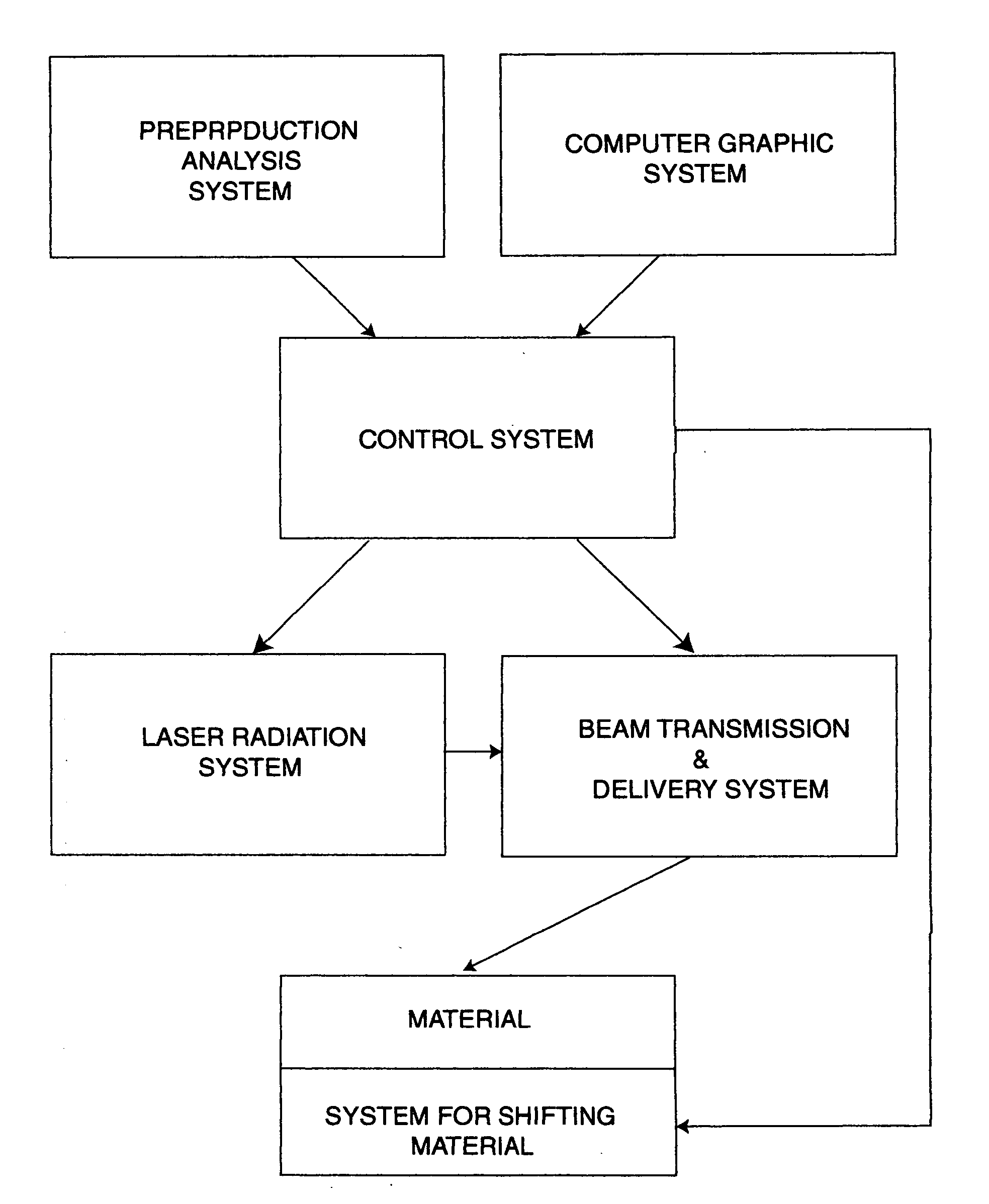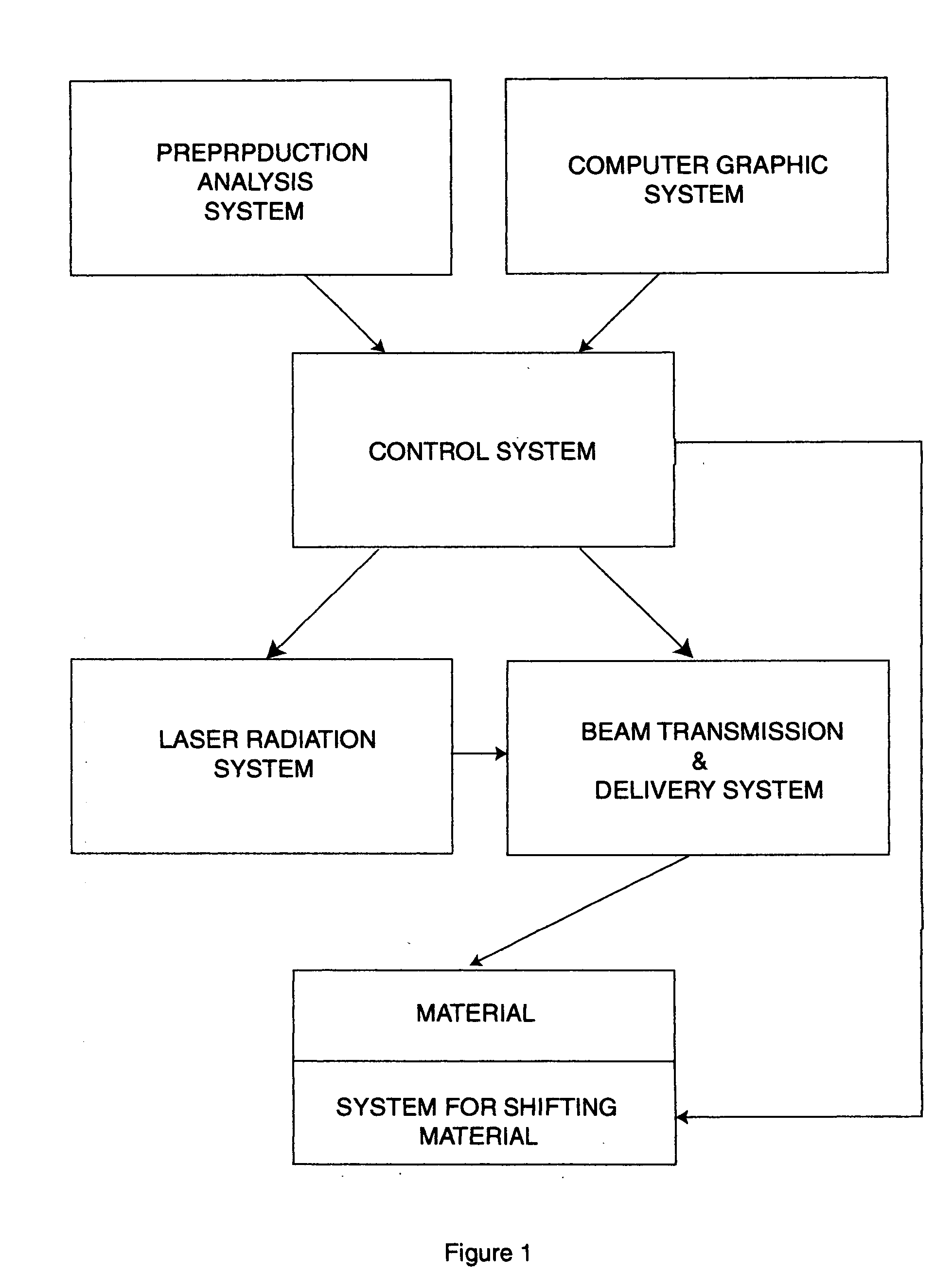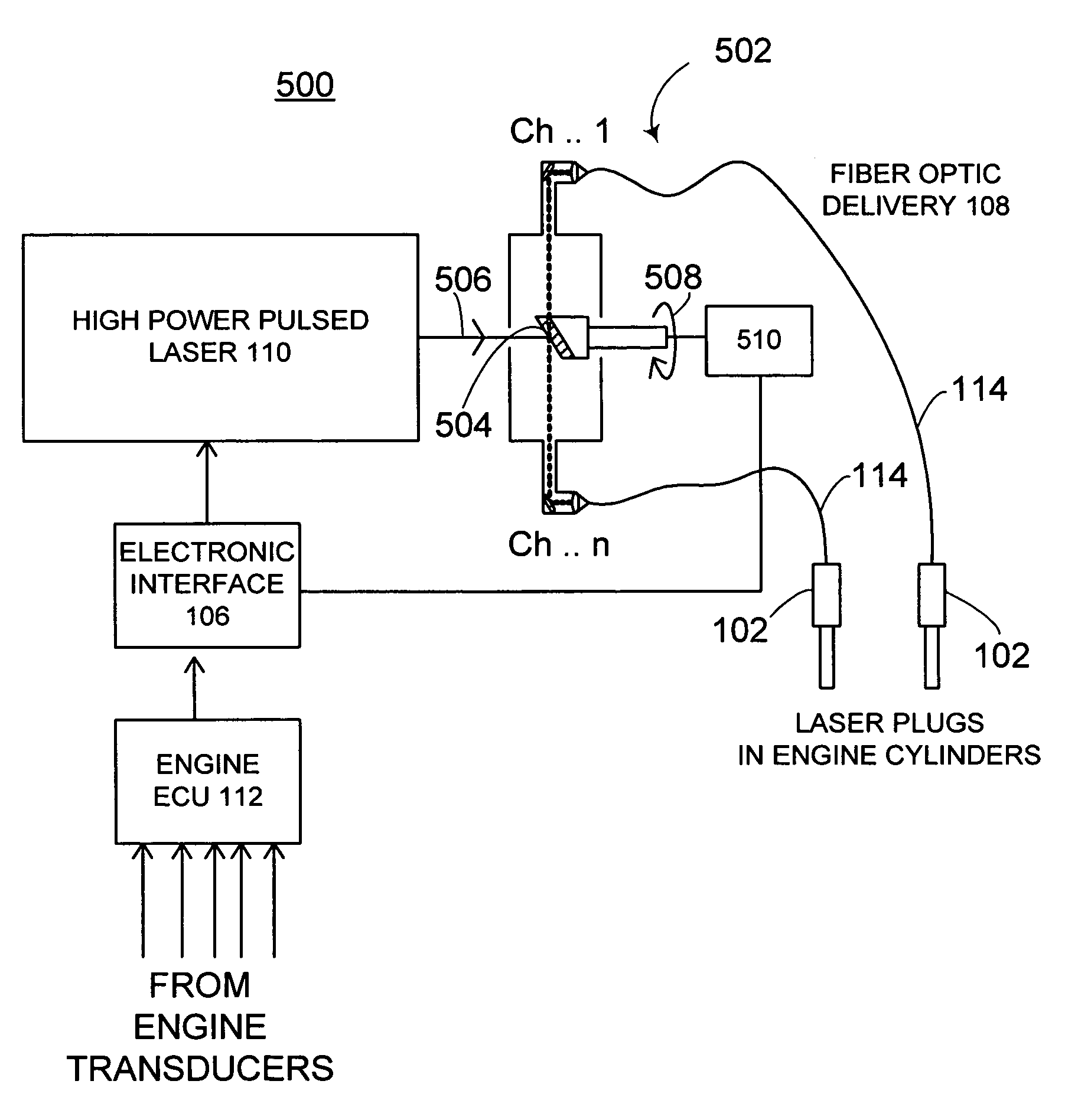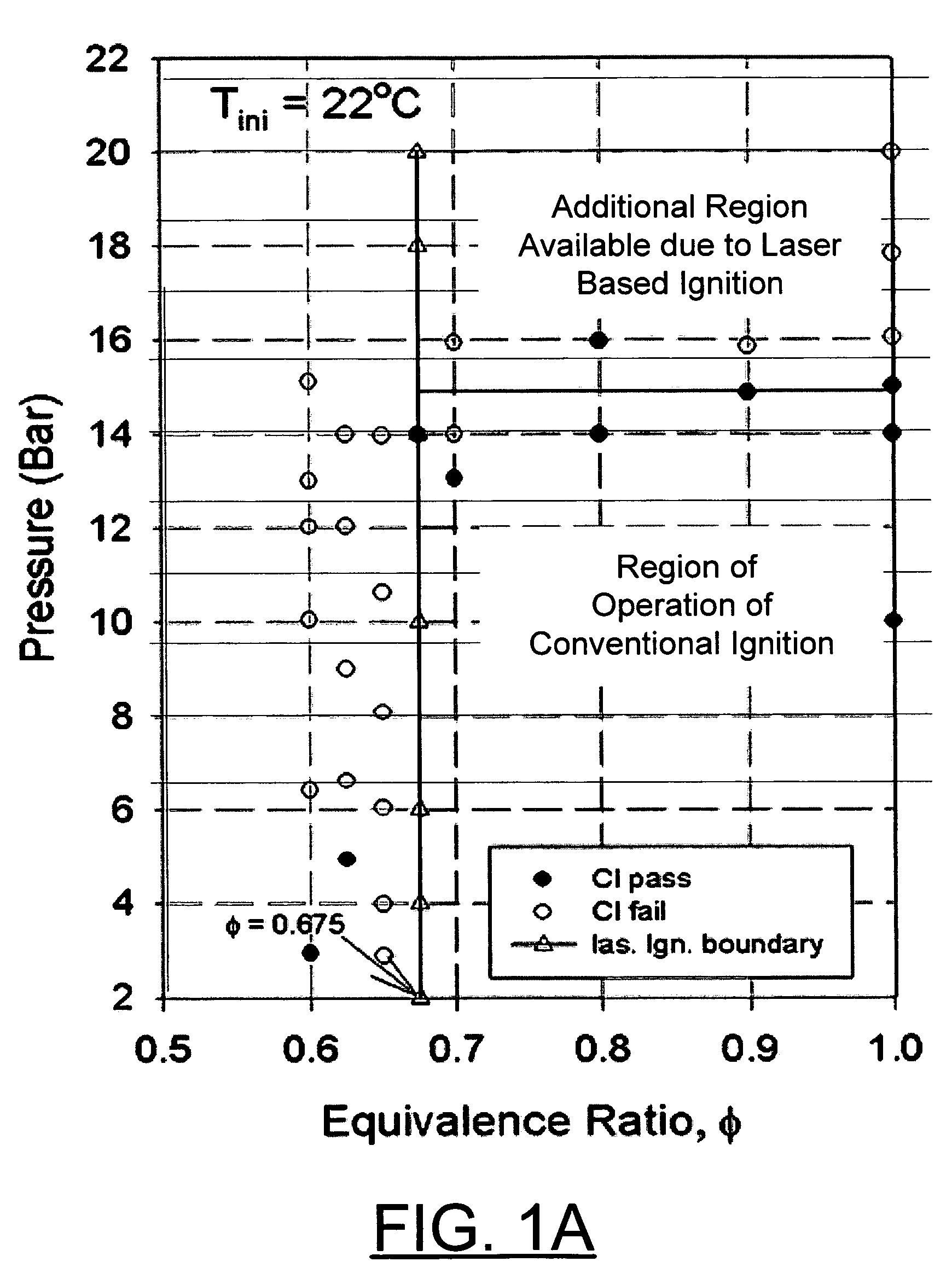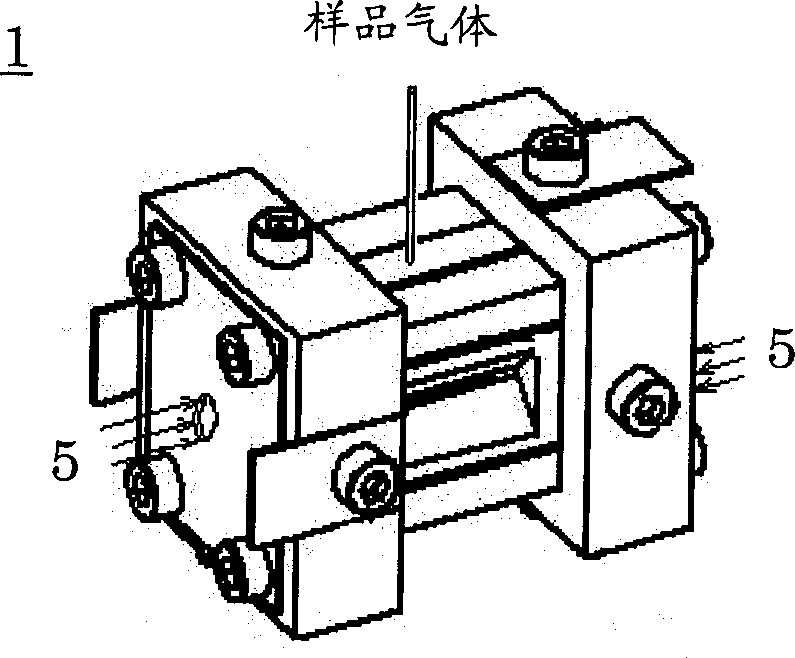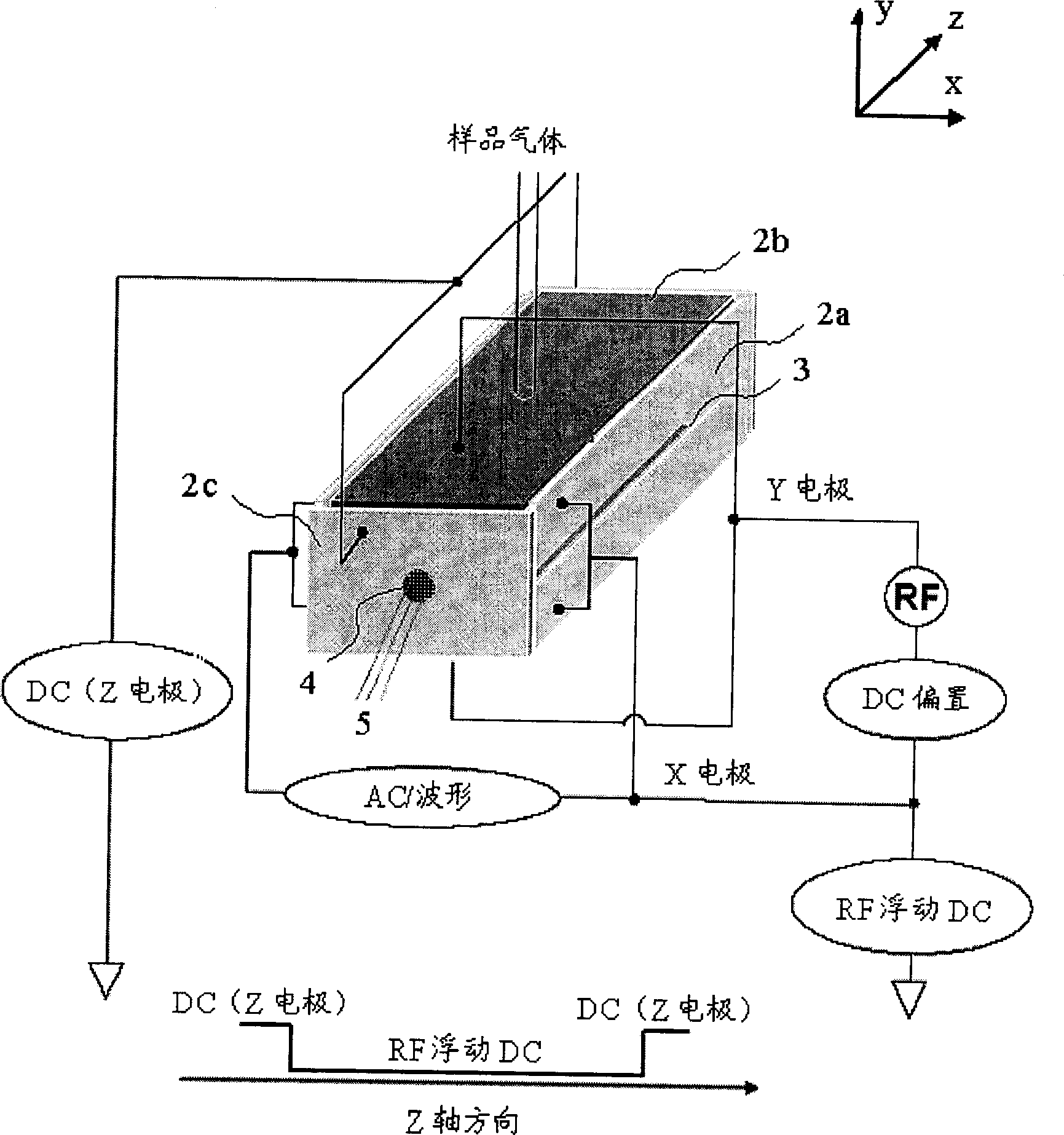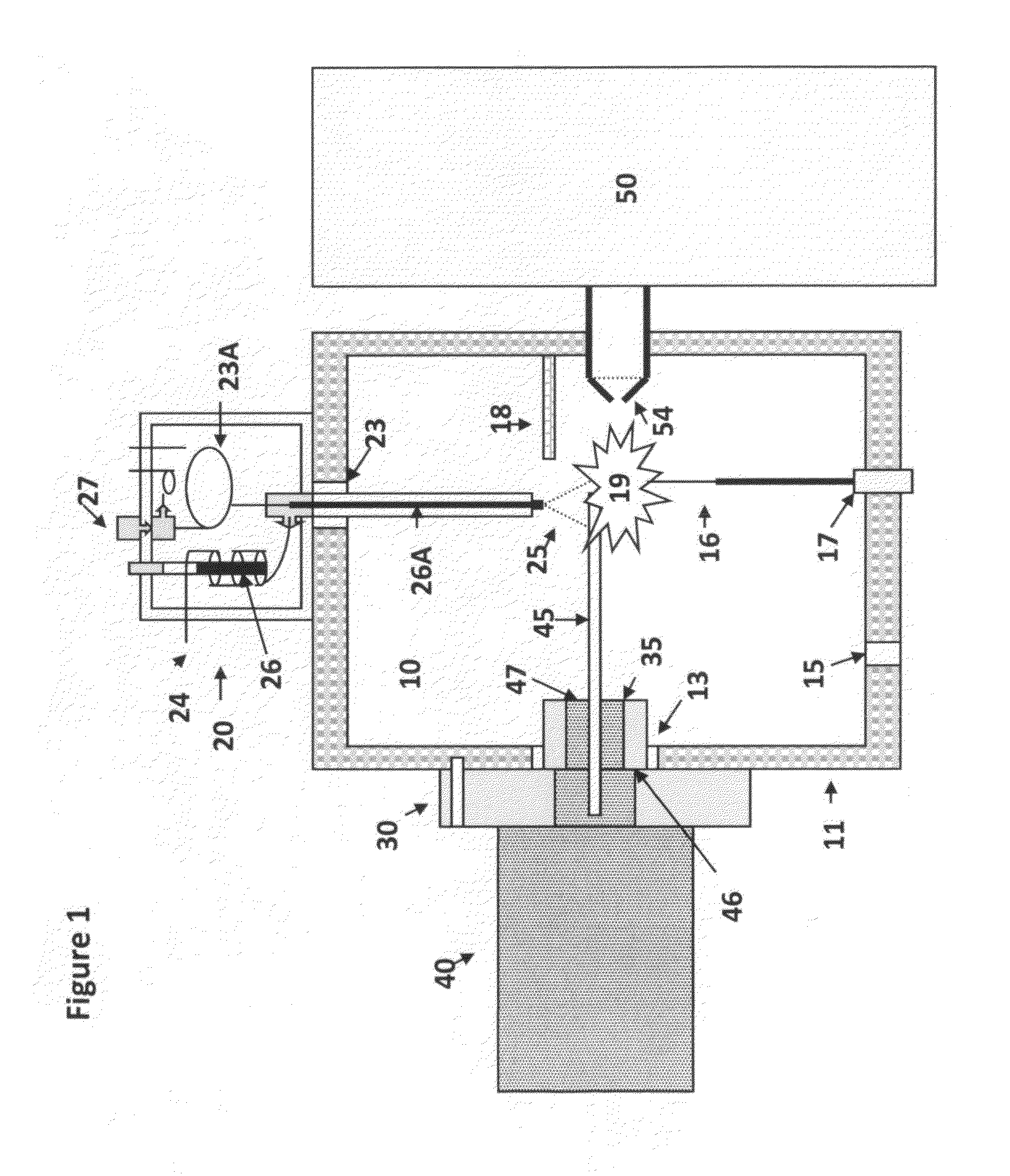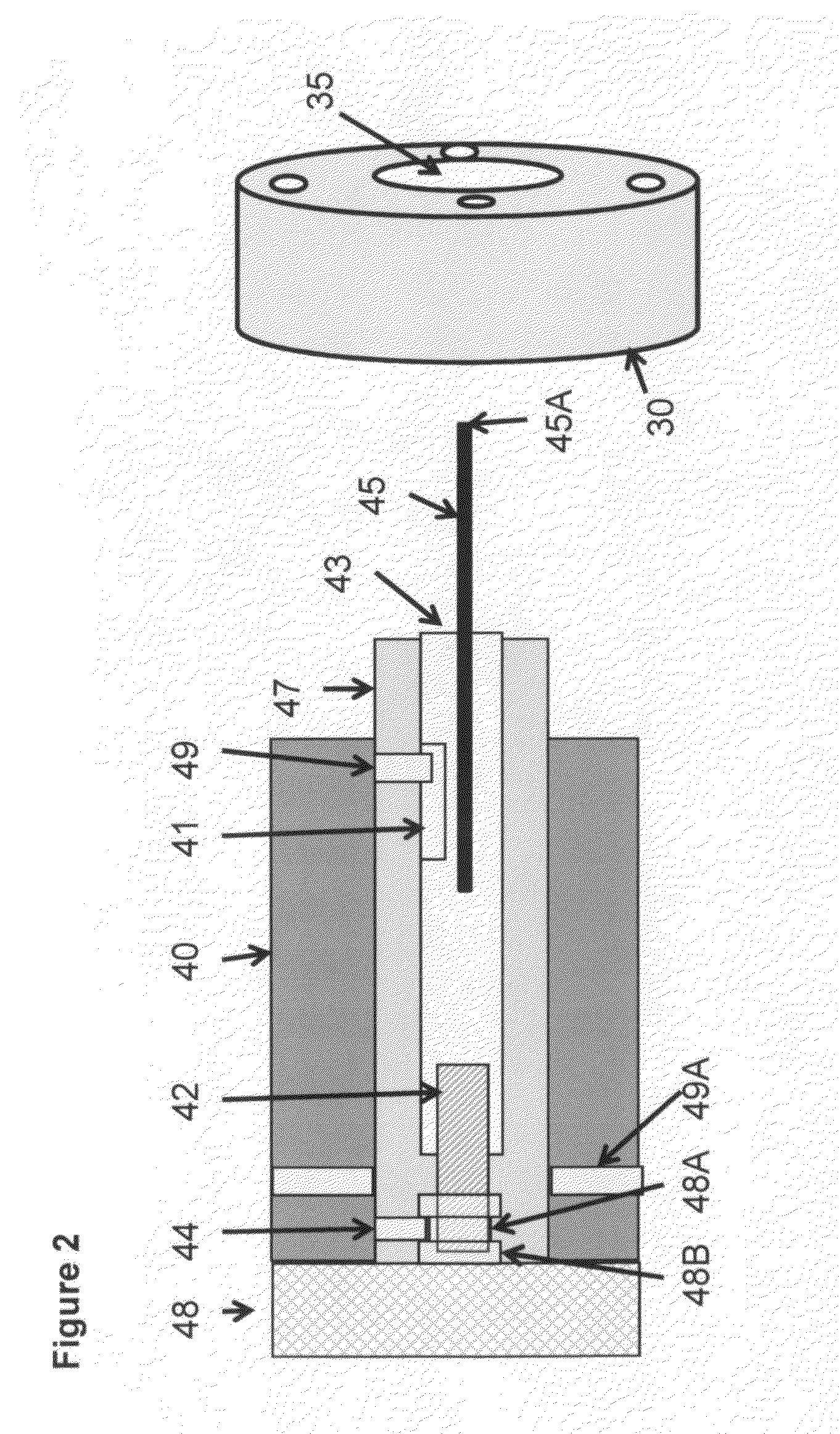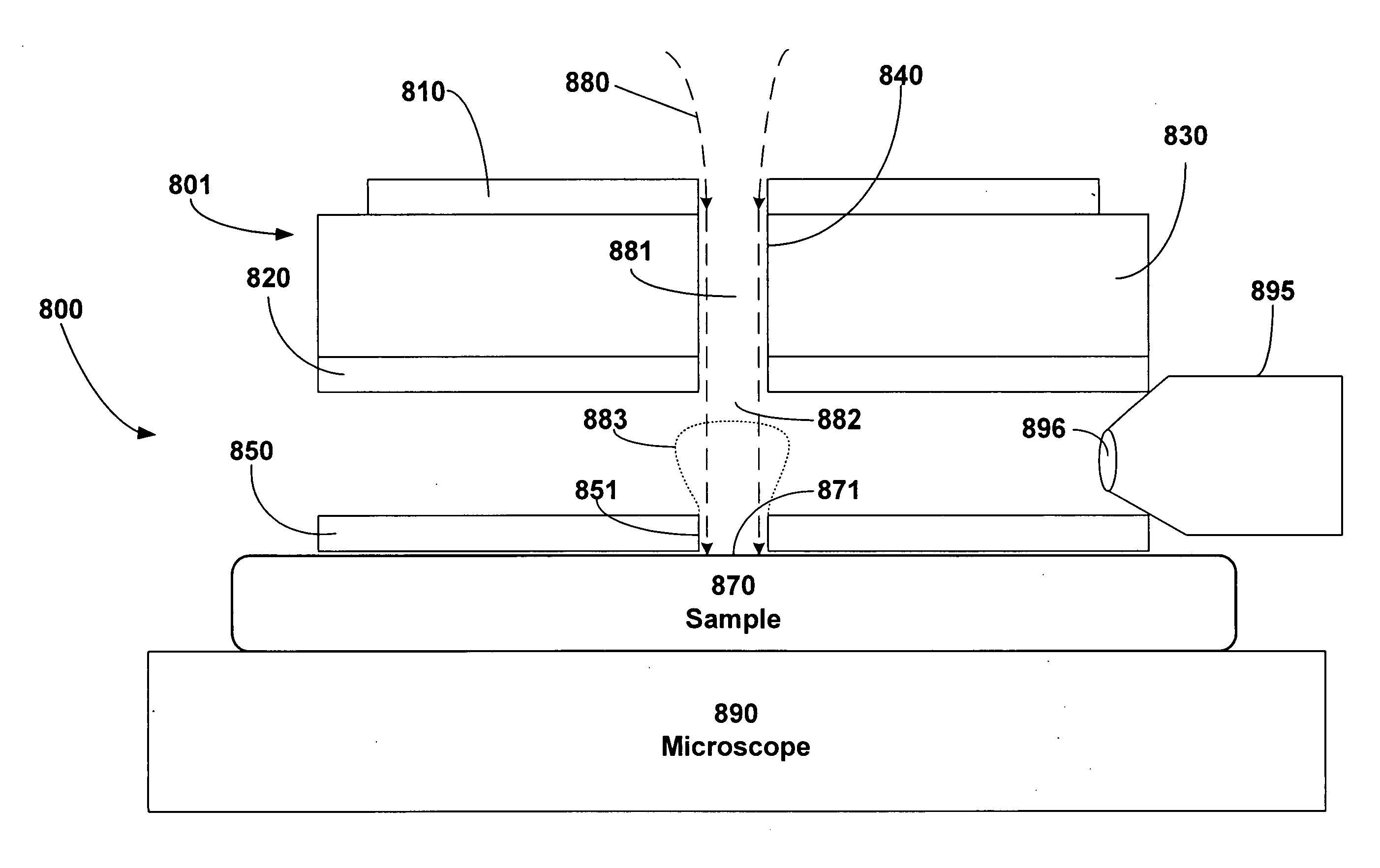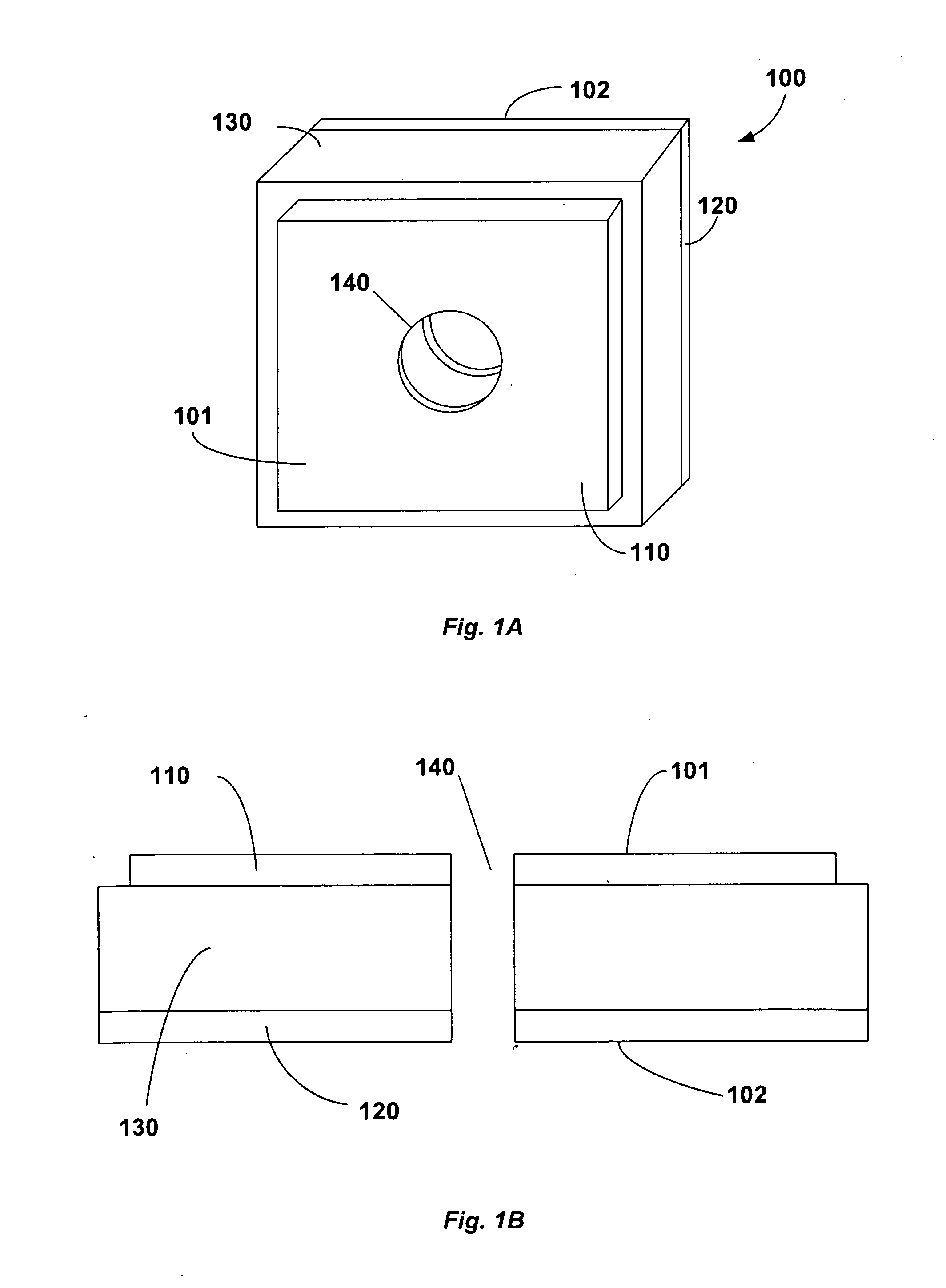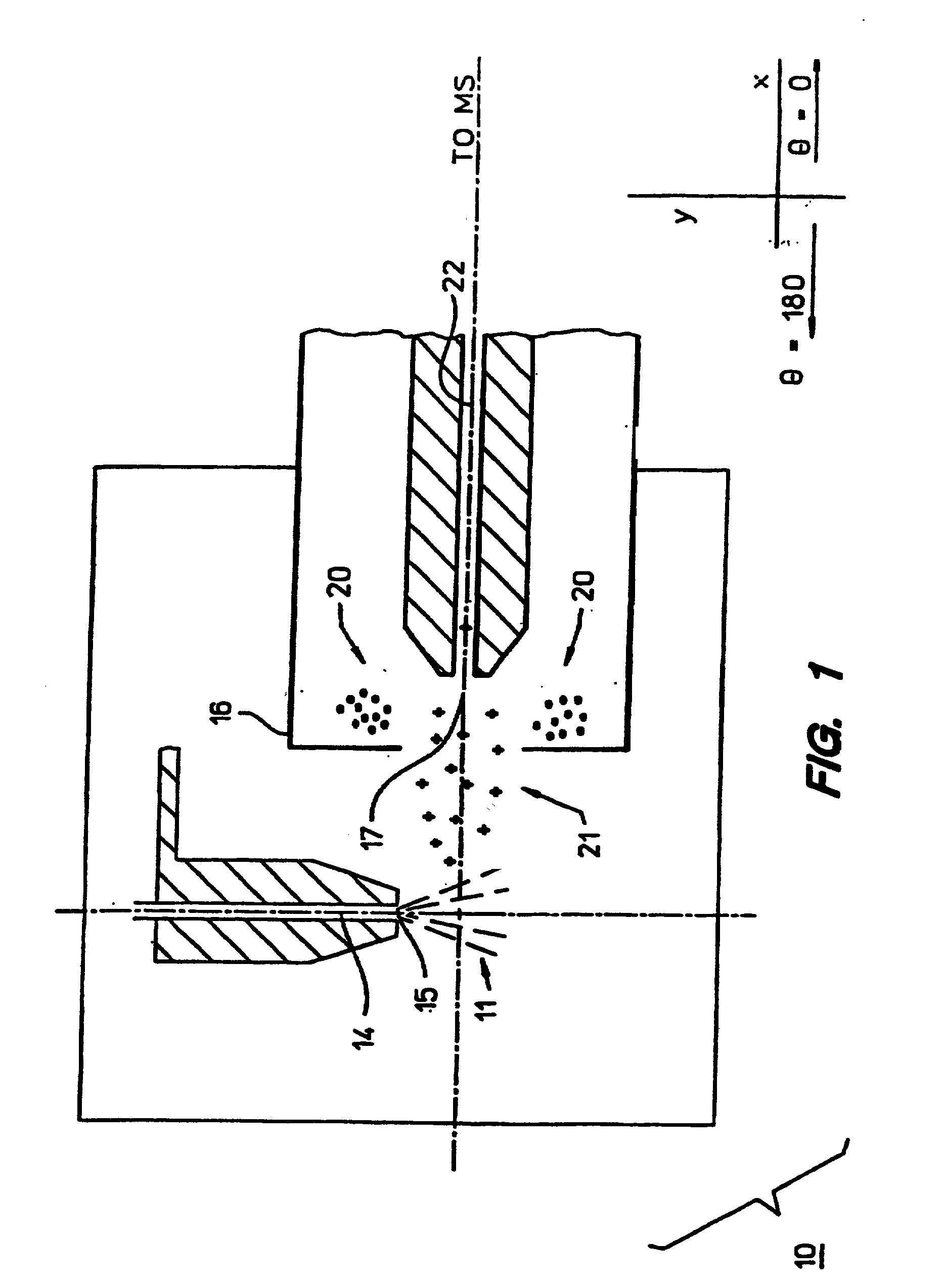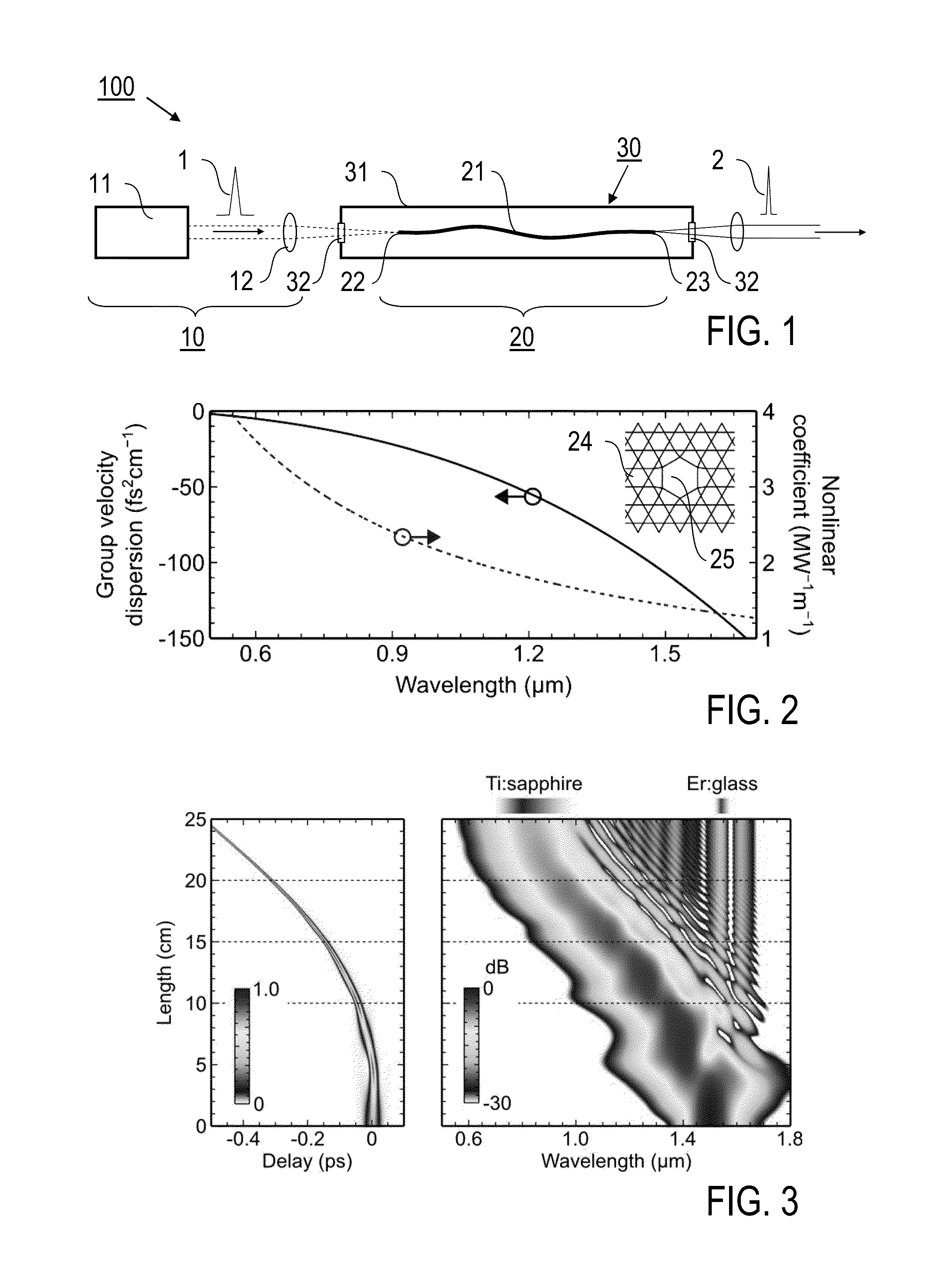Patents
Literature
Hiro is an intelligent assistant for R&D personnel, combined with Patent DNA, to facilitate innovative research.
218 results about "Photoionization" patented technology
Efficacy Topic
Property
Owner
Technical Advancement
Application Domain
Technology Topic
Technology Field Word
Patent Country/Region
Patent Type
Patent Status
Application Year
Inventor
Photoionization is the physical process in which an ion is formed from the interaction of a photon with an atom or molecule.
Atmospheric pressure ion source for mass spectrometry
InactiveUS20060255261A1Low costIncrease speedIsotope separationMass spectrometersGas phaseCorona discharge
A multiple function atmospheric pressure ion source interfaced to a mass spectrometer comprises multiple liquid inlet probes configured such that the sprays from two or more probes intersect in a mixing region. Gas phase sample ions or neutral species generated in the spray of one probe can react with reagent gas ions generated from one or more other probes by such ionization methods as Electrospray, photoionization, corona discharge and glow discharge ionization. Reagent ions may be optimally selected to promote such processes as Atmospheric Pressure Chemical Ionization of neutral sample molecules, or charge reduction or electron transfer dissociation of multiply charged sample ions. Selected neutral reagent species can also be introduced into the mixing region to promote charge reduction of multiply charged sample ions through ion-neutral reactions. Different operating modes can be performed alternately or simultaneously, and can be rapidly turned on and off under manual or software control.
Owner:WHITEHOUSE CRAIG +3
Apparatus and method for focusing ions and charged particles at atmospheric pressure
InactiveUS6744041B2Samples introduction/extractionIsotope separationInductively coupled plasmaElectrospray
Improvements have been made for collection and focusing of ions generated from atmospheric pressure sources such as electrospray, atmospheric pressure chemical ionization, inductively coupled plasma, discharge, photoionization and atmospheric pressure matrix assisted laser desorption ionization. A high transmission electro-optical surface is placed between the source regions and the focusing regions to optimize the field geometries and strengths in each respective region. Compression ratios of greater than 5000 are capable of transferring virtually all ions from large volume dispersive ion regions into ion beam cross-sections of less than 1 mm. Embodiments of this invention are methods and devices for improving sensitivity of mass spectrometry when coupled to atmospheric pressure ionization sources.
Owner:SHEEHAN EDWARD W +1
Ion sampling for APPI mass spectrometry
InactiveUS6653626B2Component separationSamples introduction/extractionMass Spectrometry-Mass SpectrometryPhysical chemistry
An atmospheric pressure ion source, e.g. for a mass spectrometer, that produces ions by atmospheric pressure photoionization (APPI). It includes a vaporizer, a photon source for photoionizing vapor molecules upon exit from the vaporizer, a passageway for transporting ions to, for example, a mass spectrometer system, and a means for directing the ions into the passageway. The center axis of the vaporizer and the center axis of the passageway form an angle that may be about 90 degrees. Included in the invention is a method for creating ions by atmospheric pressure photoionization along an axis and directing them into a passageway oriented at an angle to that axis.
Owner:AGILENT TECH INC
Photoionization enabled electrochemical material removal techniques for use in biomedical fields
InactiveUS6387088B1Accurate volume controlDepth accurateDiagnosticsSurgical instrument detailsThermal energyControl manner
A method for controlled removal of surface tissue layer portions with a non-contact energy delivery modality that applies electrical energy to the targeted tissue surface to cause electrochemical ablation. The system provides (i) a UV energy source for irradiating a beam path through a selected neutral gas environment overlying the targeted tissue thereby creating an ionized gas volume (i.e., a conductive non-equilibrium plasma), and (ii) an electrical source for creating an intense electrical field in the ionized gas volume to thereby apply energy to the targeted surface layer to cause volatilization and removal of the surface layer in a plasma-mediated ablation. The ultrafast plasma creation events are repeated at a high repetition rate to ablate surface layer portions in a controlled manner. Each ultrafast plasma creation event is of such a high intensity and such a brief duration that thermal energy is not transferred to the tissue thus preventing collateral thermal damage to regions adjacent to the targeted site.
Owner:SHATTUCK JOHN H +1
Ion enrichment aperture arrays
InactiveUS6914243B2Time-of-flight spectrometersElectron/ion optical arrangementsAtmospheric pressure dischargeInductively coupled plasma
Improvements have been made for collecting, focusing, and directing of ions and / or charged particles generated at atmospheric or near atmospheric pressure sources, such as but not limited to, electrospray; atmospheric pressure discharge ionization, chemical ionization, photoionization, and matrix assisted laser desorption ionization; and inductively coupled plasma ionization. A multiple-aperture laminated structure is place at the interface of two pressure regions. Electric fields geometries and strengths across the laminated structure and diameters of the apertures; all of which act to optimize the transfer of the ions from the higher pressure region into the lower pressure region while reducing the gas-load on the lower pressure region. Embodiments of this invention are methods and devices for improving sensitivity of mass spectrometry when coupled to atmospheric, near atmospheric, or higher pressure ionization sources by reducing the gas-load on the vacuum system.
Owner:CHEM SPACE ASSOIATES
Steroid hormone analysis by mass spectrometry
ActiveUS7473560B2Fast and accurate methodFast and accurate of and quantificationParticle separator tubesComponent separationMedicineMass Spectrometry-Mass Spectrometry
Methods, systems and kits for the simultaneous or sequential analysis of a multitude of steroid hormones by mass spectrometry are disclosed. The methods require minimal sample size and minimal preparation time. The methods include ionizing the hormones and analyzing the hormones by mass spectrometry. In addition, methods, systems and kits for the simultaneous or sequential analysis of steroid hormones are disclosed including ionization of the steroid hormones by photoionization.
Owner:GEORGETOWN UNIV
Multimode ionization source and method for screening molecules
InactiveUS20070023677A1Material analysis by electric/magnetic meansMaterial analysis by optical meansAuxiliary electrodeMass analyzer
The present invention provides an apparatus and method for use with a mass spectrometer. The multimode ionization source of the present invention provides one or more atmospheric pressure ionization sources (e.g., electrospray, atmospheric pressure chemical ionization and / or atmospheric pressure photoionization) for ionizing natural product and organic molecules. A method of producing ions using the multimode ionization source is also disclosed. The apparatus and method provide the advantages of the combined ion sources without the inherent disadvantages of the individual sources. In an embodiment, the multimode ionization source includes an infrared emitter enclosed in an inner chamber for drying a charged aerosol. ESI / APCI multimode sources may include a corona needle shield and / or an auxiliary electrode.
Owner:AGILENT TECH INC
Ion enrichment aperture arrays
InactiveUS20040245458A1Maximizes transmission of ionImprove transmittanceTime-of-flight spectrometersElectron/ion optical arrangementsAtmospheric pressure dischargeInductively coupled plasma
Improvements have been made for collecting, focusing, and directing of ions and / or charged particles generated at atmospheric or near atmospheric pressure sources, such as but not limited to, electrospray; atmospheric pressure discharge ionization, chemical ionization, photoionization, and matrix assisted laser desorption ionization; and inductively coupled plasma ionization. A multiple-aperture laminated structure is place at the interface of two pressure regions. Electric fields geometries and strengths across the laminated structure and diameters of the apertures; all of which act to optimize the transfer of the ions from the higher pressure region into the lower pressure region while reducing the gas-load on the lower pressure region. Embodiments of this invention are methods and devices for improving sensitivity of mass spectrometry when coupled to atmospheric, near atmospheric, or higher pressure ionization sources by reducing the gas-load on the vacuum system.
Owner:CHEM SPACE ASSOIATES
Laminated lens for focusing ions from atmospheric pressure
InactiveUS7081621B1Effective independenceUniform collectionThermometer detailsMaterial analysis using wave/particle radiationCurve shapeInductively coupled plasma
A thin laminated high transmission electro-optical lens populated with a plurality of apertures in communication with its laminates used to improve the collection, focusing, and selection of ions generated from atmospheric pressure sources, such as electrospray, atmospheric pressure chemical ionization, inductively coupled plasma, discharge, photoionization and atmospheric pressure matrix assisted laser desorption ionization. The laminated lens is made of alternating layers of electrically insulating and metal laminates. The geometry of the lens may be planar or shaped into various curve shapes, any of which act to optimize both the direct current (DC) and alternate current (AC) electric field geometries and strengths across the lens for transferring virtually all the ions from the ion source into an ion-focusing region adjacent and upstream of a high pressure or atmospheric pressure interface to a mass spectrometer, ion mobility analyzer, or combination thereof. Embodiments of this invention are methods and devices for improving sensitivity of mass spectrometry when coupled to high pressure or atmospheric pressure ionization sources.
Owner:WILLOUGHBY ROSS CLARK +1
Apparatus and method for focusing ions and charged particles at atmospheric pressure
InactiveUS20020011560A1Samples introduction/extractionIsotope separationInductively coupled plasmaElectrospray
Improvements have been made for collection and focusing of ions generated from atmospheric pressure sources such as electrospray, atmospheric pressure chemical ionization, inductively coupled plasma, discharge, photoionization and atmospheric pressure matrix assisted laser desorption ionization. A high transmission electro-optical surface is placed between the source regions and the focusing regions to optimize the field geometries and strengths in each respective region. Compression ratios of greater than 5000 are capable of transferring virtually all ions from large volume dispersive ion regions into ion beam cross-sections of less than 1 mm. Embodiments of this invention are methods and devices for improving sensitivity of mass spectrometry when coupled to atmospheric pressure ionization sources.
Owner:SHEEHAN EDWARD W +1
Detectable refrigerant compositions and uses thereof
InactiveUS20050211949A1Easy to detectDetection of fluid at leakage pointHeat-exchange elementsInfraredCorona discharge
Disclosed herein are detectable refrigerant compositions, comprising from about 0.001 to about 5 weight percent tracer compositions, which are useful to identify leaking in a vapor compression refrigeration and / or air conditioning system. The presence of the tracers make the refrigerant compositions detectable by chemo / electro-active array, corona discharge, heated diode, electrochemical, photoionization, infra red, ultrasonic and electron capture detectors.
Owner:EI DU PONT DE NEMOURS & CO
Storing type photo-ionisation ion migration mass spectrum
InactiveCN1544931AWith ion storage functionHigh sensitivityMaterial analysis by electric/magnetic meansRadioactive decayIon migration
The invention relates to a storage photoionization ion migration mass spectrum, mainly solving the problems of the complex line spectrum measured and weaker signals obtained by adopting radioactive component as ionization source. It includes acceleration grid electrode, ionization light source, sampling mouth, ionization region, drift region and ion collecting plate, and its character: the ionization light source is vacuum ultraviolet lamp, it sets an ion storage region structure between the ionization and drift regions to replace the ion gate. It has ion storing function, largely enhances monitoring sensitivity, clear migration mass spectrum chart of the matter to be measured, reduces influence of noise and enhances collecting efficiency.
Owner:ANHUI INST OF OPTICS & FINE MECHANICS - CHINESE ACAD OF SCI
Atmospheric pressure ion source for mass spectrometry
ActiveUS20100096542A1Increase speedIncrease rangeSamples introduction/extractionMaterial analysis by optical meansGas phaseCorona discharge
A multiple function atmospheric pressure ion source interfaced to a mass spectrometer comprises multiple liquid inlet probes configured such that the sprays from two or more probes intersect in a mixing region. Gas phase sample ions or neutral species generated in the spray of one probe can react with reagent gas ions generated from one or more other probes by such ionization methods as Electrospray, photoionization, corona discharge and glow discharge ionization. Reagent ions may be optimally selected to promote such processes as Atmospheric Pressure Chemical Ionization of neutral sample molecules, or charge reduction or electron transfer dissociation of multiply charged sample ions. Selected neutral reagent species can also be introduced into the mixing region to promote charge reduction of multiply charged sample ions through ion-neutral reactions. Different operating modes can be performed alternately or simultaneously, and can be rapidly turned on and off under manual or software control.
Owner:PERKINELMER U S LLC +1
Multimode ionization source
InactiveUS7078681B2Samples introduction/extractionMaterial analysis by electric/magnetic meansAuxiliary electrodeMass analyzer
The present invention provides an apparatus and method for use with a mass spectrometer. The multimode ionization source of the present invention provides one or more atmospheric pressure ionization sources (e.g., electrospray, atmospheric pressure chemical ionization and / or atmospheric pressure photoionization) for ionizing molecules. A method of producing ions using the multimode ionization source is also disclosed. The apparatus and method provide the advantages of the combined ion sources without the inherent disadvantages of the individual sources. In an embodiment, the multimode ionization source includes an infrared emitter enclosed in an inner chamber for drying a charged aerosol. ESI / APCI multimode sources may include a corona needle shield and / or an auxiliary electrode.
Owner:AGILENT TECH INC
Hydrogen production method and system by wind power, photoionization/grid connection
ActiveCN109004665AInput power smoothingImprove efficiencyCellsEnergy inputVertical axis wind turbineHydrogen production
The invention provides a hydrogen production method and system by wind power, photoionization / grid connection, and relates to the technical field of wind power hydrogen production. The power supply ofthe hydrogen production device is a main wind power plant wind turbine generator set grid and an energy storage unit, and the energy storage unit is connected with a vertical axis wind turbine generator set of a hydrogen production plant and a photovoltaic battery panel as an auxiliary power generation unit; On the premise of meeting the demand of power grid, hydrogen is produced by utilizing theexcess electric energy of power grid. When the excess electric energy of power grid is too low, the electric energy of energy storage unit is released and supplemented for hydrogen production, so that the input power of a hydrogen production device is smoother and more stable. The hydrogen production device comprises an alkaline electrolytic cell and a solid oxide electrolytic cell. The inventionmainly solves the problem of wide power fluctuation of hydrogen production by wind power existing in the prior art, makes the input power of the hydrogen production device smooth, and improves the efficiency and service life of the hydrogen production device.
Owner:HEBEI UNIVERSITY OF SCIENCE AND TECHNOLOGY
Method for recognizing and analyzing sample and ion transfer spectrometer
InactiveCN101413919AImprove the ability of analysis and recognitionMaterial analysis by electric/magnetic meansIon transferIon-mobility spectrometry
The invention provides a method used for identifying and analyzing samples. The sample is ionized by two or three combination types out of the following types: photoionization VUV, radioactive <63>Ni ionization, point discharge ionization and electron spray ionization. Subsequently, the detection in a positive ion mode and the detection in a negative ion mode are carried out at the same time, thus obtaining positive / negative ion signal spectrogram; the obtained ion signals are respectively amplified by a micro-current amplifier and subsequently collected by a multi-passage data collecting card; the data is analyzed by a computer so as to obtain the type and the consistency of the sample to be tested. The method has the advantages that according to type difference of compounds measured by ion mobility spectrometry under different ionization sources and different detection modes, the types of the compounds measured by the ion mobility spectrometry is enlarged; meanwhile, according to the difference between the characteristic of the spectrogram and the spectrogram, the sample is analyzed and identified, thus improving the analysis and identification capability of the ion mobility spectrometry on the sample; meanwhile, the advantages the ion mobility spectrometer is small and portable can be kept.
Owner:DALIAN INST OF CHEM PHYSICS CHINESE ACAD OF SCI
Laser based ignition system for natural gas reciprocating engines, laser based ignition system having capability to detect successful ignition event; and distributor system for use with high-powered pulsed lasers
InactiveUS20050063646A1Improve reflectivityIncrease pressureLaser detailsElectrical controlEngineeringDistributor
A laser based ignition system for stationary natural gas engines, a distributor system for use with high-powered lasers, and a method of determining a successful ignition event in a laser-based ignition system are provided. The laser based ignition (LBI) system for stationary natural gas engines includes a high power pulsed laser providing a pulsed emission output coupled to a plurality of laser plugs. A respective one of the plurality of laser plugs is provided in an engine cylinder. The laser plug focuses the coherent emission from the pulsed laser to a tiny volume or focal spot and a high electric field gradient at the focal spot leads to photoionization of the combustible mixture resulting in ignition.
Owner:CHICAGO UNIV OF THE +1
Atmospheric pressure ion source probe for a mass spectrometer
ActiveUS20110031392A1Short timeImprove efficiencyIon sources/gunsIsotope separationMass analyzerSpectrometer
An ion source able to ionize both liquid and gaseous vapors from interfaced liquid separation techniques and a solids / liquid atmospheric pressure (AP) probe. The liquid effluents are ionized by electrospray ionization, photoionization or atmospheric pressure chemical ionization and the vapors released from a probe device placed in a heated gas stream in the AP source are ionized by a corona or Townsend electrical discharge or photoionization. The source has the ability to ionize compounds from both liquid and solid sources, which facilitates ionization of volatile and semivolatile compounds by applying heat from a gas stream as well as highly non-volatile compounds infused by electrospray or separated by liquid chromatography or capillary electrophoresis.
Owner:M&M MASS SPEC CONSULTING
Novel electric spray sample introduction vacuum ultraviolet single photon ionization mass spectrum analysis apparatus
InactiveCN101329299ASolving Injection ProblemsLow priceMaterial analysis by electric/magnetic meansOrganic reactionComplex system
The invention relates to a novel electro-spray sampling vacuum ultraviolet single-photon ionization mass spectrometry analysis device which solves the analysis problems of a plurality of non-polarity composition complex systems. The device of the invention comprises a photoionization chamber and a differential chamber which are adjacent to each other; the adjacent side walls of the photoionization chamber and the differential chamber are communicated with a perforated ladle which is convex towards the differential chamber; the outlet of the perforated ladle is corresponding to the middle of the lead-out electrode and acceleration electrode of a time-of-flight mass spectrometer; the inlet of the perforated ladle is corresponding to an inverted horn-shaped nozzle on the side wall of the differential chamber; the inlet of the perforated ladle is in inverted horn shape; an electro-spray needle corresponding to the nozzle is arranged outside the differential chamber; the other end of the electro-spray needle is connected with an injection pump. The device of the invention combines the electro-spray sampling and vacuum ultraviolet photoionization mass spectrometry technique, directly sprays the sample to be measured out of the electro-spray needle during the testing and analysis process, and requires no complex pre-processing and separation of the sample; as the electro-spraying has no restrictions on the thermal stability and volatility of the sample, the device of the invention can be widely applied to the analysis and detection of simple organic matters and complex organic mixtures and can monitor certain organic reaction processes in real time.
Owner:UNIV OF SCI & TECH OF CHINA
Ion source for a mass spectrometer
ActiveUS7642510B2High analytical sensitivityHigh sensitivityIon sources/gunsIsotope separationGas phaseMass analyzer
An ion source able to ionize both liquid and gaseous effluents from interfaced liquid or gaseous separation techniques. The liquid effluents are ionized by electrospray ionization, photoionization or atmospheric pressure chemical ionization and the gaseous effluents from sources such as a gas chromatograph are ionized by a corona or Townsend electrical discharge or photoionization. The source has the ability to ionize compounds from both liquid and gaseous sources, which facilitates ionization of volatile compounds separated by gas chromatography, low volatility compounds separated by liquid chromatography, as well as highly non-volatile compounds infused by electrospray or separated by liquid chromatography or capillary electrophoresis.
Owner:DUPONT US HLDG LLC
Mass spectrum VUV (Vacuum Ultraviolet) photoionization source device for in-source collision induced dissociation
ActiveCN102117728AQuick analysisQuick Qualitative AnalysisDynamic spectrometersMaterial analysis by electric/magnetic meansIon accelerationCollision-induced dissociation
The invention relates to a mass spectrum analyzer, in particular to a mass spectrum VUV (Vacuum Ultraviolet) photoionization source device for in-source collision induced dissociation, which comprises a sample injecting capillary tube, an ion repelling electrode, an ion accelerating electrode, a vacuum ultraviolet lamp, a side pumping valve and an ionization source cavity, wherein the ion repelling electrode and the ion accelerating electrode are placed in the ionization source cavity at interval in parallel, the sample injecting capillary tube passes through the outer wall of the ionization source cavity, and one end of the sample injecting capillary tube is arranged in a central small hole of the ion repelling electrodes; a light emitting window of the vacuum ultraviolet lamp is placed opposite to a gap between the ion repelling electrode and the ion accelerating electrode; and an air outlet is arranged on the side wall of the ionization source cavity, and the side pumping valve is connected with the air outlet through a pipeline. The mass spectrum VUV photoionization source device can be used together with any types of quality analyzers, can simultaneously obtain the molecular weight and the structural information of a matter to be analyzed and also be used for rapidly distinguishing isomerides by utilizing in-source collision induced dissociation.
Owner:DALIAN INST OF CHEM PHYSICS CHINESE ACAD OF SCI
Infrared laser desorption/vacuume ultraviolet single photon ionization mass spectrometry analytical equipment
InactiveCN101216459AAvoid interferenceThe analysis process is efficient and fastMaterial analysis by electric/magnetic meansMass spectrometersUltravioletOrganic compound
The invention relates to a novel IR laser desorption / vacuum UV single-photon ionization mass spectrum analyzing device for analysis and detection of a biological sample, which solves the problems of the prior art that uses matrix and is unlikely to analyze complex mixture with low polarity and low molecular weight. The device is structurally characterized in that a photoionization chamber is arranged on one side of a time-of-flight mass spectrometer, an ion injection hole is provided on one sidewall of the photoionization chamber, an ion injector and a sample target are arranged in the chamber, a laser is disposed outside the photoionization chamber on the sample target side, and vacuum UV light source is arranged on the other side. By combining IR laser desorption technology and vacuum UV ionization mass spectrum technology, the invention can achieve high-efficiency and rapid analysis without selecting different matrixes according to the sample and without complex pre-treatment and separation of the sample, thus preventing the matrix interference on mass spectral signals. The invention is specifically suitable for analysis of thermal-unstable and nonvolatile organic compounds and biological molecules.
Owner:UNIV OF SCI & TECH OF CHINA
Method and multifunctional system for producing laser-induced images on the surfaces of various materials and inside transparent materials
InactiveUS20060235564A1Light effect designsSpecial data processing applicationsShock waveOptical property
The present invention discloses the methods and the multifunctional systems which are capable to produce the laser-induced images both on the surfaces of the various materials and inside the transparent materials. The method and multifunctional system are based on using different kinds of the laser-material interaction including: heating, melting, vaporization, material removal by shock waves, breakdown and photoionization. The method and system can also use a combination of the laser-material interaction effects and provide creating images containing marks of the different optical properties. The method includes the selection of the needed kinds of laser-material interaction, determination of laser radiation parameters for generation of desirable interaction kind and transformation of the original image into corresponding arrangements of points at which the needed laser-material interaction is generated. The multifunctional system disclosed in the invention can be used for hands-free operation and for manual art work.
Owner:DSGI HLDG
Laser based ignition system for natural gas reciprocating engines, laser based ignition system having capability to detect successful ignition event; and distributor system for use with high-powered pulsed lasers
A laser based ignition system for stationary natural gas engines, a distributor system for use with high-powered lasers, and a method of determining a successful ignition event in a laser-based ignition system are provided. The laser based ignition (LBI) system for stationary natural gas engines includes a high power pulsed laser providing a pulsed emission output coupled to a plurality of laser plugs. A respective one of the plurality of laser plugs is provided in an engine cylinder. The laser plug focuses the coherent emission from the pulsed laser to a tiny volume or focal spot and a high electric field gradient at the focal spot leads to photoionization of the combustible mixture resulting in ignition.
Owner:CHICAGO UNIV OF THE +1
Internal photo ionization ion trap quality analyzer and method thereof
The present invention relates to an internal photoionization ion trap quality analysis device and its method. Said device includes ion source for making ionization treatment of gas-phase sample and ion trap for making separation treatment of ion, in which the ion source is UV light source, and is placed outside of ion trap to make the UV light be irradiated into the ion trap interior; the gas-phase sample to be tested can be introduced into ion trap interior; the UV light can be used for irradiating gas-phase sample to be tested so as to implement ionization of the gas-phase sample to be test.
Owner:方向
Method of direct Coulomb explosion in laser ablation of semiconductor structures
InactiveUS7759607B2Generate efficientlyReduce ablationSemiconductor/solid-state device manufacturingWelding/soldering/cutting articlesSemiconductor materialsMaterial removal
A new technique and Method of Direct Coulomb Explosion in Laser Ablation of Semiconductor Structures in semiconductor materials is disclosed. The Method of Direct Coulomb Explosion in Laser Ablation of Semiconductor Structures provides activation of the “Coulomb explosion” mechanism in a manner which does not invoke or require the conventional avalanche photoionization mechanism, but rather utilizes direct interband absorption to generate the Coulomb explosion threshold charge densities. This approach minimizes the laser intensity necessary for material removal and provides optimal machining quality. The technique generally comprises use of a femtosecond pulsed laser to rapidly evacuate electrons from a near surface region of a semiconductor or dielectric structure, and wherein the wavelength of the laser beam is chosen such that interband optical absorption dominates the carrier production throughout the laser pulse. The further application of a strong electric field to the semiconductor or dielectric structure provides enhancement of the absorption coefficient through a field induced redshift of the optical absorption. The use of this electric field controlled optical absorption is available in all semiconductor materials and allows precise control of the ablation rate. When used in conjunction with nanoscale semiconductor or dielectric structures, the application of a strong electric field provides for laser ablation on sub-micron lateral scales.
Owner:OPTICAL ANALYTICS
Atmospheric pressure ion source probe for a mass spectrometer
ActiveUS7977629B2High analytical sensitivityPromote conversionIon sources/gunsIsotope separationMass analyzerSpectrometer
An ion source able to ionize both liquid and gaseous vapors from interfaced liquid separation techniques and a solids / liquid atmospheric pressure (AP) probe. The liquid effluents are ionized by electrospray ionization, photoionization or atmospheric pressure chemical ionization and the vapors released from a probe device placed in a heated gas stream in the AP source are ionized by a corona or Townsend electrical discharge or photoionization. The source has the ability to ionize compounds from both liquid and solid sources, which facilitates ionization of volatile and semivolatile compounds by applying heat from a gas stream as well as highly non-volatile compounds infused by electrospray or separated by liquid chromatography or capillary electrophoresis.
Owner:M&M MASS SPEC CONSULTING
System and method for spatially-resolved chemical analysis using microplasma desorption and ionization of a sample
ActiveUS20090121127A1Damage to minimized eliminatedFragmentation and to minimized eliminatedParticle separator tubesMaterial analysis by optical meansNoble gasDesorption
A method and system for desorbing and ionizing molecules from a sample for mass spectrometry using a microplasma device is disclosed. The system and method relies upon a microplasma device, or array of such devices, to partially ionize a gas to form a microplasma. The ionized gas can be a mixture of a noble gas, such as neon or argon, and hydrogen (H2). The ionized gas can form a effluent stream directed onto the surface of a sample to desorb molecules from the remainder of the sample. The desorbed molecules can be ionized by the effluent stream as they leave the surface of the sample. The ionization process can include: photoionization, penning ionization, chemical ionization (proton transfer), and electron impact ionization. The ionized particles from the sample can be directed to a mass spectrometer for analysis. This can produce spatially-resolved mass spectral data, and can be conducted concurrently with another imaging system, such as a microscope.
Owner:GEORGIA TECH RES CORP
Ion sampling for APPI mass spectrometry
InactiveUS20020179832A1Component separationSamples introduction/extractionPhysical chemistryMass Spectrometry-Mass Spectrometry
An atmospheric pressure ion source, e.g. for a mass spectrometer, that produces ions by atmospheric pressure photoionization (APPI). It includes a vaporizer, a photon source for photoionizing vapor molecules upon exit from the vaporizer, a passageway for transporting ions to, for example, a mass spectrometer system, and a means for directing the ions into the passageway. The center axis of the vaporizer and the center axis of the passageway form an angle that may be about 90 degrees. Included in the invention is a method for creating ions by atmospheric pressure photoionization along an axis and directing them into a passageway oriented at an angle to that axis.
Owner:AGILENT TECH INC
Method and light pulse source for generating soliton light pulses
InactiveUS20140334763A1Stable changeIncreasing waveguide diameterLaser detailsNon-linear opticsGroup velocity dispersionOptoelectronics
A method of generating light pulses including pumping laser pulses with a pump laser source, coupling the laser pulses into a pulse guiding medium having an anomalous group-velocity dispersion and a Kerr nonlinearity, and propagating the laser pulses along the pulse guiding medium, wherein soliton-shaped light pulses are formed from the laser pulses within the pulse guiding medium and, resulting from a photoionization of the pulse guiding medium by the light pulses, the light pulses are subjected to a frequency, wherein the method further includes setting the pump laser source and the pulse guiding medium such that the light pulses are fundamental soliton light pulses propagating in the pulse guiding medium, wherein the group-velocity dispersion of the pulse guiding medium being selected such that a ratio of the dispersion and the Kerr nonlinearity decreases with increasing frequency and the fundamental soliton light pulses are compressed with the frequency shift.
Owner:MAX PLANCK GESELLSCHAFT ZUR FOERDERUNG DER WISSENSCHAFTEN EV
Features
- R&D
- Intellectual Property
- Life Sciences
- Materials
- Tech Scout
Why Patsnap Eureka
- Unparalleled Data Quality
- Higher Quality Content
- 60% Fewer Hallucinations
Social media
Patsnap Eureka Blog
Learn More Browse by: Latest US Patents, China's latest patents, Technical Efficacy Thesaurus, Application Domain, Technology Topic, Popular Technical Reports.
© 2025 PatSnap. All rights reserved.Legal|Privacy policy|Modern Slavery Act Transparency Statement|Sitemap|About US| Contact US: help@patsnap.com
